

10 Simple Ways to Travel Switzerland on a Budget
Written By: Seraina Zellweger
Switzerland
Updated On: February 8, 2024
Switzerland is expensive. That’s old news. But you can visit Switzerland on a Budget. And be honest. It’s why you haven’t put it on your bucket list yet, right? You’re intimidated by the high prices.
You think you’ll never be able to afford a trip to Switzerland without blowing your retirement savings. You’re nervous you’ll be paying off debts for months to come. But despite all those worries, deep down, you still want to go.
Table of Contents
10 Ways to Travel Switzerland on a Budget
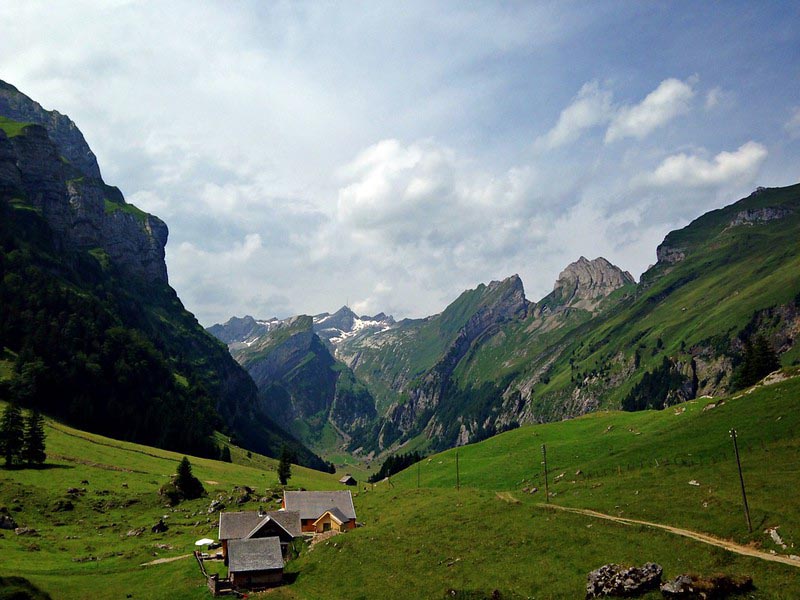
There are plenty of reasons to go to Switzerland . You’ve heard of the breathtaking views. You’re familiar with the taste of Swiss chocolate. You’ve longed for their endless selection of cheese. And you’re just about dying to see the Alps up close. You’ve reached the point where you’re already subconsciously packing your bags .
Wondering whether your trekking shoes still fit you, how much weight you might gain once you give in to your chocolate cravings or whether you need to bring a German, French or Italian dictionary.
If only it wasn’t for that persistent voice at the back of your head. You know, the one that’s keeping you awake at night with a million questions. Read more: 19 Beautiful Places to Visit in Switzerland
- How are you supposed to make it through a single day in Switzerland without robbing a bank?
- Are you going to crawl up in a cardboard box and sleep in a stranger’s backyard just to save money?
- Are you happy to live off instant noodles as you did during that trip to Australia ?
- Do you seriously believe there’s anything free to do in Switzerland?
- What if the emptiness in your savings account forces you to come home after a few days?
The list goes on. But before you let this situation get out of hand, do yourself a favour.
Shut that voice up.
Because first of all, nobody’s going to sleep in a cardboard box. And for the record, robbing a bank is out of question, too. Never mind those instant noodles, either.
Believe it or not, but simple and legal ways to save money in Switzerland do exist. And here are 10 ways to make your money last longer in Switzerland.
1. Use free public transport
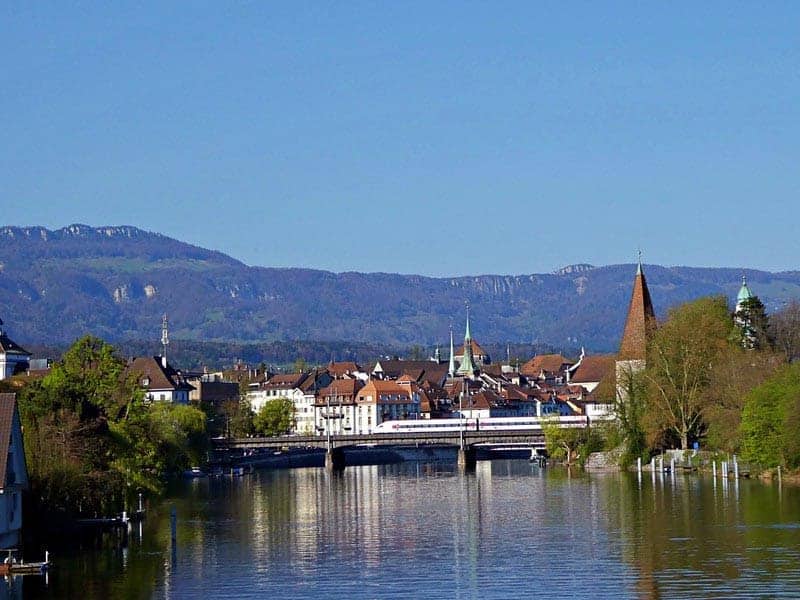
If you’re staying in Bern, Lucerne, Basel , Geneva or Lausanne, you get to use local public transport for free.
Your accommodation provides you with a ticket that’s valid for the time of your stay.
The Canton of Ticino extended this concept and recently introduced what I refer to as the travel-jackpot.
Every visitor spending at least one night in the Canton receives an all-inclusive ticket.
We’re talking about a free ticket here that includes buses and trains as well as a discount for cable cars, boats and selected activities.
More and more cities seem to be joining this concept.
So wherever you’re parked for the night, make sure you hit up your receptionist for potential freebies.
Check out our best Switzerland pictures .
2. Don’t buy a travel pass

Don’t buy a travel pass, at least not until you know your options.
Travel passes can be amazing value for money if you’re going to use public transport. But they don’t always make sense.
To avoid wasting your funds on something you don’t need, set aside some time to do your research.
In order to pick your best match when buying a travel pass, try to answer the following questions as precisely as you can:
- Where exactly do you want to go? What places do you want to see?
- Are you going to cover long distances or mostly stay in the same area?
- How frequently are you going to use public transport? Every day? Every second day? Only once or twice during your whole stay?
- Apart from Switzerland, are you travelling to any other European countries?
Once you have those answers, start digging.
Figure out whether buying tickets as you go, getting a Half Fare Card, an Interrail/Eurail Pass, a Swiss Travel Pass or Supersaver tickets work out cheapest for you.
3. Grab a (free) bike
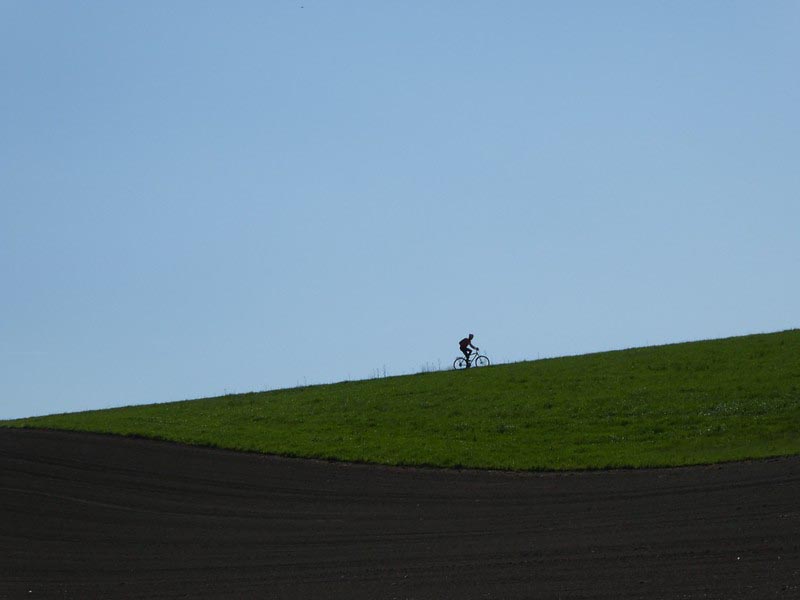
If you’re going to Zurich , Bern, Geneva, Neuchâtel, Zug or the Canton of Valais, you’re in for a treat. Those places offer free bikes.
Some for a few hours, some for a whole day and some even longer.
Bring along your ID and 20 CHF for the deposit.
Other cities rent out bikes as well but not for free.
Depending on your itinerary, it might still work out cheaper than paying for public transport, though.
4. Take matters into your own hands
Unless you desperately want to, you don’t need to book a tour to explore Switzerland.
With public transport being as efficient and plentiful as it is, you’ll be hard-pressed to find a place that isn’t accessible by bus, train or boat.
Buses and trains run frequently so don’t worry about getting stuck anywhere.
However, if you head out to more isolated places, double-check the timetable just to be on the safe side.
5. Put your connections to use
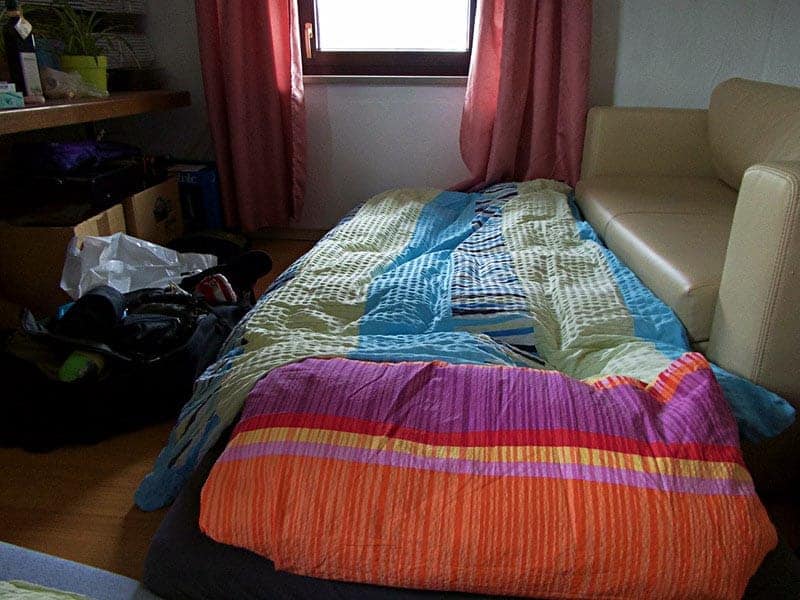
Nothing eases the pressure on a backpacker’s wallet like staying with a friend does.
Saving 30 – 40 CHF on accommodation each night pretty much pays for an all-inclusive Swiss Travel Pass.
And with Switzerland being this small, you can take day trips to almost every corner of the country.
If you don’t have anyone you can contact, try Couchsurfing instead. It’s more common than you’d expect and it’s a fantastic way to get in touch with locals.
6. Sleep above the cows
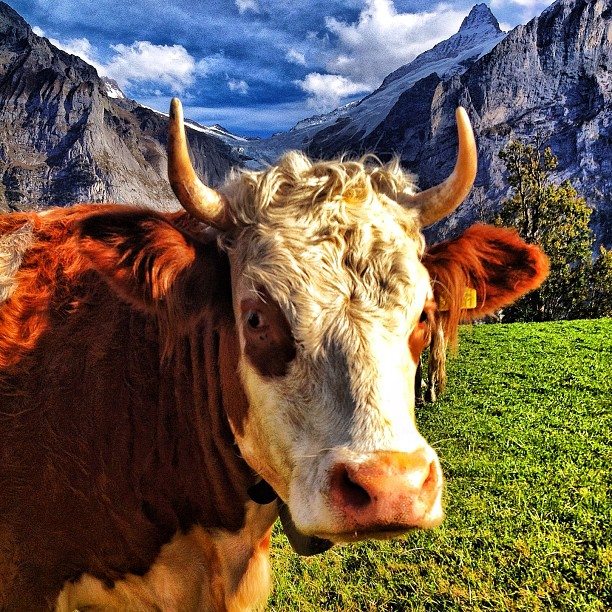
Believe it or not, but this exists. Provided you’re not allergic to hay or straw, sleeping on straw sets you up for a night out of the ordinary.
Especially if you’re after an adventure and travelling with a sleeping bag.
Agrotourismus is a good place to look for Swiss holiday farms – Prices range between 25 – 35 CHF per person, which is roughly the same or even less than a hostel.
With breakfast being included, this is well worth taking a detour out of the city.
By the way, some places also let you set up your own tent for a small fee.
7. Embrace your inner chef

You’ve guessed it. Eating out is expensive, too.
Dinner at a restaurant costs at least 20 – 30 CHF. You might get away with 15 – 20 CHF if you catch a bargain.
Cooking your own food is way more affordable. Depending on how much of a gourmet your are, you can get by with 60 – 80 CHF a week for groceries.
Possibly even cheaper if you cut some edges. But I’d budget at least 50 CHF.
Supermarkets like Migros, Coop, Denner, Aldi and Lidl are your best friends here.
With Aldi and Lidl being the cheapest. Read more 15 Swiss Foods to try in Switzerland or at Home
8. Buy old bread
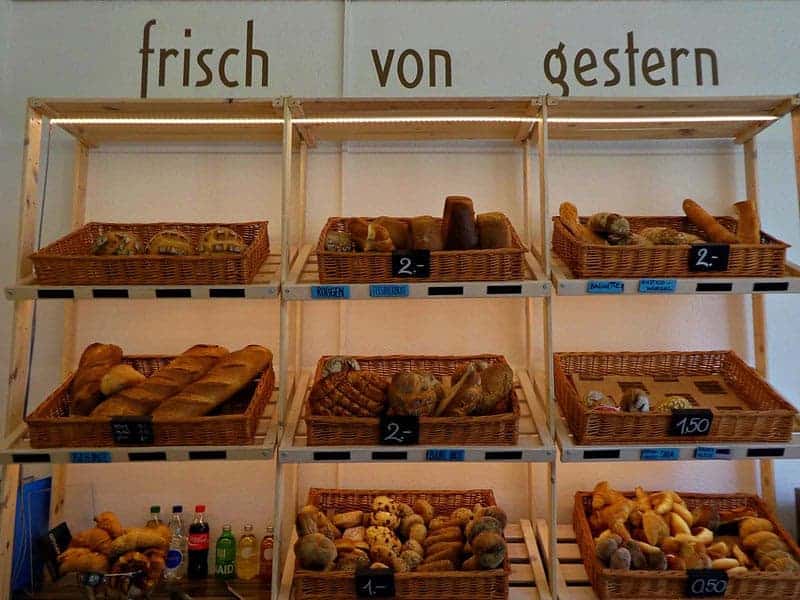
This one‘s way better than it sounds. I promise.
A new concept called Ässbar has taken root in Switzerland.
In order to fight food waste, these guys collect whatever bakeries couldn’t sell during the day and offer it for half the price the next day.
As a result, you can get pastries, bread rolls, sandwiches and sausage rolls at a massive discount.
You can find Ässbar stores in St. Gallen, Winterthur, Zurich, Bern, Fribourg and Basel.
And since their concept is so popular, they’re looking to expand to other cities as we speak.
- Find out how you can stretch your travel cash by downloading her free guide, 10 ways to save money on food in Switzerland .
9. Go crazy over free snacks

Everything free is worth its weight in gold.
And farmer’s markets are an excellent place to grab free samples every now and then.
While you probably won’t get a whole meal out of this, tasting free crackers, olives, bread, the occasional piece of cheese or cookie is the perfect way to get over those mid-morning or afternoon cravings.
Chocolate factories also hand out samples but since they make you pay entrance, I don’t like to count those.
However, the Kambly biscuit factory in Trubschachen lets you dig in until you explode. At no extra cost.
Trust me, you won’t make it through their whole selection in one go. Even if you arrive on an empty stomach.
Challenge accepted?
See some of the best Switzerland Photos on Instagram .
10. Stick with free activities
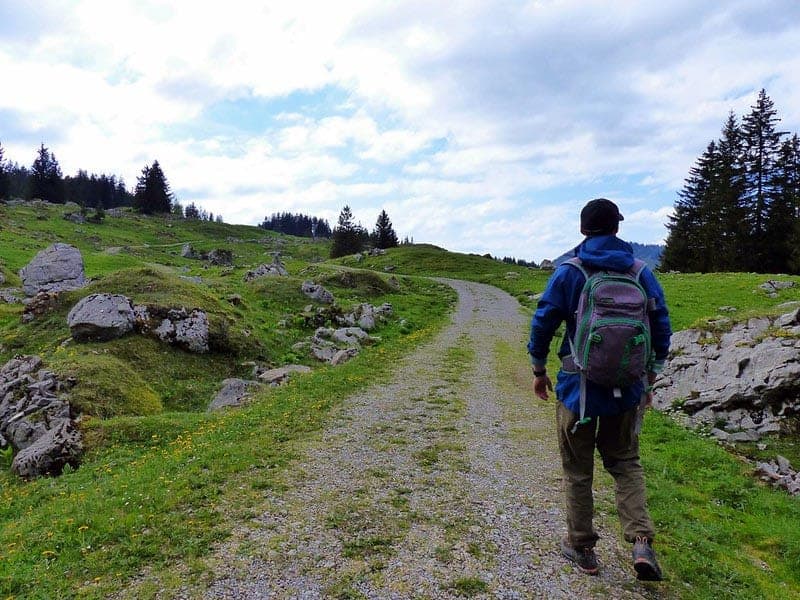
Nothing in life is free. Or is it?
You’d be surprised. If you pay attention and know where to look, you can find plenty of free things to do. Check out The 12 Best Hikes in Switzerland
Free Things to do in Switzerland
- Join a free walking tour in different cities across the country.
- Spend some quality time with the bears in Bern – figuratively speaking.
- Visit a free wildlife park in Zurich, Aarau, Winterthur, St. Gallen, Interlaken and many other places.
- Check out old towns, churches, and free museums.
- Visit the Appenzeller cheese factory in Stein and stuff your face with free samples.
- Join a tour of the Bundeshaus (House of Parliament) in Bern.
- Take a stroll through botanical gardens and parks.
- Head out to Schaffhausen and visit the Rhine Falls, Europe’s largest waterfalls.
- Take a refreshing dip in a lake.
- Hike until your feet fall off. After all, that’s what Switzerland is famous for.
Budget Switzerland Travel – The only thing left
Now that you know how you can stretch your money while you’re in Switzerland, let’s see how that know-it-all at the back of your head is doing.
Is it still leading you on to rob a bank, sleep in a cardboard box or live off instant noodles? Or has it finally decided to shut up?
If it’s still being reluctant, don’t be too upset with it. After all, nothing you do will ever turn your trip to Switzerland into a low-cost holiday.
But with these 10 tips, hitting the Alps without blowing your retirement savings has just become a whole lot more realistic.
The only thing left for you to do is this. Go to your drawer, dig out your bucket list and scribble those eleven letters at the very top of it.
You know you want to.
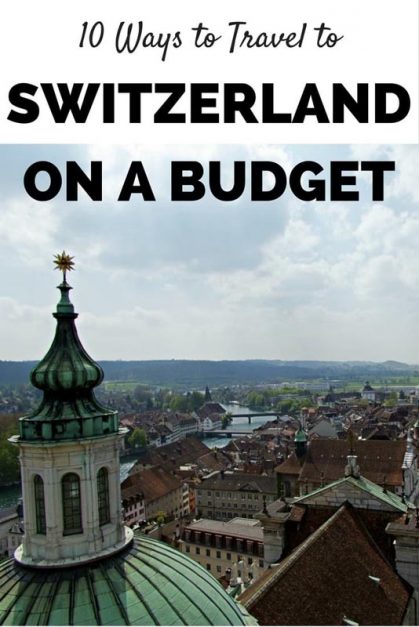
- The Ultimate One-Week Switzerland Itinerary
- The Ultimate Switzerland Road Trip Itinerary
- Our best Switzerland Pictures
- Things to do in Grindelwald, Switzerland – Complete 4 Day Itinerary
- The Perfect 3 Days in Zurich, Switzerland
- 24 Fantastic Things to do in Basel, Switzerland
Check out these money saving tips
- How to Save Money for Travel
- How to Travel on a Budget – Our Top Cheap Travel Tips
- Our Best Travel Tips – From 20 Years of Traveling the World
- How to Travel Around the World – The Ultimate Travel Resource
Travel Planning Resources
Looking to book your next trip? Why not use these resources that are tried and tested by yours truly.
Flights: Start planning your trip by finding the best flight deals on Skyscanner
Book your Hotel: Find the best prices on hotels with these two providers. If you are located in Europe use Booking.com and if you are anywhere else use TripAdvisor
Find Apartment Rentals: You will find the cheapest prices on apartment rentals with VRBO .
Travel Insurance: Don't leave home without it. Here is what we recommend:
- Allianz - Occasional Travelers.
- Medjet - Global air medical transport and travel security.
Need more help planning your trip? Make sure to check out our Resources Page where we highlight all the great companies that we trust when we are traveling.
You May Also Like
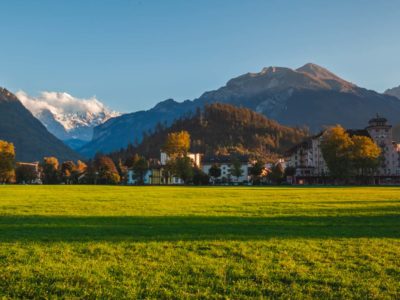
28 Best Things to Do in Interlaken in 2024
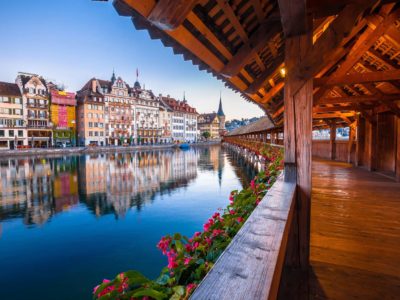
18 Best Things To Do In Lucerne In 2024
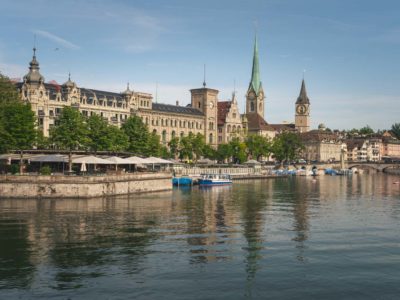
Where to Stay in Zurich: Ultimate Guide for First time Visitors
About Seraina Zellweger
Seraina Zellweger is a devoted budget traveller who’s been around the world and back. As a native Swiss, she’s made it her mission to give fellow backpackers tips on how to visit Switzerland on a shoestring.In her latest project, she's created a series of guides with itineraries for Switzerland , ranging from 2 to 14* days. For more information, Follow Seraina at LostInSwitzerland / Facebook / Twitter
Join thousands of others who get our monthly updates!
Leave a comment cancel reply.
Save my name, email, and website in this browser for the next time I comment.
41 thoughts on “10 Simple Ways to Travel Switzerland on a Budget”
My wife and myself is trying to visit swzertland in the month of July 23 please give some details
Thank you for this article! It eased a lot of my concerns for my upcoming trip to Switzerland. I am wondering about the public transportation… Will the free transportation take us from Geneva to Zurich? Or is it just free public transportation within the city you are staying in? Thank you again for all of the tips. My husband and I are feeling more confident in making this Switzerland trip an affordable and enjoyable experience!
Great tips on traveling to Switzerland on a budget. It is unbelievable how expensive everything is there, especially when traveling as a family. I will refer back to your post again before our next trip to this amazing country!
Zurich is one of the most beautiful capitals in Europe.Thanks for sharing this amazing info
Amazing read. I’ve traveled around Switzerland on a tight budget just for a week. It was the first time I’ve used Couchsurfing and it was an amazing time! My host was a very friendly Swiss guy who was extremely interested in learning about my culture and traveling experiences. Also, as you’ve mentioned, using free public transport saves a lot as well as biking around the cities.
i was planning for a family trip there, and luckily found this amazing informational guide… thanks a lot as this guide will help me for my family travel trip… briefly explained travel guide…!!
I’ve been traveling almost all cheaper countries… scheduling how to set on foot on the rather expensive countries like- Switzerland, Norway, Sweden, Iceland etc.!
Switzerland is really awesome place for roam. You share the information is really awesome. Very helpful information on this blog. I am glad to find it. Thanks!
If you could travel through only one European country, which might you choose? Italy? France? Germany? How about a taste of three in one? That can only mean Switzerland! You’ll find Switzerland a chocolate box bursting with unexpected flavours. 🙂
This post made us laugh, sleeping above cows sounds like an adventure for sure! You are right on point with avoiding Switzerland due to the high cost, but maybe now we will finally add it to our bucket list. We accept the challenge of eating all the free snacks we can get while there!
I am excited that you are accepting the challenge to travel there on a budget. Let us know how it goes !
It is very very Attractive Post. Some great travel tips for travel in Switzerland green And clean city.
Budget is the main concern not for all but for many of us. Cooking own food is the best idea to save money and also to maintain health.You have shared very useful budget friendly ideas here. I really like it.
Great post I’ve always been intimidated to visit Switzerland, but I was little worried about the cost of accomodation. I’m very curious about Agrotourismus, I’ve never heard of it and will definitely check it out. I love to hike so i’m covered for activities. Cheers! Millie
Awesome post Seraina. My first visit on your post but not last, will follow your next post! You obviously spent considerable effort and time to carefully document this post for our benefit. I was in Switzerland last year and spent average budget (My thinking before reading this post). But after reading your post I can say, “Yes” I could save 50% of my budget amount.
I absolutely loved Switzerland. The FRESH AIR is incomparable. And yes to Tip#1!! Our hotel was nice enough to inform us of this before we spent any money on public transport in Montreux. Oh and I remember getting a free ticket to the city from the airport in Geneva too. What I would give to live there. Great post, Seriana!
Izy thank you for commenting because transportation is my biggest concern for my trip to Switzerland in September. I am wondering if the free transportation will take us from Geneva to Zurich? Or is it just free public transportation within the city you are staying in?
These are just stunning! Switzerland is one of my favorite places to travel. Wondering when I get a chance to visit..
I love this! Switzerland has been on mine and my husband’s travel wishlist for a while! It’s great to know about that free public transportation and the free bikes! It sounds like it would be best to spend more time in cities that offer these perks!
I love the fact you like my country.You are from which country?
I’m planning a trip to Switzerland and your post is so handy and packed with good tips! Will definitely put some into good use.
That’s a very good idea Cam. I’m sure you wouldn’t regret it 🙂 Enjoy your travels in Europe.
Very greats article . Thank for sharing . I loved it
I might just include Switzerland in my tour of Europe after all. Thanks for all these amazing tips!
very beautiful places to visit. we haven’t finished exploring the world
Thank you so much Donna. I hope one day I get to return the couchsurfing favour by hosting you and Ted in Switzerland. There are so many things I’d love to show you.
So good to hear from you Laio. And yes, it’s been ages since Bolivia. Such good times out in the Salar de Uyuni. I really hope to see you in Switzerland one day. And you’re definitely welcome to stay with me whenever you’re here. The couch is waiting for you 🙂 Take care
Excellent blog. Great tips and information. We may have to try this trip after all. Well done.
We love your blog. Lots of great tips and information. I think that Ted and I may have to try this sometime. Well done.
Hey Seraina my Dear Friend! So many days since Bolivia’s Travel… times fly! Switzerland seems to be an amazing place… I probably will visit some day! I´ve no doubt that I will “put my connections to use” and I hope you enjoy to give a shelter for me there! This blog is awesome and very helpful! Thanks for it! Kisses
Hey Rosemary thanks for your comment. I’m glad you like Switzerland and think it’s worth a visit. I totally agree with you that coffee and cake are expensive. It’s a shame. Hopefully this won’t keep you from coming back one day 🙂
Switzerland is a really great place – all the trains run on time and are easy to work out. They are clean and comfortable. We agree that you can use public transport to travel around – it’s really good and convenient.
There are lots of things which are good value in Switzerland but we find quick meals like coffee and a cake or something expensive.
It’s worth going to Switzerland though as you’ll have a lot of fun.
Such a wonderful post by Seraina! Switzerland is a dream for me and this one just takes me so many steps closer. I especially agree with point 4 and 10 – nothing like exploring a new place on our own, there’s so much joy and it’s so cost effective too!
Thank you for your comment Arti. I’m glad my post got you a little closer to reaching your dream. Hopefully you’ll make it to Switzerland soon.
Some great travel tips in this post to stretch your time in Switzerland. I love Switzerland, it’s so green, it’s so clean and it’s so stunning. My husband and I decided to camp in Switzerland, which meant we could save a lot on accommodation and we could cook our own meals. We just loved it (it was just a bit cold to sleep in a tent) 🙂
Hi Sabine, thanks for your comment. Yes, Switzerland is pretty green and clean, isn’t it. Camping is definitely a great way to save some money on accommodation. Although you’re right about the chilly nights. I hope you had a good sleeping bag and didn’t catch a cold 🙂
Grabbing a bike and exploring is my kind of thing. And I loved the concept called Ässbar. I hope they’ll spread all over the world….
Hi Seraina,
LOL on old bread. That is all I buy 😉 I’d be saving Swiss scratch right off the bat. Ditto on the free biking. I recall years ago biking all over Hoi An in Vietnam for 2 months. I got in tip top shape and saved a small fortune in taxi fare. Thanks for sharing 🙂
Haha there’s nothing like old bread Ryan is there. I think you’d be saving heaps in Switzerland ? I love going to that place. Wow biking in Vietnam sounds exciting. And it’s definitely a great way to get in shape for free too, isn’t it.
Very Superb Article. Thanks a lot for sharing this information
Thanks for your comment Jay. And you’re welcome. Glad you liked the article.

18 Do’s And Don’ts To Visiting Switzerland On A Budget
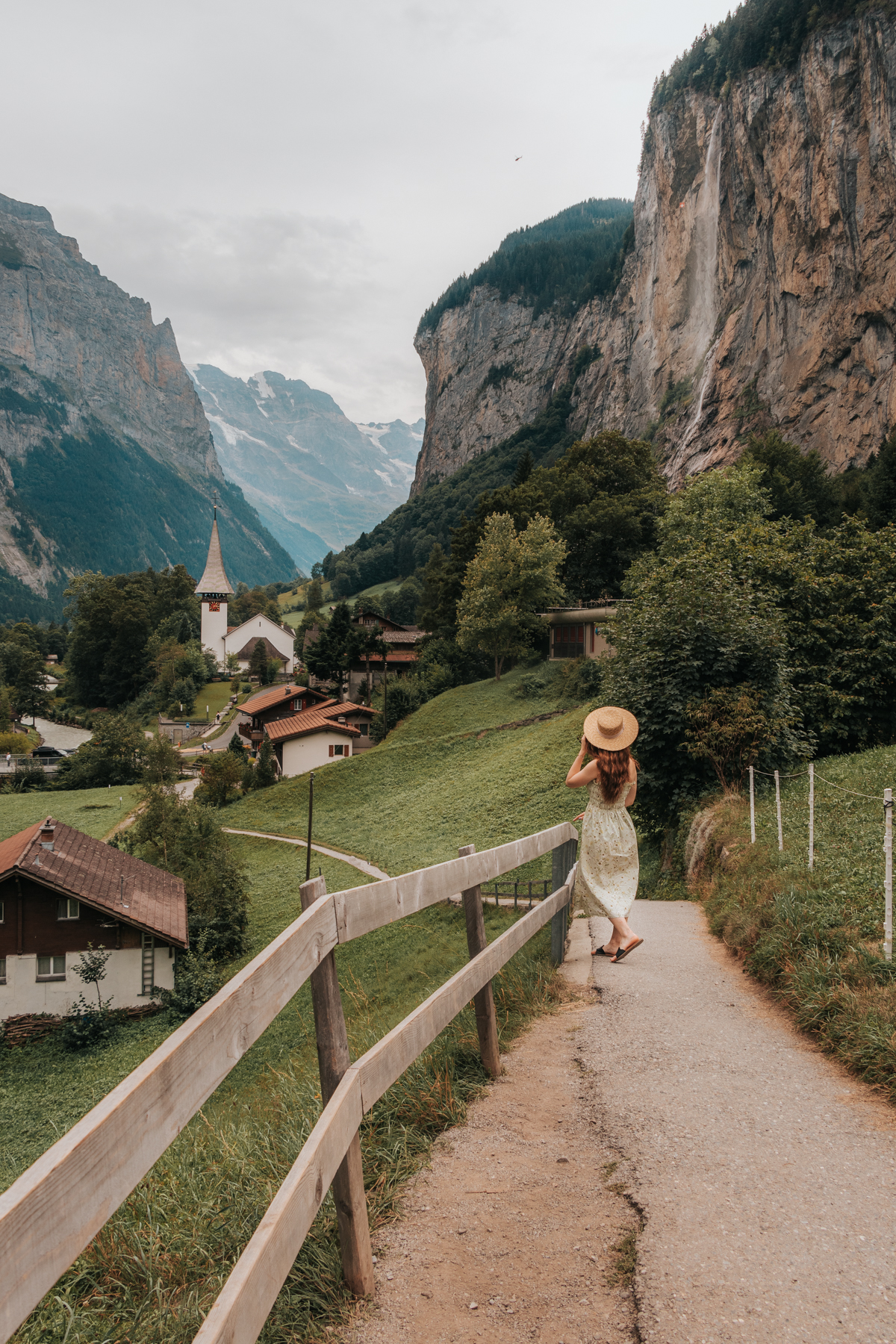
Last Updated on January 17, 2024 by Michela
Jaw-dropping peaks, pristine green fields and wooden cabins, turquoise-blue lakes – Switzerland is easily one of the most picture-perfect destinations in Europe. It also happens to be one of the most expensive . While many scrape by backpacking the Swiss Alps, the price tags of food, transportation, accommodation and experiences make planning the average weekend getaway or extended vacation a major hit to the wallet. But you can still make your dream trip a reality while saving money – use these tips to do Switzerland on a budget .
Some of these links are affiliate links. This means if you make a purchase through that link, I receive a small commission at no extra cost to you. Read my full disclosure !
Currency in Switzerland
The currency is used in Switzerland are Swiss Francs (CHF). As of August 2022, 1 CHF equals $1.05 USD. And while the exchange rate is fairly even, the cost of living in Switzerland is completely different to most areas in the US!
To put into perspective just how much the prices can differ in Switzerland, a Big Mac and a 6-count chicken nugget meal from McDonald’s cost me 27 CHF in Switzerland. In the US, it would cost me $10!
Tips to Visit Switzerland on a Budget
Do grocery shop.
One of the easiest ways to save money in Switzerland is to live like a local! Skip restaurants and head to the grocery store to stock up on snacks, pre-made lunch goodies, and even do some normal grocery shopping if you have the means to cook at your accommodation.
While the Swiss lifestyle isn’t cheap and the prices of some things will still make you do a double take, you will still be able to find much more affordable food options here than at any restaurant or take away in the area.
Don’t Eat Out Every Meal
You’re on your dream trip to Switzerland, so it is impossible to tell you to not try the local food or have a nice meal every now and again! But if saving money is your biggest worry, then you should try to avoid eating out for every meal and instead have a plan to picnic or cook with your grocery store finds.
Do Take Advantage of Grocery Store Restaurants
My favorite Switzerland budget travel secret is… the grocery store restaurants! I discovered at least two of the major grocery store chains in Switzerland, Migros and Coop, also have their own IKEA-esque eating areas. It may sound strange but they are a budget traveler’s dream!
Some are buffet-style where you can stack your plate with as much food as you’d like for a fixed price, while others are focused on meal deals and a-la-carte items. I can guarantee you will get some of the best deals on eating out here. If you already know the stops on your itinerary, check ahead of time if these grocery stores are present and if they have a restaurant!
Do Book Hotels Early
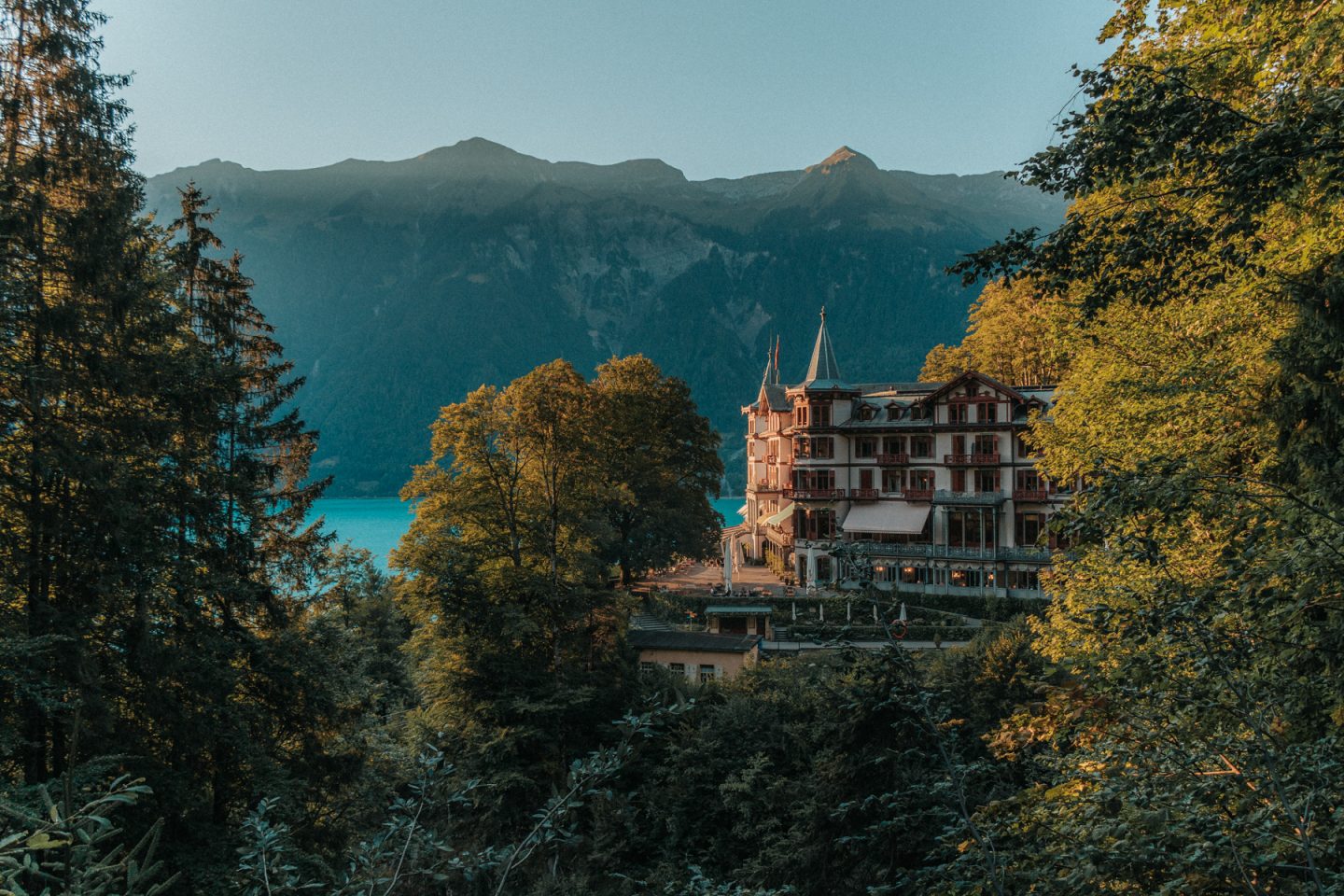
Some say that you can get crazy last-minute deals if you wait to book your accommodation immediately before your trip days, but I have not found that to be the case in Switzerland.
It may just be because of traveling during peak season, but once accommodation is getting booked up, prices rarely go down. Instead, they increase! Your only shot at testing out this method and having it work is to try a service like HotelTonight that collects discounts on lasts-minute hotels.
Good to know : You will likely have to pay a city tax at the end of your hotel visit. The amount can vary depending on the town. As an example, in Interlaken, the tax was 2.50 CHF per person/per night.
Don’t Travel to Switzerland During High Season
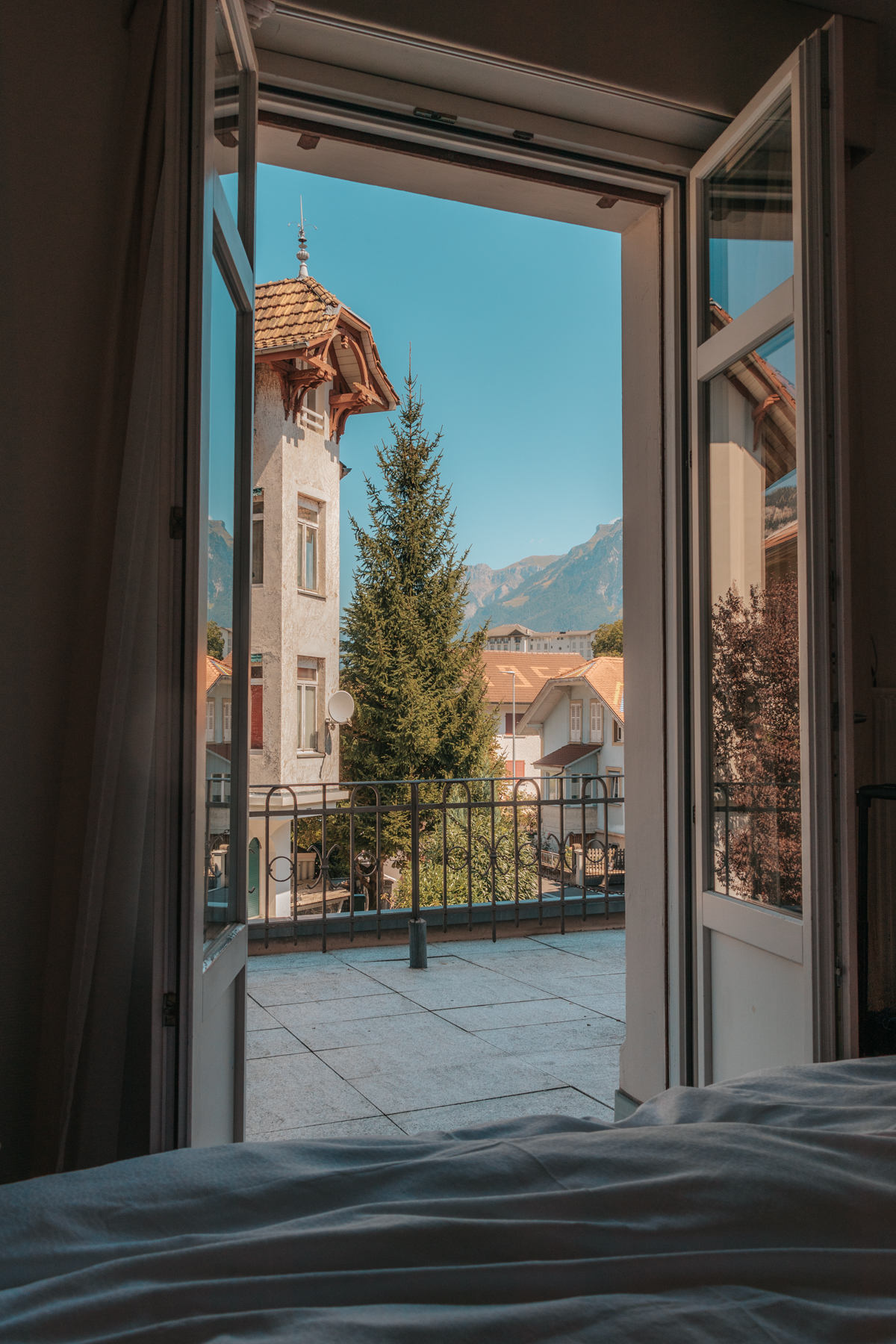
I know everybody says it, but the period in which you are traveling through Switzerland can have a huge effect on accommodation prices.
Switzerland’s peak seasons are between June-August and December-February. The most budget-friendly time to visit Switzerland is from March-April and October-November.
Pro Tip : If you are looking for Switzerland accommodation during one of the peak season periods, try to book a hotel that allows you Free Cancellation up to a certain point. Then you can frequently check back to see if any new, more affordable properties are available due to cancellations.
Do Utilize Day Trips to Save Money
Staying for a longer time in one place can often be more cost-saving than switching hotels frequently. Rates per night tend to get better the longer you are staying at a hotel. Lots of Airbnbs also give extended-stay discounts for stays over a week long.
With this travel tip, you should plan your itinerary around day trips instead of moving from place to place. Planning excursions to cities, like a day trip to Lucerne or one day in Zurich , is very easy because of the well-connected public transport network.
And to get to more remote areas like Jungfrau, for example, you can also check out day trip tours. Weigh the cost between traveling with a tour that includes the activity and transportation and DIYing your day trip to find out what’s the best deal for you.
Do Get Breakfast Included at Your Hotel
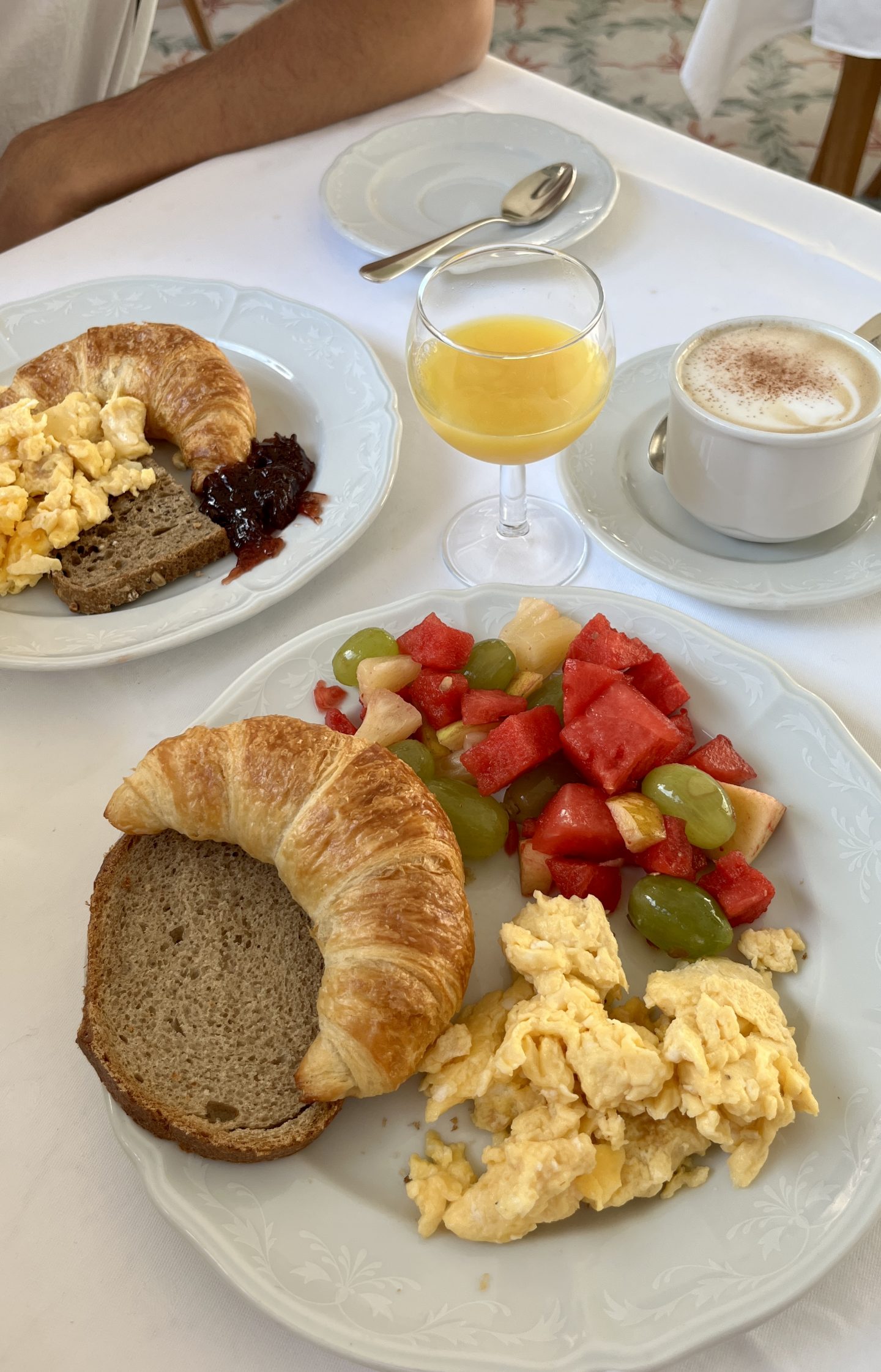
It may seem counterintuitive to spend more booking your accommodation to get breakfast included, but if you do the calculations, you will see that the price difference is usually a savings rather than a cost.
As a personal example, I spent two nights in Interlaken with my boyfriend and paid an extra 20 CHF for the two of us to have breakfast included. Just a cappuccino in Interlaken cost 5 CHF, so for the same price per person we had a full buffet breakfast each day.
Don’t Pay for Water

The beauty of the Swiss Alps? The super fresh mountain water! Many cities and rural areas are full of fountains distributing the water so that you can fill up for free!
Don’t forget to pack your favorite travel water bottle .
Do Stay at a Hostel or Campground
I know they sound like they are reserved solely for backpackers and road trippers, but there are actually options to make these accommodations adaptable to any budget-conscious traveler’s trip style!
Hostels are known to be some of the cheapest accommodation around. But you don’t need to opt for the cheapest of the cheap and board with 10 other people. Many also offer private rooms like any other hotel for a higher price, but are still more budget-friendly than standard hotels.
And did you know that even if you’re not road tripping through Switzerland with your own motorhome, you could still take advantage of an inexpensive campground?
Tons of campgrounds have their own bungalows ! These tiny houses are perfect for cheap stays. Plus, they will likely have a kitchen, which makes cooking and staying on a budget with food even easier!
Don’t Road Trip Switzerland Without Knowing These Expenses
Driving in Switzerland is a spectacular way to see the country’s incredible landscapes. It also gives you tons of flexibility in your itinerary.
But there are some fixed expenses you should note before hopping on the road. Switzerland’s toll system operates with a vignette , a small sticker that allows you access to all the highways in Switzerland. This vignette is valid for the calendar year up to January 31st of the following year, but costs 40 CHF.
Parking is another expense that can get out of control in major cities. Parking in Zurich, in particular, is very expensive (around 5-6 CHF per hour in parking garages).
And it’s also important to know the road rules in Switzerland, as fines are very high. Throughout Switzerland, there are speed cameras that you may not notice. Small towns often have very slow speed limits but it’s important not to exceed them to avoid having a fine show up in your mail weeks later due to these cameras. For more road rules, check out my guide to Driving in Switzerland .
Do Take Advantage of City Guest Cards
It pays off to do research and planning to truly do Switzerland on a budget. Luckily, Switzerland has a decent number of initiatives to promote tourism that also result in you being able to do more while paying less!
One useful hack you should look out for is city guest cards . You’ll have to look up if your specific destination offers an incentive like this, but guest cards are usually offered to travelers staying in accommodation in that city.
For example, the Interlaken guest card is available to anyone staying in accommodation in the town of Interlaken and offers discounts on stores and attractions, but most importantly, allows you to ride the public transportation for free in and around the city!
Lots of other cities do this too: Lucerne, Bern, Geneva, Basel. The Canton of Ticino even has a Ticino ticket that lets you use free public transport to explore the entire region!
Pro Tip : When deciding where to stay during your trip to Switzerland, you should also consider staying outside of major tourist areas and cities, where you’ll likely find more budget-friendly rates. I recommend during your accommodation search weighing the costs between savings on transportation and activities with a city card (if your destination has one) and staying in more remote areas.
Do Consider Buying Travel Passes
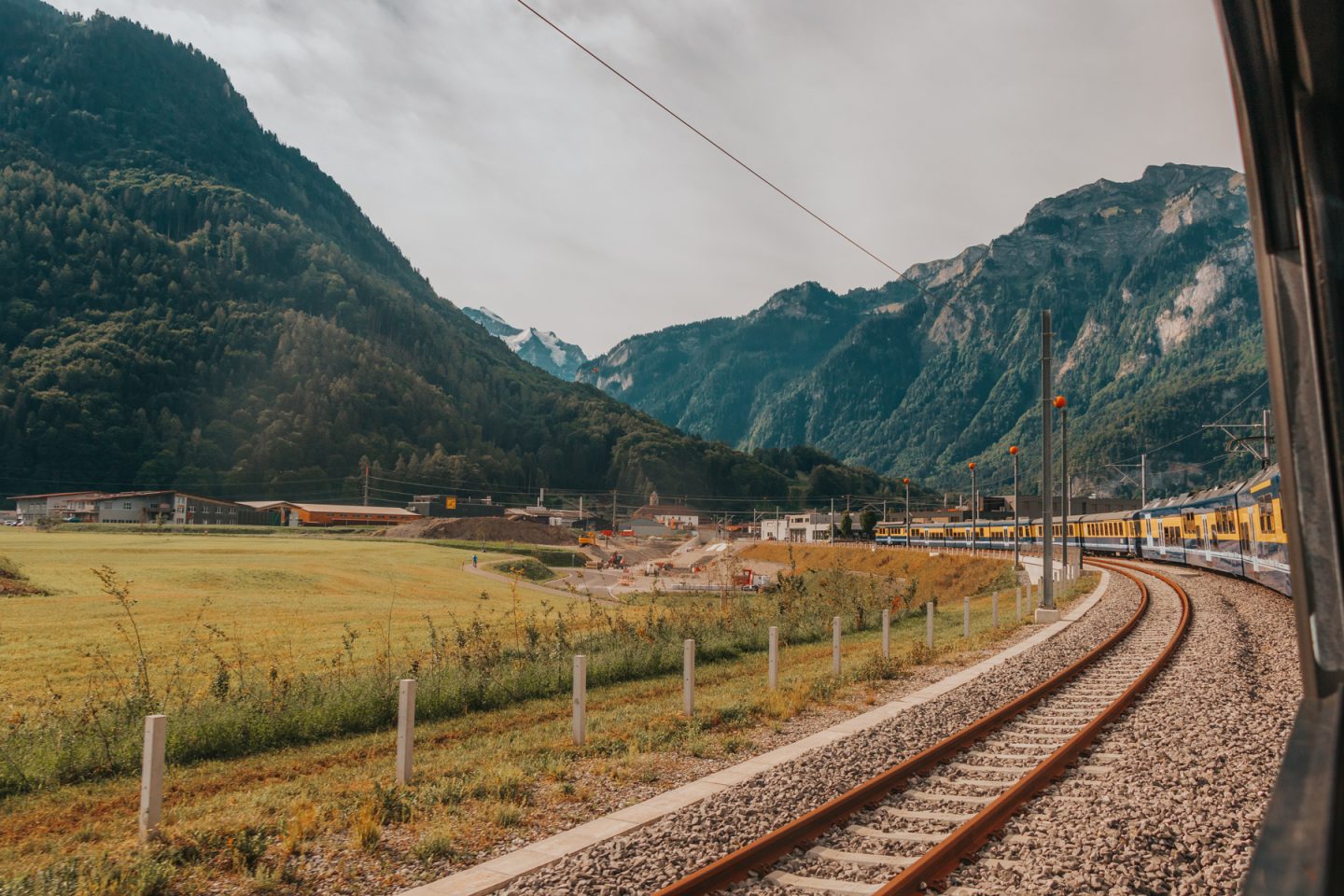
If you are planning to get around Switzerland on a budget using public transportation, you should weigh the cost of buying one of the many Swiss travel passes against paying for tickets individually to every destination on your itinerary.
The Swiss travel passes are expensive, so it is best to plan out your itinerary in as much detail as you can to understand if the price tag of the travel pass will truly save you money. Some of the travel passes offered include the Swiss Travel Pass , which comes in packages of 3, 4, 6, 8, and 15 days of unlimited travel on the public transportation network, and the Swiss Half Fare Card , which gives you unlimited 50% discounts on public transportation tickets for a year.
Pro Tip: On the Swiss Travel Pass website, use the Find The Right Pass section to start getting an idea if the pass makes sense for your itinerary and budget.
Don’t Be Too Spontaneous
Being spontaneous on vacation can lead to some unexpected amazing memories! Or, it can end up being a costly mistake.
Budget-breaker storytime : My boyfriend and I hiked from Iseltwald to Giessbach waterfalls, about an hour and a half. Well, after a strenuous, long uphill climb to these falls, we figured let’s take the bus back. We had no internet and found out the last bus passed hours ago. It was now 8 pm, the sun was due to set in 45 minutes, and our accommodation was an almost 2-hour walk and then a 15-minute bus ride away. In short, we ended up having to walk to the next town over with a train station (another hour and a half journey) and spend 20 CHF to take a train back to Interlaken.
Moral of the story? Have a plan! You don’t have to have every detail organized but, at least before you act on spontaneity, take a minute to consider what factors could have a significant impact on your budget and if you are okay with that.
Do Have a Phone Plan
We found ourselves in the previously told sticky situation mostly because we had no roaming in Switzerland on our phones, meaning we could only access the Internet via WiFi. Switzerland is not included in EU roaming, meaning using data is extremely costly.
You could either try to buy a local SIM card, rely on WiFi like us, or pay the international rate through your domestic phone plan. Buying a local SIM card is typically the perfect balance between cheap and convenient, whereas WiFi is only cheap, and paying for your international plan is only convenient.
Pro Tip: Download Offline Maps using Google Maps so that if worse comes to worst, you have a map on hand to orient yourself and get around. Also, be sure to pack a portable charger with you, especially if you plan on spending long days out away from your accommodation, like hiking.
Don’t Miss Out on Student Discounts
Youth and student discounts on travel in Switzerland can help you save on transportation and activities!
For example, young travelers from 16-24 can get a discount on the Swiss Travel Pass.
These discounts are usually found in the “Reduced” section of ticket charts. Not every activity or transport has them, but it is always worth checking ahead of time to see if you can take advantage of them and how (if you need to present a student ID, for example.)
Do Exchange Currency (But don’t do it at local kiosks!)
Most places in Switzerland accept debit and credit cards. However, one of the reasons you might prefer to pay in cash is because some restaurants and shops may use a conversion rate that is highly unfavorable.
But if you are going to exchange currency, you will almost always find the best rates at banks and post offices. You will find less favorable exchange rates at kiosks located in your destination (it literally just looks like a tourist trap) or at airports.
Check out more budget travel tips relating to using ATMs abroad and exchanging currency while traveling .
Don’t Let The Language Fool You
Surprisingly, even in places known for tourism, you will not find that many things are translated from German – menus, signs, etc. This can make it difficult to understand what you’re paying for and if it’s worth the spend.
Unfortunately, there’s not much you can do about this other than hoping you can get a hold of someone who speaks English to help you out or have a translation app on hand.
Do Have Fun with Free Activities!
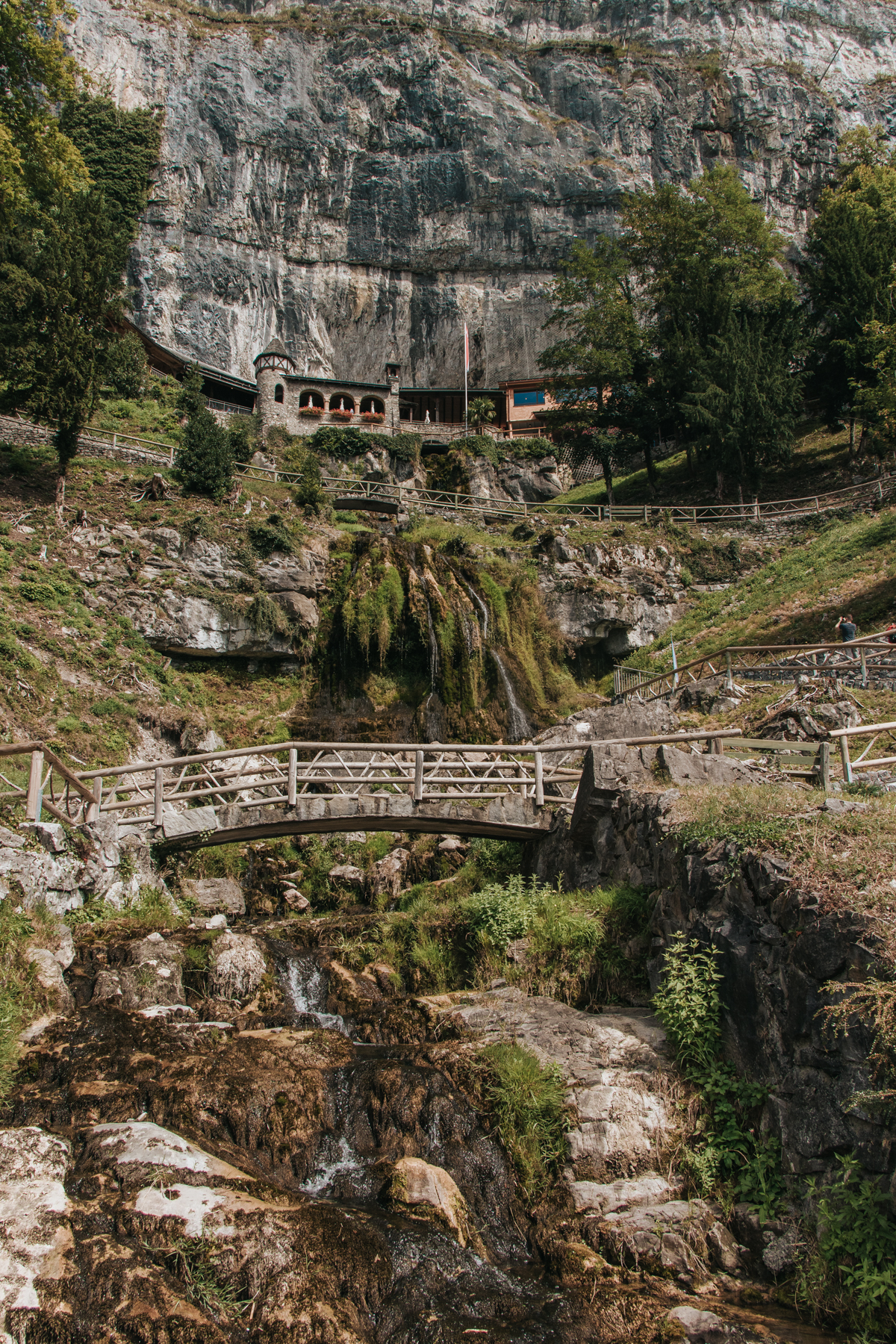
Unfortunately, lots of activities in Switzerland are expensive, both in and out of cities. But if you do some research before your trip, you’ll find that there’s also a decent number of free things to do to help curb costs and fill up your itinerary!
Switzerland Travel Budget Resources
We all know by now that planning a trip to Switzerland on a budget is no easy feat. It’s probably one of the hardest destinations in Europe. Here is a list of resources to help you stretch your dollar and understand what a realistic Switzerland trip budget looks like:
- BudgetYourTrip – This site gives you the average prices relating to different travel expenses in your selected destination. You can use it as a benchmark to see if you are getting a good deal on accommodation, food, and transportation.
- My Road Trip Budget Planner (& many other resources in The Travel Library!)
- SBB Offers – Current deals from the main train company in Switzerland.
Unfortunately, visiting Switzerland will never be “cheap” but the travel tips in this guide for doing Switzerland on a budget will at least help ease the expenses.
Let me know in a comment – what does your dream Switzerland itinerary look like?
Save these tips to Pinterest for later reference!

Michela is a travel writer and photographer living in northern Italy. She is passionate about helping people make the most of their travels by sharing advice gained from her personal experiences, off-the-beaten-path destinations and time-saving quick itineraries. Browse her top articles or have her help you plan your itinerary to your dream destination!
Find me on: Web | Instagram
You may also enjoy:
Saturnia hot springs: how to plan an epic visit to italy’s …, polignano a mare: why it’s worth visiting and the perfect one …, leave a reply cancel reply.
Your email address will not be published. Required fields are marked *
Save my name, email, and website in this browser for the next time I comment.
Website URL
Sign me up for the newsletter & access to resources from The Travel Library!
JOIN MY FACEBOOK GROUP
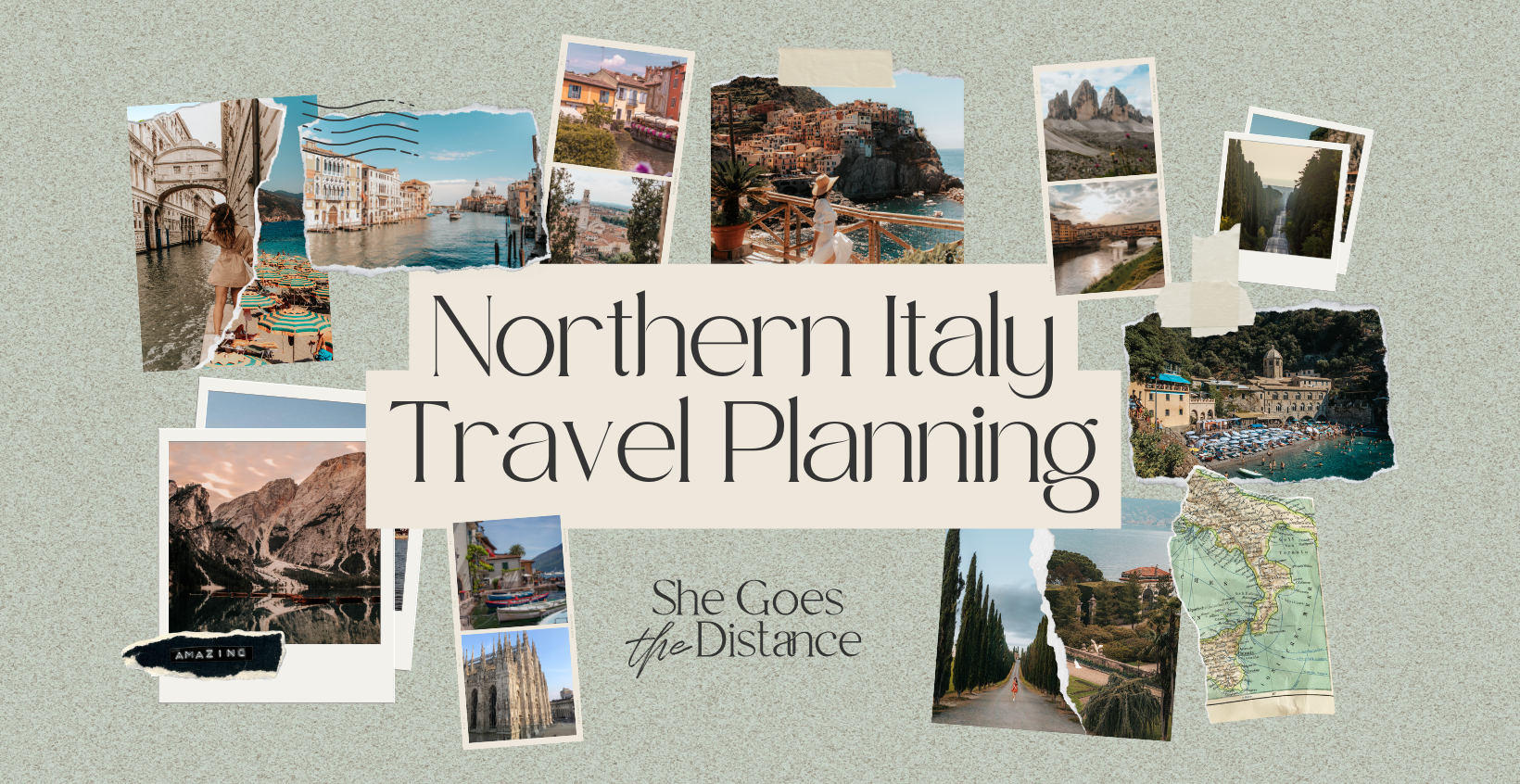
Check this out
- The Travel Library
- Privacy Policy
BUY ME A COFFEE
I love creating free resources for your travels and personally responding to your questions over chat and email.
Planning a trip to Italy?
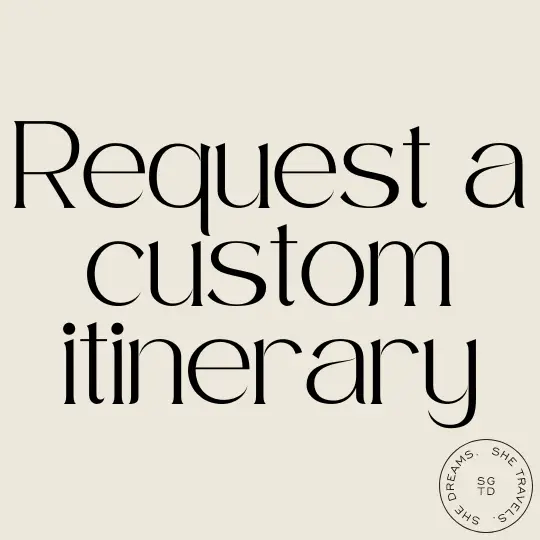
Looking for Something?
Switzerland on a budget: the best things in Schweiz are free

Apr 20, 2023 • 8 min read
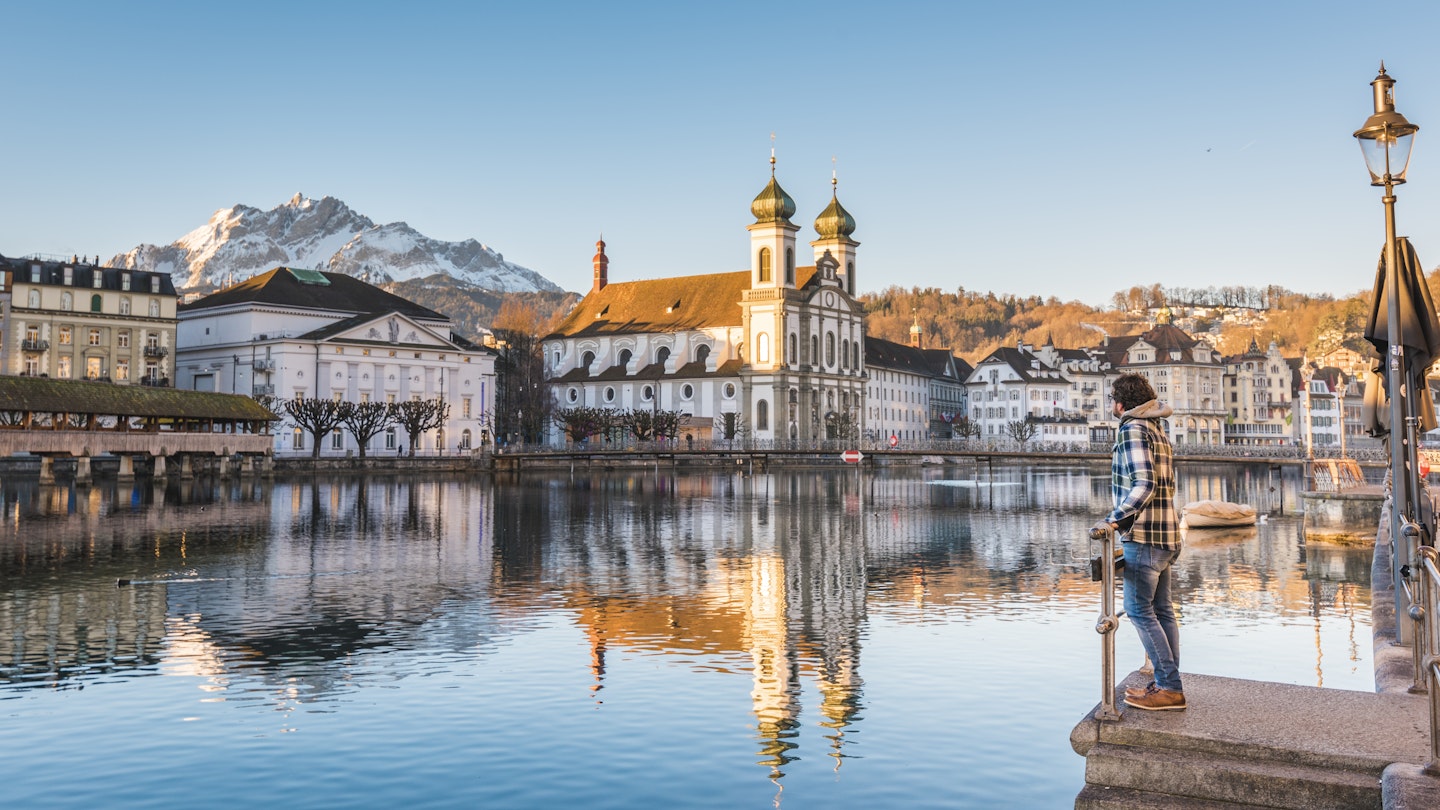
See the sights of cities like Lucerne on the cheap © Marco Bottigelli / Getty Images
Let’s face it, Switzerland doesn’t immediately spring to mind when you utter the words ‘cheap break’. This small alpine nation is known for being one of the priciest countries in Europe, with several of its cities regularly cited as among the world’s most expensive places to live.
But traveling within Switzerland on a modest budget is possible. If you plan carefully, make the most of available transport deals and prioritize the countryside over cities, this beautiful country is navigable by even the most frugal of travelers.
Get more bang for your buck on public transport
Switzerland’s famously efficient public transport system has a huge reach, with SBB trains and distinctive yellow postbuses supplying access to even the tiniest hamlet up the remotest mountain road. Tickets may seem expensive, but if you plan ahead there are ways to cut costs, and weighed against the price of car hire, fuel and parking, it’s an economical and hassle-free way to travel.
Designed for tourists, the Swiss Travel Pass offers unlimited travel across Switzerland from three to 15 days. Similar regional passes, such as the Tell-Pass in Central Switzerland, offer value for money if you’re traveling a lot within a certain area.
For longer stays, your best bet is a Half-Fare Travelcard , which allows you to buy tickets across the transport network at 50 percent discount; the yearly option is popular with Swiss residents, but there’s also a cheaper version just for tourists , valid for a month.
For more sporadic journeys, download the SBB app and search for Supersaver tickets, bookable in advance for specific services, or Saver Day Passes , which are good value if you want to travel a long way in a single day. The further ahead you book, the cheaper these tickets are. Kids under six travel free.
Ride local transport for free with your guest card
A small tourist tax is added to overnight stays in Switzerland, but in return you’re given a guest card, which offers free local public transport and sometimes extra benefits, such as cut-price admission to museums and attractions. The Ticino Ticket is the best example, offering free train and bus travel, plus discounts on mountain railways, cable cars, museums and activities within the Italian-speaking canton of Ticino.
Take a self-guided lake tour
Most transport passes, including the Swiss Travel Pass, Half-Fare Travelcard and Saver Day Pass, cover boat services too, so you can spend all day riding the ferries on Lake Geneva , Lake Lucerne or Lake Zürich within the terms of your pass.
And it’s not hard to fill your time – so large is Lake Geneva (Lac Léman, to give it its proper name) that the journey from Geneva to Montreux by ferry takes nearly six hours. Sit on deck and soak up the sun as you travel – but don’t forget a hat and sunblock (which you should bring with you, since it’s expensive to buy here).
Book into a swanky Swiss hostel
Even the most modest hotels can be budget-blowing in Switzerland, but thankfully there are alternatives. Swiss youth hostels are among the swankiest in the world, and while prices aren’t dead cheap, a dorm bed in the Saas-Fee Wellness Hostel 4000 (from Sfr61) or the Backpackers Lucerne (from Sfr34) is considerably less than a hotel room. Most hostels have kitchens so you can save money by cooking instead of eating out.
Head for the hills for bargain beds
If you’re willing to put in the – sometimes considerable – effort to hike there, Swiss Alpine Club cabins offer relatively inexpensive beds in eye-popping locations across the Swiss Alps and are open to non-members. Book ahead for a dorm bed, dinner and breakfast, and you’re guaranteed great food, a convivial atmosphere and the biggest starry skies you’ve ever seen. As an example, Cabane Rambert in the Vaud Alps costs Sfr43 for a dorm bed or Sfr91 half-board. Bring your own sheet sleeping bag.
Another budget choice is camping – check out camping.ch or tcs.ch for options. Swiss campsites are clean, well equipped and usually easily reachable by postbus, with prices starting from about Sfr9 per adult per night. You could even wild camp for free, though rules vary across the country, so always check with the local tourist office, ask permission if you’re on private land and follow the Swiss Alpine Club’s rules .
Lastly, the organization Agroturismo lists bed-and-breakfast options in farmhouses around the country, including places where you can bed down in a barn, known as Schlafen im Stroh (Sleep in Straw), for a bargain price.

Explore Switzerland’s glorious landscape gratis
Once you’ve got your transport and accommodation sorted, the best thing about Switzerland – the great outdoors – is completely free. The country’s numerous hiking and biking trails are well marked, with detailed maps available to download on Wanderland.ch .
If you have a travel pass, choose a starting point that’s accessible by public transport rather than shelling out extra for cable-car rides. As a rule, access to any village or community is part of the public-transport network. For example, the lift from Mörel to the mountain village of Riederalp is part of the network, while the cable car from Riederalp to the Moosfluh viewpoint over the Aletsch glacier – Europe’s longest river of ice – is run by a private company and ticketed separately. Save the fare and hike up instead.
Take a picnic – and make it vegetarian
Stopping off in a mountain cabin for a beer and a platter of meat and cheese is all part of the hiking experience, but if you’d rather save your centimes, pack a picnic instead .
There’s a Coop or Migros supermarket at most rail stations, so fill your backpack with fresh bread and pastries, dried meat, hunks of Gruyère cheese, pre-packaged salads and bottles of Rivella – a typically Swiss, milk-based fizzy drink – for a picnic in the hills among the alpine flowers and marmots. Meat can be expensive in Switzerland, so you’ll save even more if you go veggie.
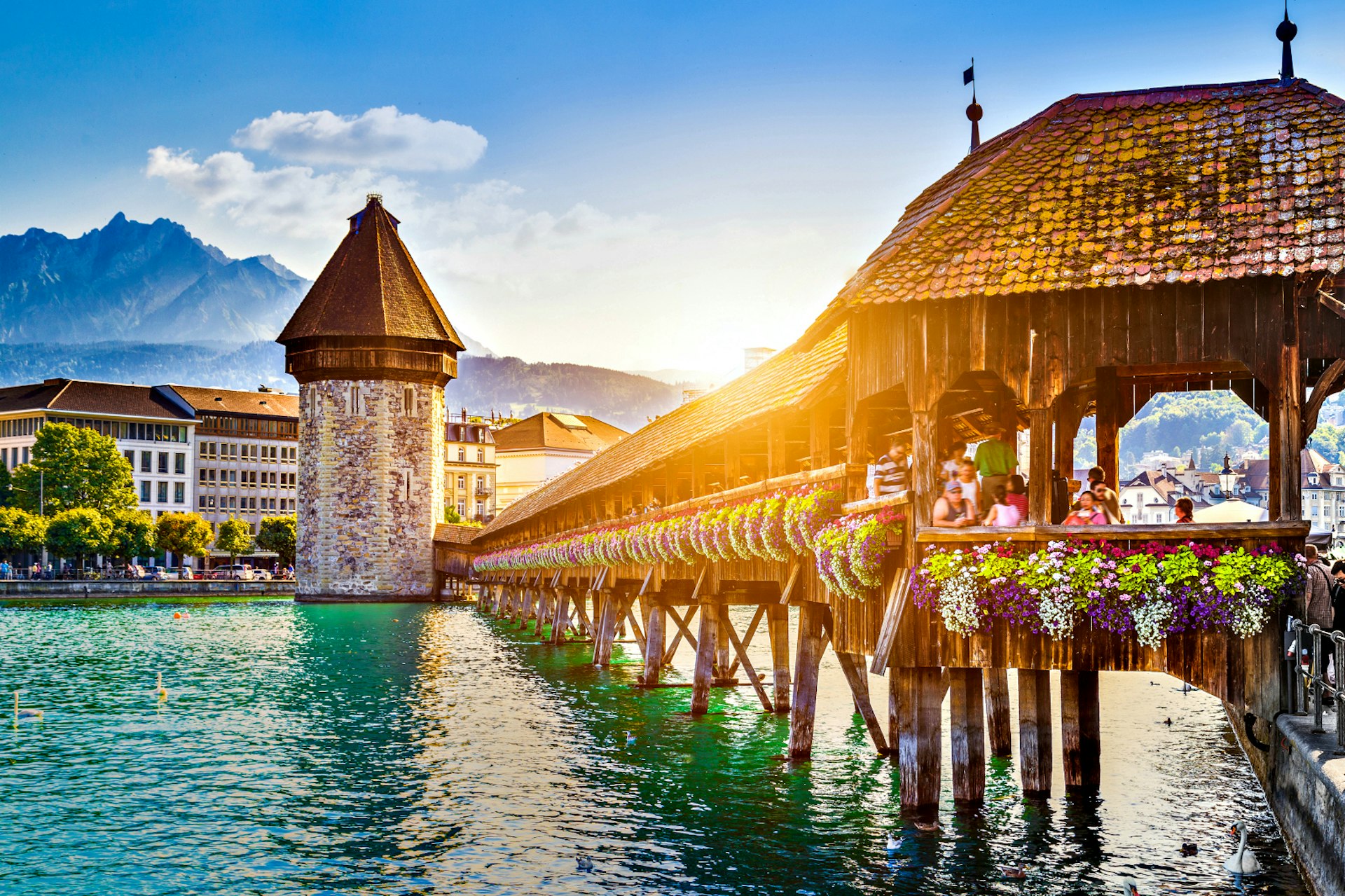
See the city sights on the cheap
It costs nothing to stroll through Bern ’s Unesco-listed medieval center, cross Lucerne ’s 14th-century Kapellbrücke or ogle the jet d’eau fountain in Geneva .
And if you plan carefully, it’s possible to visit many museums on the cheap too – the Kunsthaus Zürich offers free admission on Wednesdays, the Kunstmuseum Basel is free in the early evenings and the Musee d’art et d’histoire in Geneva has "pay what you can" entry. Children get in gratis to most museums.
Tuck into low-cost leftovers
The amusingly named Äss Bar ( ässbar in Swiss German, from essbar in German, meaning "edible") is an anti-wastage initiative that collects the bread, cake and pastries remaining in bakeries at the end of the day and sells them at low prices in its own shops the day after. It’s a good way to pick up a sandwich for a bargain Sfr4 or a slice of cake for Sfr3. Look out for it in Zürich, Lausanne, Basel, Biel, Bern, Lucerne and Winterthur.
Similarly, the Too Good to Go app hooks up customers with restaurants that have leftover food to sell at the end of service. If you’re willing to be flexible and spontaneous, you can buy dinner for a lot less than in the restaurant itself.
Enjoy some local lake life without spending a franc
Summertime in most Swiss cities revolves around the local waterways. Whether you’re in Zürich , Lausanne or Lucerne, you’ll find open-air swimming spots all over town, often with free or low-cost facilities.
Try the Oberer Letten baths on the River Limmat in Zürich, or Vidy beach near Lausanne on Lake Geneva, both of which are free. In Bern and Basel , put your belongings in a dry bag and float through the city in the fast-flowing River Aare and Rhine, respectively.
Book a low-cost autumn flight and see Switzerland turn golden
Fall is one of the best times to visit Switzerland , and flights are generally much cheaper than in summer or ski season.
September is ideal for hiking and biking, with the mountain lifts still open and the weather usually balmy instead of scorching. Most of the lifts are shut in October, but choose a hike accessible by train or bus and you’ll be rewarded with a blaze of autumnal color in the larch forests, a glorious sight that summer tourists miss out on.

Be a savvy skier at one of Switzerland’s lesser-known resorts
Skiing at a famous Swiss resort, such as Zermatt or Verbier, is an expensive business, not just for the ski pass but for the food and accommodation too. So soften the blow by choosing a less glitzy resort, where everything’s a bit more reasonable. Try Grimentz-Zinal in the Val d’Anniviers , Villars-Les Diablerets in the Vaud Alps or Leukerbad in the Valais .
If you’re planning to ski a lot, the brilliant Magic Pass offers unlimited access to 69 ski areas in Switzerland for the super-low price of Sfr399 if you buy it in early April for the following season. As a comparison, the season pass for Zermatt alone is Sfr1890.
Take your own water bottle and fill up for free
Tap water not only tastes a lot better in Switzerland than it does elsewhere (UK, I’m looking at you), but it’s also freely available from water fountains all over the country. Take a refillable bottle and top up wherever you go, from city-center fountains to mountains springs. It’s all drinkable as long as it doesn’t have a sign saying non-potable/ kein Trinkwasser .
Avoid city-center pubs and enjoy a pint at altitude instead
Drinking alcohol (or even a coffee or two) in Swiss cities can be a real wallet drainer, with cocktails at around Sfr25 and a pint of beer topping Sfr9 in Lausanne and Geneva. But that’s not the case everywhere. Head to a café or restaurant in a small village and you may find drinks are a lot cheaper, and your Sfr6 pint might just come with a delicious mountain view too.
Daily costs in Switzerland
- Hostel room: Sfr30–60 (dorm bed)
- Basic room for two: Sfr120–150
- Self-catered apartment: From Sfr150
- Public transport ticket Geneva to Bern (159km): Sfr51
- Coffee: Sfr3.50–5.50
- Sandwich: Sfr6–10
- Dinner for two: Sfr80–100
- Pint at the bar: Sfr6–9
- Average daily cost total: Sfr200–300
This article was first published July 2019 and updated April 2023
Explore related stories
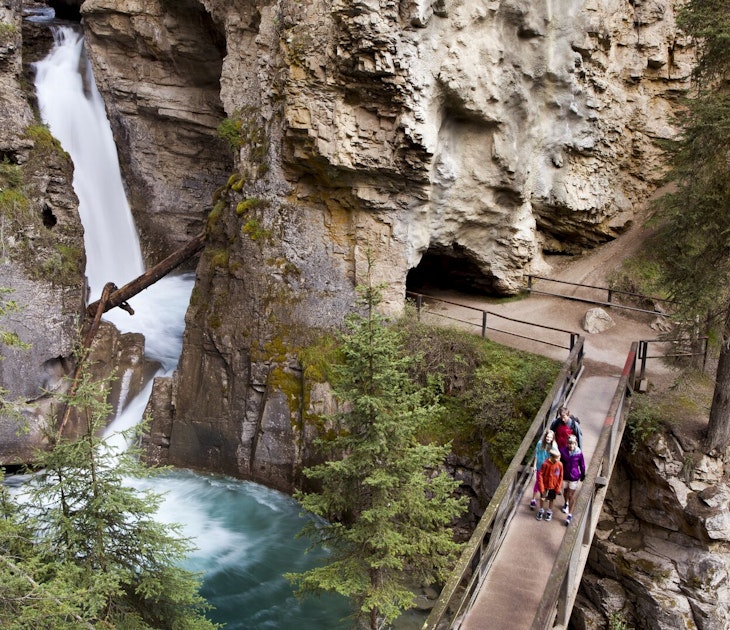
Apr 19, 2024 • 10 min read
Summer is just around the corner in the northern hemisphere. Here's where the Lonely Planet team is going.
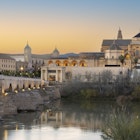
Apr 12, 2024 • 9 min read

Mar 15, 2024 • 8 min read
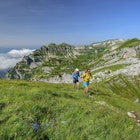
Mar 14, 2024 • 16 min read
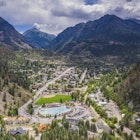
Mar 13, 2024 • 7 min read
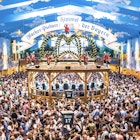
Feb 23, 2024 • 5 min read
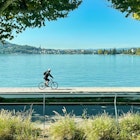
Jan 24, 2024 • 7 min read
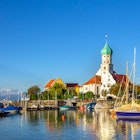
Jan 19, 2024 • 11 min read
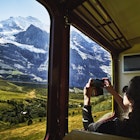
Jan 16, 2024 • 8 min read

Jan 8, 2024 • 8 min read

The Cost of Travel in Switzerland: My 2024 Budget Breakdown
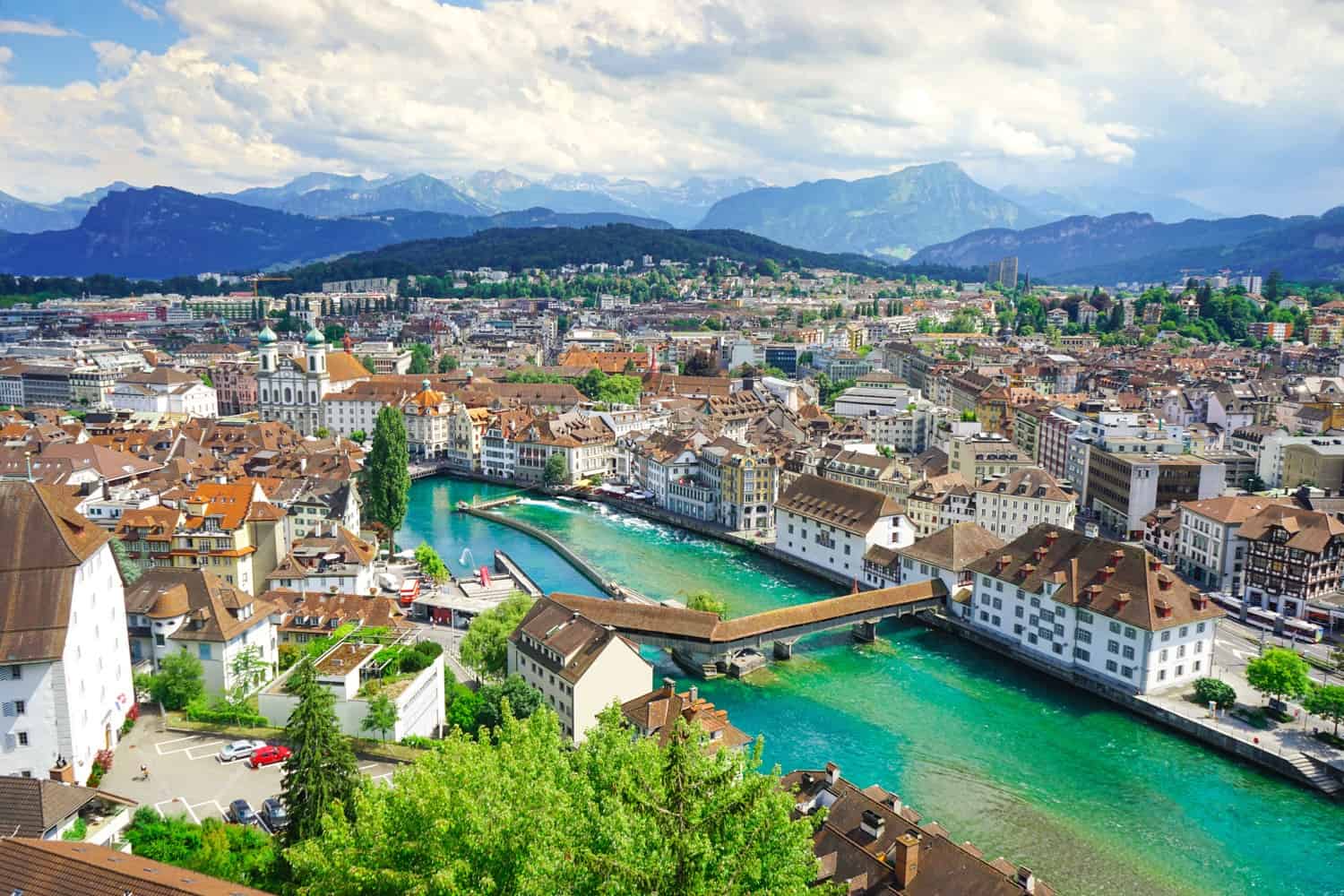
Is Switzerland expensive? This European country has a reputation for being one of the most expensive countries on the planet, but how accurate are the rumours?
Well, I hate to break it to you, but, uh, yeah, they’re pretty accurate.
Personally, I’ve travelled to a hundred countries over the past decade and Switzerland? Even on my most recent visit, taken at a time where everywhere has become more expensive, it still easily mades the top three when it comes to price.
It’s not all bad news, however, as I found tons of way to cut costs and find great value for money. Whether it’s using one of the many discount passes available, seeking out street food instead of eating in restaurants, or opting for comfortable guesthouses over high-end hotels, there are plenty of ways to keep on budget.
I’ve been keeping track of every single dollar I’ve spent over my past 12 years of travel, and I love distilling that information into detailed budget breakdowns. In these articles, I aim to share exactly how much I spent while travelling, covering budgets for all different kind of travellers, and ways in which you can lower your costs.
Today it’s Switzerland’s turn, so let’s get started.
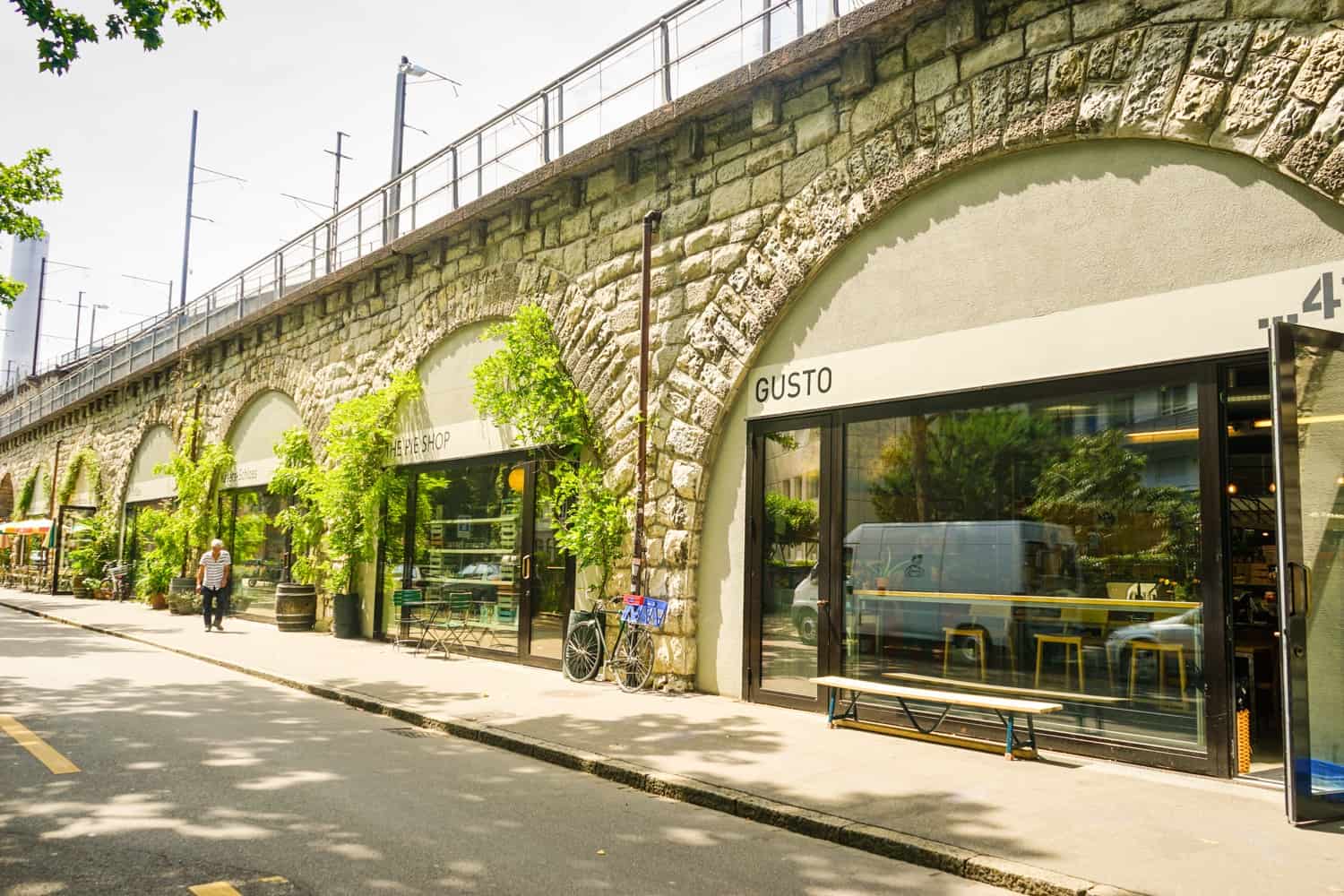
The Cost of Accommodation in Switzerland
You can visit Switzerland on a whole range of budgets, from a CHF 23 (€24) a night dorm bed in the Alps to an absolutely incredible CHF 900 (€950) a night hotel , the latter of which is the best hotel in Zurich and a haven for world-famous celebrities.
In this blog post, I’m going to be focusing on value . Because whether you’re travelling as a solo backpacker on a shoestring, as part of a couple on a mid-range budget, or as a family looking for a little luxury, value is the one thing you’re going to be keeping an eye out for. That doesn’t mean cheap — it means offering more than similarly-priced options.
There’s some seriously expensive accommodation up for grabs in Switzerland, so to start with, I’m going to cover the cheapest ways to find a bed for the night.
If you’re on the tightest of tight budgets, there are several options that’ll land you with free accommodation while you’re in the country. Courchsurfing allows you to connect with locals by sleeping on spare sofas in their homes. It doesn’t cost a penny to do so and is a fantastic way to gain an insight into Swiss daily life away from the tourists. There are close to 250,000 hosts in Switzerland, so there’s sure to be someone who’s right for you.
Housesitting is a more upmarket way to avoid paying for accommodation, as it’s aimed at the mid-range and luxury travellers. You’ll be looking after homes and pets while their owners are on holiday, and the houses can be extremely luxurious. This option works best if you don’t have fixed travel dates, as you’ll be agreeing to dates that the owners set.
Finally, when it comes to free accommodation, you could take a look at WorldPackers in Switzerland , where you’ll be able to volunteer with locals in exchange for food and board. I’ve seen some seriously cool options available on the site, from working at an eco farm in the Alps to helping build a yoga studio in a small, traffic-free village in the mountains. Readers of this site get a $10 discount for WorldPackers with the promo code neverendingfootsteps .
If you’re not looking to travel for free and just want a clean and comfortable room to sleep in, there are plenty of great options, too.
One of the most affordable ways to explore Switzerland is by staying in a hostel. I stayed in several during my first visit to the country and was impressed by their quality: I just wish there were more of them! Let’s look at the best-reviewed hostels in the country.
- The best hostel in Zurich is easily the Zurich Youth Hostel , where a space in a six-bed dorm is priced at just CHF 57 (€60) per person , and private doubles come in at CHF 136 (€144) per night . We loved our stay here! The included Swiss-style breakfast was delicious (and another great way to save money), and we really liked how close it was to Lake Zurich. Chilling out with a drink beside the lake on a summer evening is one of my favourite memories of the city.
- In Bern , you can’t get better than Bern Backpackers where the dorms are CHF 41 (€44) per night and the private double rooms are CHF 103 (€109) a night . You couldn’t ask for a better location either, just a ten minute walk from the main train station in the centre of town. There are a few other good hostels in Bern as well, but this one is rated just as well while being far cheaper than the alternatives.
- You’ll likely be heading to Lucerne while you’re in Switzerland, and if so, I recommend Young Backpackers Homestay , which has dorms for CHF 116 (€122) a night and double rooms for CHF 174 (€184) a night . It’s certainly pricey for a hostel, but it’s also the best-rated hostel in the entire country! It’s not hard to see why: it feels more like staying at a fancy ski lodge than a traditional backpackers, with everything from a sauna and hot tub to a foozball table, commercial-style kitchen, and incredible views from the cozy lounges and patios. Trust me: it’s 100% worth the price.
- Basel is home to Silo Design & Boutique Hostel , where dorms are priced at CHF 63 (€67) a night and doubles at CHF 142 (€150) . No wonder it’s the best-rated budget accommodation in town, with its great location, friendly staff, tasty included breakfast, and immaculate vibes.
- What about Geneva ? MEININGER Hotel Genève Centre Charmilles is the only place I’d consider staying. Not only is it inexpensive (well, for Switzerland) at CHF 42 (€45) a night for a dorm and CHF 141 (€149) for a twin, but the design is sleek, the location perfect, and the continental or buffet breakfast delicious.
Overall, then, you can see that you can expect to spend CHF 40-60 ( € 42-63) a night for dorms in most parts of Switzerland, and CHF 100-140 ( € 106-148) a night for the cheapest double rooms in each destination.
Okay, but what if you’re not a budget traveller and just want to stay in a lovely, well-reviewed hotel or guesthouse that’s good value for money and has all the things you need from a place to lay your head? I’ve got you! For around €150-200 a night , you’ll be able to stay in an excellently-reviewed hotel, in a central location, with friendly staff.
My 2024 Accommodation Recommendations for Switzerland
When I’m travelling, I’m always conscious to book the absolute best accommodation out there. I can easily spend days researching accommodation for every stop along my way, ensuring I’ve chosen the place in the best location with the friendliest staff, and the greatest value for money.
My biggest tip? When you head to Booking to find a hotel, ignore the results that are sorted under “Our Top Picks” — that’s a list of all of the hotels that pay Booking the highest commission, some of which have pretty poor write-ups. Instead, opt to sort the properties by “Top Reviewed”. That way, you’ll be able to see which properties actually have the best reviews.
To give you an idea of what you can expect to spend on a trip, I always like to share where I personally stayed and what I thought of the accommodation. All of the properties below come in at a mid-range budget:
In Zurich , the choice is easy: I’d highly recommend the recently-opened Locke am Platz Zurich , where double rooms cost CHF 194 ( € 205) . Trust me: the price is actually super-reasonable (by the standards of this expensive city!). This hotel is sooooo stylish; I was obsessed with all the little interior design features! Our room came with its own kitchenette, which helped us save money on food. There was an excellent restaurant downstairs, too, which was great for dinners in the evening if you don’t feel like heading outside. The hotel’s in a great location, too, close to parks, gardens, and the lake, with a station for the airport train just down the street.
For Bern , I’d recommend opting for Stay KooooK Bern City . It’s in the best location in the city; a five minute walk from the main train station and close to most of the city’s main attractions. The compact, modern rooms cost CHF 211 (€233) and were home to the most comfortable beds in the country. Well, in my opinion, at least! You’ll get amazing views across the city from the rooftop terrace, and I loved having access to the shared space, dubbed “The Flat”, which includes a large kitchen, lounge, and games room for all guests to use. I was a big fan of this place.
For Lucerne , your best option is Hotel Goldener Stern . This near-new hotel is in a great spot right on the edge of the Old Town, an easy stroll from all the major attractions and the lake. The rooms ( CHF 181/€191 for a double) are immaculately clean, with everything you might need inside: there’s a desk for getting a bit of work done, a coffee machine to help get the day started, and a fridge so you can guarantee a cold drink when you come back from a few hours exploring in the summer heat.
For Basel , I really enjoyed Hotel Spalentor , a delightful hotel that was only a five minute walk from the old town and university, and provides impressive value for money at CHF 170 ( € 180) . The rooms are modern and surprisingly spacious, super-quiet, and with a coffee machine to boot. I especially appreciated the fitness centre and spent many afternoons in their lovely garden with a drink in hand. Bikes are available for free to use during your stay, and there are even DVDs you can borrow from reception if you’re in the mood for a lazy day inside.
Okay, as soon as I discovered that you could stay on Lake Geneva (rather than beside it), I was sold. Floatinn Boat-BnB is a luxury catamaran, moored right beside the downtown area and opposite the famous Jet d’Eau fountain. The cabins (CHF 206 / € 218) are comfortable if a little snug (you’re on a boat, after all!) but all have a private bathroom, and there’s a large sundeck to laze on and admire the incredible view. All of Geneva’s attractions are within an easy walk, but make sure you don’t rush off first thing in the morning: the owner rustles up an incredible breakfast. Such a unique property and one that I can’t stop dreaming about!
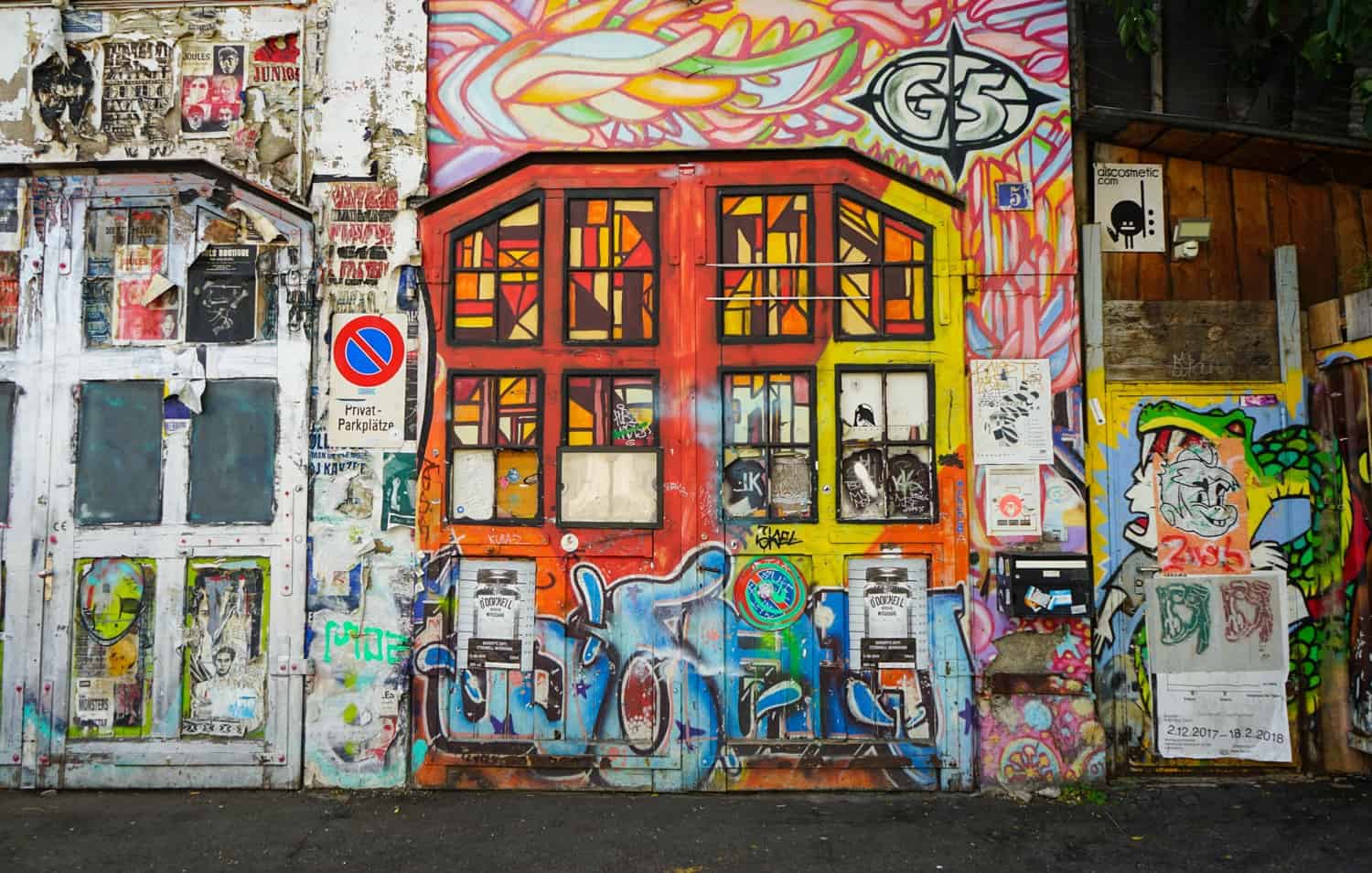
The Cost of Transportation in Switzerland
Transport around Switzerland can get pretty expensive, but there are definitely ways to save money. If you’ll be in the country for a while or just expect to do a lot of moving around while you’re there, the best tip I can offer is to pick up a Swiss Half Fare card .
Only available to overseas visitors and valid for 30 days, it costs CHF 120 / €127 up front. After that, you get 50% off basically every train, bus, and boat trip you take in the country, most mountain railways, and all public transport in 90+ cities and towns. If you’re travelling with kids, you can also get a free Family Pass with your card: using that, one child under 16 travels free for each adult with a card. This can really cut down the cost of family travel!
Whether you’ve got a pass or not, you’ll save money if you’re happy to give up some flexibility. Where they’re available, supersaver tickets with fixed departure times are cheaper than “point-to-point” tickets that let you travel at any time on a given day. Just be sure not to miss the train: you’ll need to buy a replacement ticket if you do!
Many major cities also provide free local transport passes to overseas hotel guests, at least for the first 24 hours. Be sure to grab one if it’s offered! That said, every city in Switzerland is very walkable, so you shouldn’t need to use public transport to get around if you’re staying somewhere central. I walked absolutely everywhere — even in Zurich — and never once found it difficult or tiring to do so.
Note that in some cities (like Zurich), certain ferry routes on the lake are also included in the public transport zone system. Confirm the details for any specific ferry you want to take, but if you’ve got a 24-hour or other all-inclusive public transport pass, it’s a good way of getting out on the water!
While it’s possible to fly between certain cities in Switzerland, it’s really not worth doing. It’s not a big country, and the trains are fast, efficient, and noticeably cheaper than taking a plane. Getting between Zurich and Geneva ( from one end of the country to the other) takes under three hours, starts and finishes right in the central city, and costs around a third of a comparable flight.
Finally, it’s worth mentioning the Swiss All-in-One Travel Pass, which provides unlimited travel for anywhere between 3-15 days on all Swiss trains, buses, and public transport. It also includes free entry to hundreds of museums, one free mountain excursion, and discounts on many others. You can get all the details for it here .
With that out the way, here are a few examples of what you should expect to pay for transport in Switzerland.
- Train or tram from the airport to downtown Zurich: CHF 3.40 (€3.60)
- Zurich tram, bus, or ferry – single ride in one or two zones: CHF 4.60 ( € 5)
- Zurich 24-hour public transport pass (two zones): CHF 9.20 (€10)
- Train from Zurich to Lucerne (one-way): CHF 19 (€20)
- Train from Zurich to Geneva (one-way): CHF 64.40 (€68)
- Train and bus from Zurich to Vaduz, Liechtenstein: CHF 31.80 (€33.80)
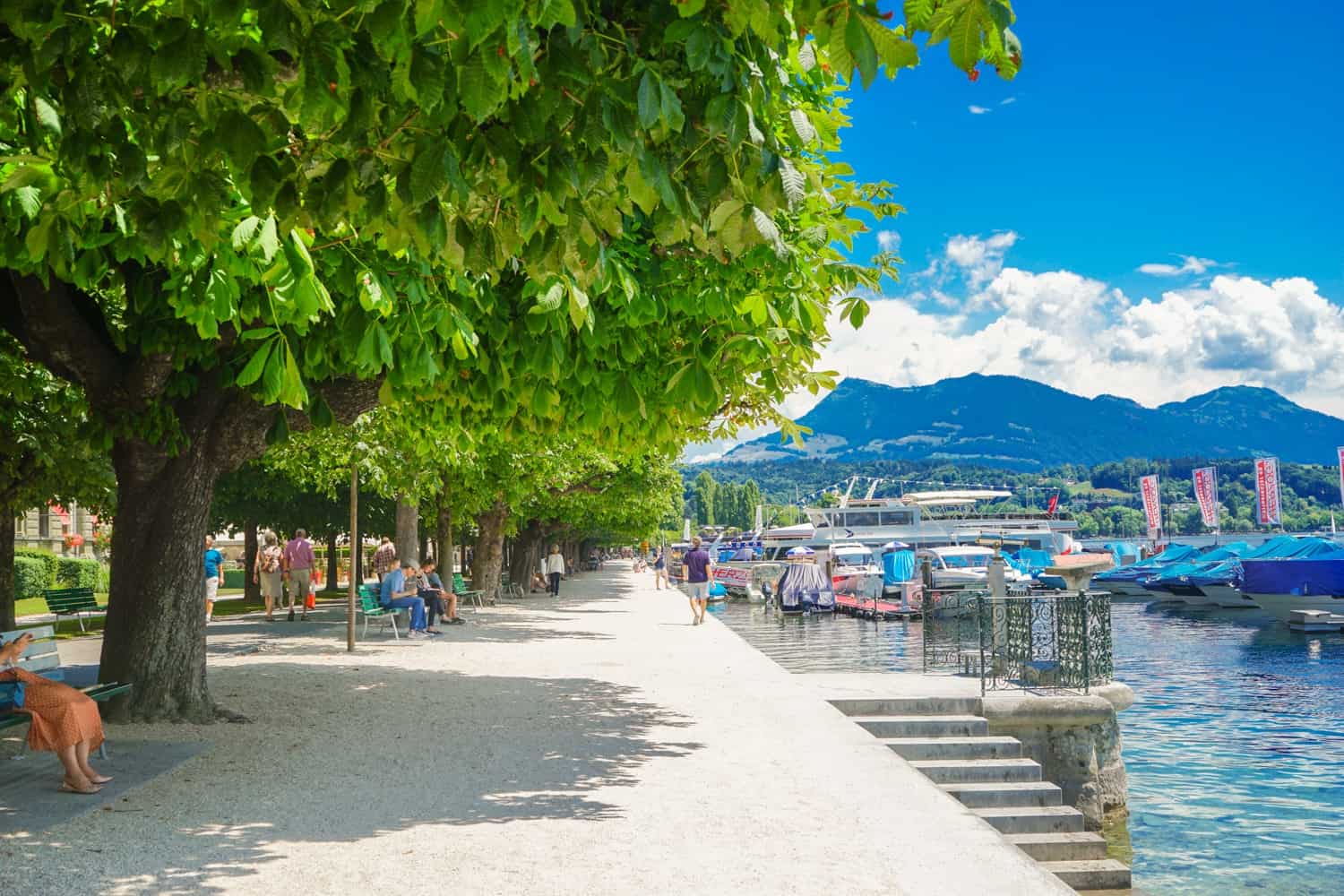
The Cost of Food in Switzerland
If I were to ask you what you know about Swiss food, odds are, you’d come back to me with two iconic dishes: cheese fondue and chocolate. After all, they’re two of Switzerland’s most famous creations, so — unless you don’t eat dairy! — you’re definitely going to want to sample both while you’re in town.
Fondue is life up in those Swiss mountains, and most restaurants offer it on their menus. You can think of it as a gigantic cheese dip that’s often served in a communal pot atop a small stove. To eat it, you dip rustic country bread into the melted cheese with a long metal fork. The cheese itself is typically a blend of 50-50 gruyère and vacherin and has been cooked with white wine and garlic, resulting in one of the tastiest dishes on the planet. You can expect to pay €30-35 per person .
Now, one thing to keep in mind is that the majority of Swiss people treat their lunch as their main meal of the day: this is when you’ll find cheap deals at cafes and restaurants. Either opt to join the locals and have a large meal at midday, or head to a grocery store to pick up supplies for a picnic. Head to Aldi, Lidl, or CoOp to find the cheapest provisions.
Whenever I find myself travelling in an expensive country like Switzerland, I find myself turning to fast food and street eats: specifically, kebabs. Yep, on a day trip from Zurich to Lucerne, I decided to up the classy dial and ordered a kebab for lunch. The cost? CHF 10(€11) . So much cheaper than almost any alternative in the city, and very tasty as well!
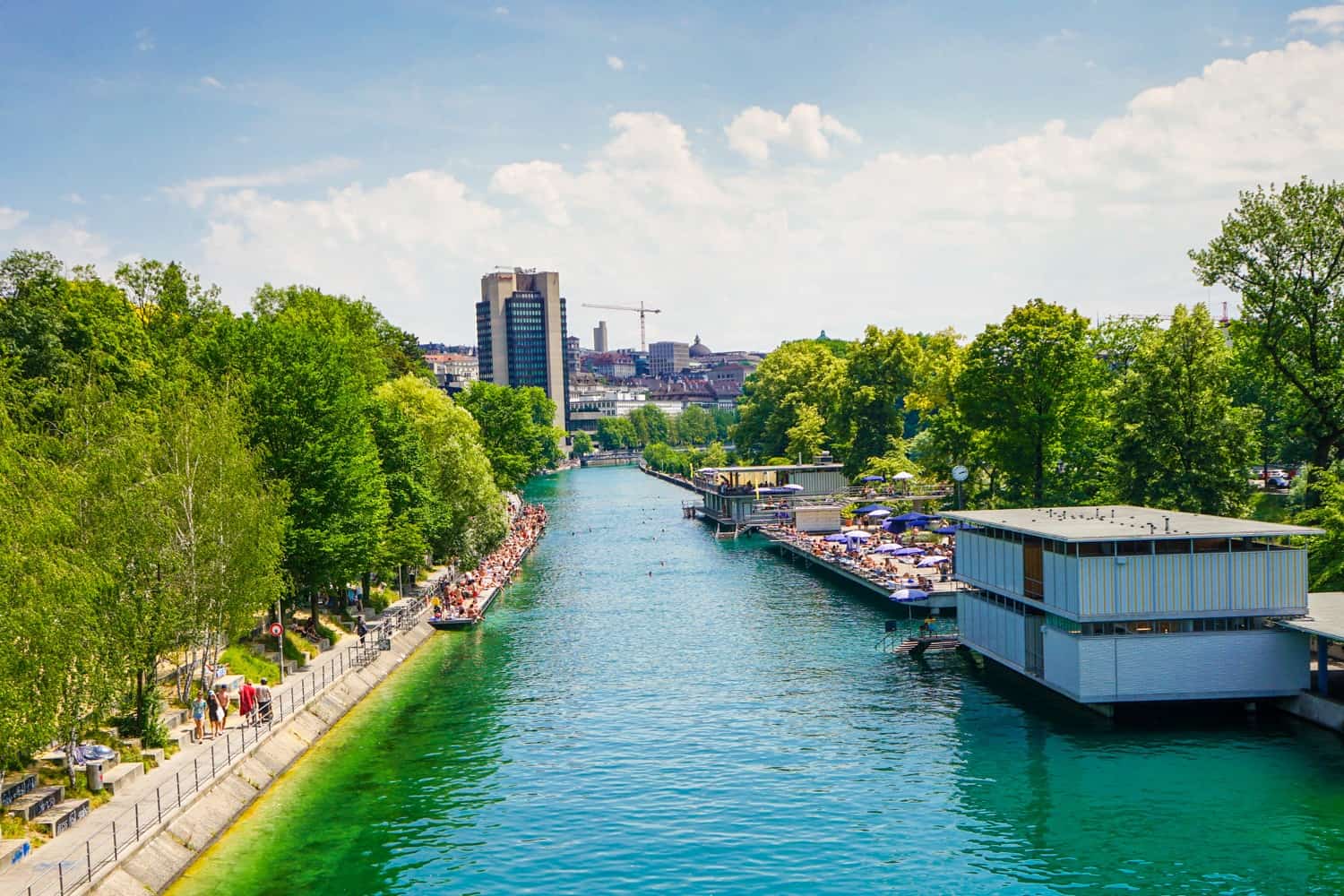
The Cost of Activities and Entrance Fees in Switzerland
Next up: activities! Activities and entrance fees can often make up a large proportion of your travel expenses. Fortunately, in Switzerland, those costs can be relatively low, as there’s so much available to do for free.
Switzerland is a nature enthusiast’s playground, blanketed in mountains and lakes, which are easily to climb and explore. One of my favourite Swiss activities involve simply choosing a hiking trail, packing a picnic, and preparing myself for views that are straight out of a postcard.
An easy way to save money on your vacation is by utilising the country’s city cards to gain discounts and entrance to all of the most popular attractions. The Zurich Card , for example, is priced at CHF 29 (€31) for 24 hours of use, or CHF 56 (€59) for 72 hours. This offers up phenomenal value, because the card gives you access to unlimited use of public transportation in the city, a free boat trip on Lake Zurich, entrance to 40 museums, a 50% discount on the Zurich old town walking tour, and a 20% discount in several stores in the city. The Zurich card is also valid on transport between the airport and the city centre.
There’s also a Geneva City Pass , which is priced at CHF 30 (€32) for 24 hours, CHF 40 (€42) for 48 hours, and CHF 50 (€53) for 72 hours. As with the Zurich Card, you’ll receive free access to all public transport, entrance to tons of museums and attractions, free skiing, free cable car rides, free boat hire on the lake — you get so much with this pass that you’ll be saving money within a couple of hours of arriving.
Aside from the city passes, there are plenty of tours, excursions, day trips, and activities to sample. One museum that is worth the entrance fee is Zurich’s Lindt Home of Chocolate Museum — tickets are priced at CHF 15 (€16) per person and can be bought in advance here . If you love your chocolate, you’re going to adore this museum. Not only does your ticket grant you unlimited tastings of Lindt chocolate, but there’s also a nine-metre-high chocolate fountain to take photos with!
If you’re not planning on spending much time outside of Zurich, make sure to squeeze in a day trip or two, to ensure you see more of this beautiful country. This day trip to Grindelwald and Interlaken costs CHF 97 (€102) for 12 hours of exploring. You’ll see all the prettiest parts of Switzerland, as you gaze up at the triple peaks Eiger, Mönch, and Jungfrau, take the cable car up to Mount First, jump aboard the scenic train between Grindelwald and Interlaken, and funicular up to Interlaken’s Harder Kulm mountain.
Speaking of mountains, there are so many to see! From Lucerne, CHF 145 (€153) gets you up to the incredible Mount Titlis on this day trip experience . Mount Titlis is the only accessible glacier in Central Switzerland, and you’ll spend your day riding the world’s first revolving cable car up the mountain, dancing across Europe’s highest spectacular suspension bridge, and wandering through a real-life glacier cave.
From Geneva, I have to recommend taking a day trip out to Chamonix and famous Mont Blanc . How could I not? For CHF 105 (€111) per person , you’ll get to spend 10 hours exploring two of Europe’s most well-known destinations. After crossing the French border, you’ll hit up Chamonix — yes, the exclusive ski resort and the site of the first ever Winter Olympics. You’ll take the cable car to Aiguille du Midi, and take in Mont Blanc from so many different viewpoints. You can even opt to jump on the Montenvers rack railway to the Mer de Glace glacier.
If you know anything about Interlaken, it’s probably that it’s one of Europe’s top adventure travel destination. And the number one activity in town? Paragliding ! For CHF 180 (€190) per person , you’ll be able to jump on a tandem paragliding experience that’ll give you access to some of the best views in the country, if not the entire world. Seriously — check out the photos from the tour company!
And finally, I’ve saved the best activity for last, because if there’s one thing you simply have to experience while you’re in Switzerland, it’s Jungfraujoch! Simply buy your ticket online ( CHF 233.80/€247 for a return), exchange it for a pass at Interlaken Ost, Jungfraujoch, or Lauterbrunnen train station, then experience the journey to the highest train station in Europe. The views are phenomenal.
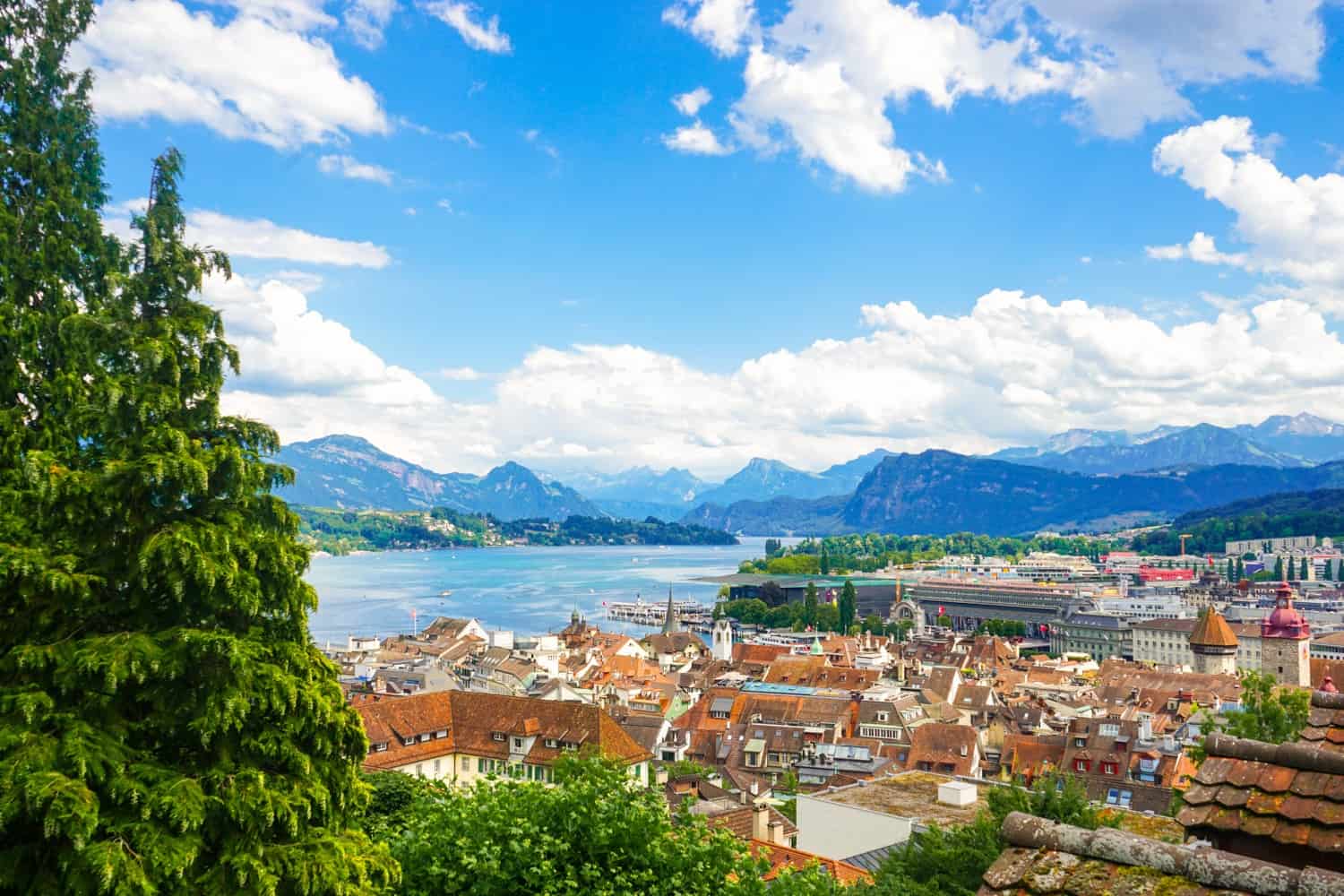
The Cost of Travel Insurance in Switzerland
If you’ve read any other posts on Never Ending Footsteps, you’ll know that I’m a great believer in travelling with travel insurance. I’ve seen far too many Go Fund Me campaigns from destitute backpackers that are unexpectedly stranded in a foreign country after a scooter accident/being attacked/breaking a leg with no way of getting home or paying for their healthcare. These costs can quickly land you with a six-figure bill to pay at the end of it.
In short, if you can’t afford travel insurance, you can’t afford to travel.
Travel insurance will cover you if your flight is cancelled and you need to book a new one, if your luggage gets lost and you need to replace your belongings, if you suddenly get struck down by appendicitis and have to be hospitalised, or discover a family member has died and you need to get home immediately. If you fall seriously ill, your insurance will cover the costs to fly you home to receive medical treatment.
I use SafetyWing as my travel insurance provider, and recommend them for trips to Europe. Firstly, they’re one of the few companies out there who will actually cover you if you contract COVID-19. On top of that, they provide worldwide coverage, don’t require you to have a return ticket, and even allow you to buy coverage after you’ve left home. If you’re on a long-term trip, you can pay monthly instead of up-front, and can cancel at any time. Finally, they’re more affordable than the competition, and have a clear, easy-to-understand pricing structure, which is always appreciated.
With SafetyWing, you’ll pay $1.50 a day for travel insurance.
How Much Does it Cost to Travel in Switzerland?
With all of that being said, it’s time to tally up all of my travel expenses in Switzerland, in order to give you an idea of how much you can expect to spend while travelling in this wonderful country:
Accommodation: CHF 192 per day for two people (CHF 96 each ) Transportation: CHF 19 per day Food: CHF 31 per day Activities: CHF 37 per day Total amount spent per day per person: CHF 183 (€193)
Are you planning a trip to Switzerland? Have any questions? Let me know in the comments below!
Further Reading on Switzerland 🇨🇭 15 Best Things to Do in Geneva, Switzerland 🏔 Top Things to do in Zurich, Switzerland ⚛️ A Private Tour of CERN’s Large Hadron Collider
Lauren Juliff
Lauren Juliff is a published author and travel expert who founded Never Ending Footsteps in 2011. She has spent over 12 years travelling the world, sharing in-depth advice from more than 100 countries across six continents. Lauren's travel advice has been featured in publications like the BBC, Wall Street Journal, USA Today, and Cosmopolitan, and her work is read by 200,000 readers each month. Her travel memoir can be found in bookstores across the planet.
Related Posts
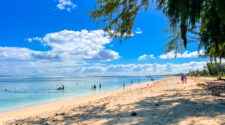
The Cost of Travel in Mauritius: My Detailed Budget Breakdown

The Cost of Travel in Thailand: My Detailed Budget Breakdown
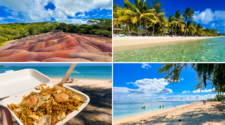
2023: My Travels in Review
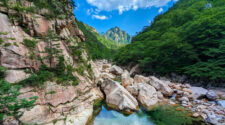
The Cost of Travel in South Korea: My 2024 Budget Breakdown
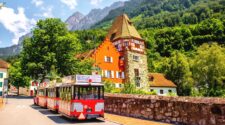
What’s it Like to Travel in Liechtenstein?
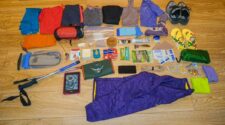
What to Take On the Camino Primitivo: My Detailed Packing List
How would you recommend one – 1 1/2 week budget travel experience in Switzerland? After Switzerland, I plan to go to South of France. Any suggestions there?
Leave a reply Cancel reply
Your email address will not be published. Required fields are marked *
Meet Lauren Juliff
Nomadic Matt's Travel Site
Travel Better, Cheaper, Longer
10 Tips on Visiting Switzerland On A Budget
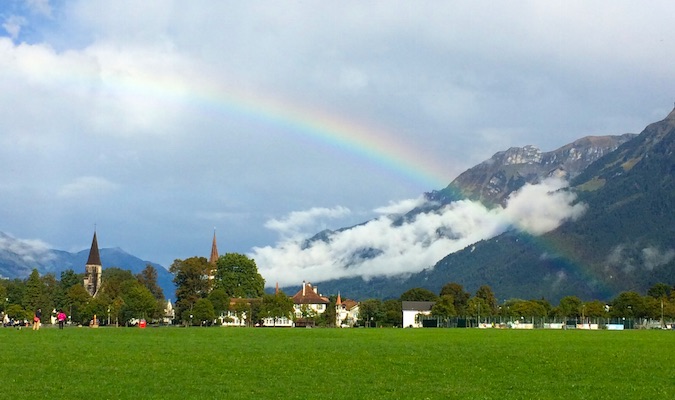
Switzerland conjures up many images. On one side, there are majestic mountains, delicious fondue and chocolate, big banks sheltering people’s money, precision watches, and an orderly society.
But those majestic mountains and stunning scenery come at a price: Switzerland is the most expensive country in the world.
Understandably, with visiting Switzerland so expensive, it’s easy to see why so many backpackers and budget travelers skip over the country and wait until they are older and (hopefully) wealthier.
When I mentioned I was visiting Switzerland on a budget, many people shook their heads and wished me good luck with a “poor soul to think he can do that” expression.
I’ll admit, I was worried. While I’ve found that not all “expensive” destinations need to be tough on the wallet (though some are unavoidably expensive), traveling to Switzerland on a budget seemed daunting.
But, while Switzerland will never be a “dirt cheap” country to visit, where travelers can visit on just a few dollars a day, there are definitely ways to save here so you can visit without breaking the bank.
To help you plan your trip, save money, and ensure you make the most out of your budget visit, here’s everything you need to know to avoid breaking the bank in Switzerland:
How Much I Spent in Switzerland
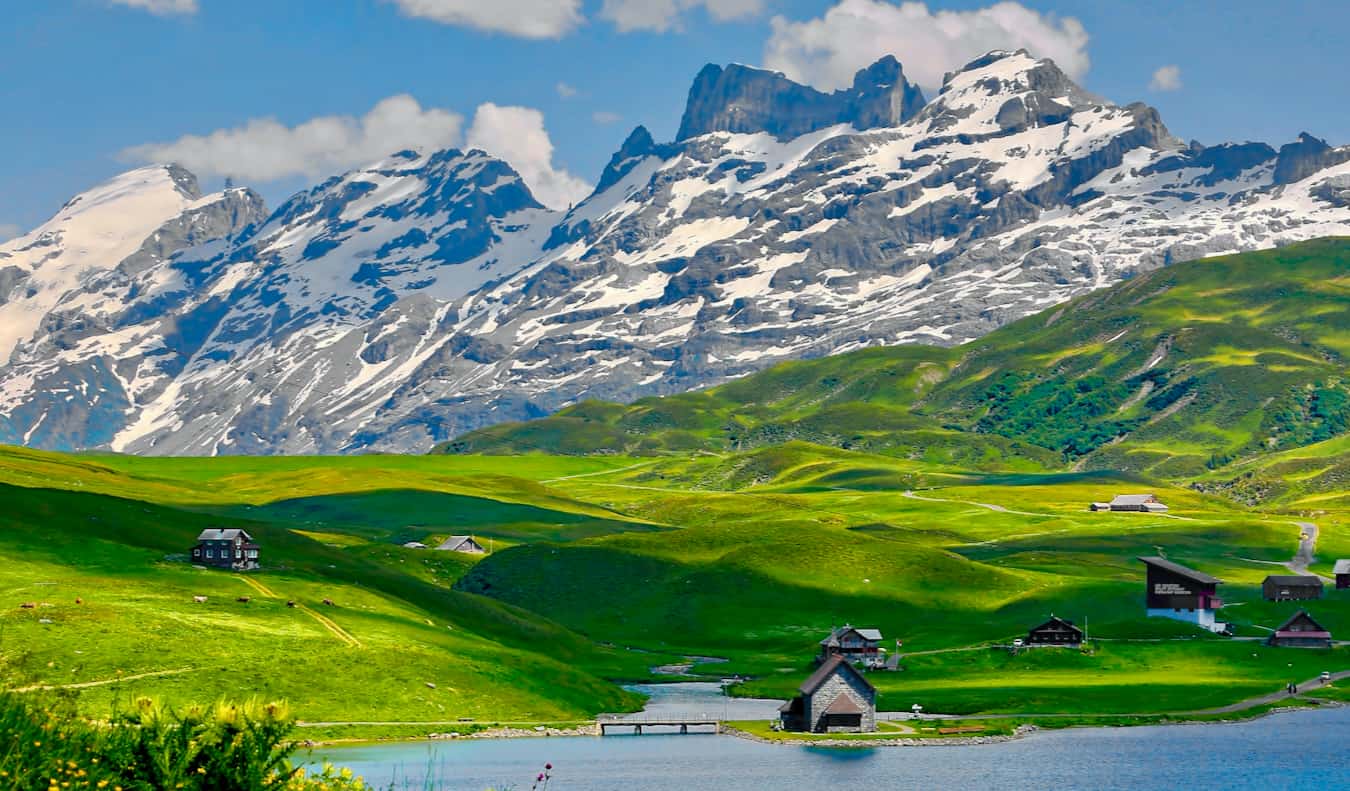
Food: 105.75 Accommodation : 171.36 Transportation : 222.30 Metro : 17.40 Alcohol: 66.90 Attractions : 30 Total : 613.71 (or 76.71 CHF per day)
Overall, I did a good job keeping my costs down, spending around $79 USD per day. However, it took a lot of work and constant vigilance. I relied heavily on the sharing economy (see below) and cooking my own food to make this happen. Being able to hike and visit free attractions also helped, though in wintertime when you have to pay to ski, this might not be the case.
Having spent a few days in Zurich in the past, I didn’t feel the need to eat out a lot so I was happy to eat my own food versus ordering expensive restaurant food. Alcohol cost a fair bit (11% of my budget) but there was no way I was going to Interlaken without partying in the famous Balmers (also the only hostel I stayed in the entire time).
My biggest mistake was not paying attention to the fact I was flying in and out of Zurich. Since I went from Zurich to Geneva to Zurich, that meant I doubled back, costing me an extra 100 CHF in train tickets! This was such as stupid mistake, and I still kick myself for it. I mean, how could I miss such a simple thing?!
If I had gone one way, I would have saved a substantial amount of money and significantly lowered my average spending. Always pay attention to your direction to save money on transportation. It’s a hard and fast rule of mine and I completely messed up.
Suggested Daily Budget in Switzerland
How much should you spend in Switzerland ? Well, that depends.
Depending on where you want to spend your money you could spend as little as $60 USD a day on a tight backpacking budget. This budget would require you to couchsurf every night, cook all your food, do only free activities (there’s plenty), and avoid alcohol. You’d be traveling on a shoestring. It would be hard but not impossible.
Below is a chart of some suggested budgets based on different travel styles to help you plan out your spending. Prices are in CHF.
For reference, on a mid-range budget of around 200 CHF per day, you can stay in an Airbnb, eat out for a few meals, enjoy a few drinks, take the occasional taxi to get around, and do some paid tours and activities like visiting museums or going skiing.
How to Save Money in Switzerland
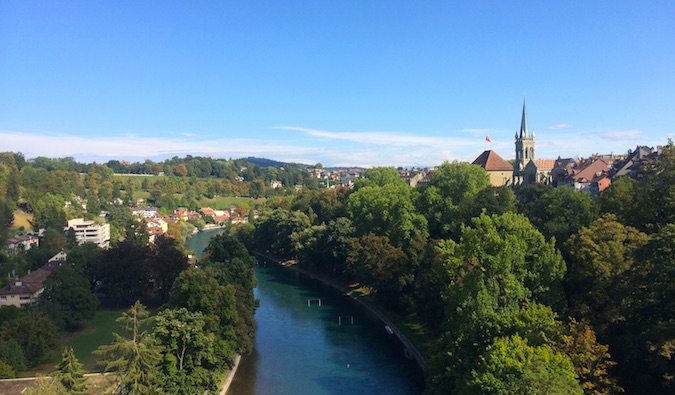
Even if I had done ridesharing or Couchsurfing during my visit, I would have moved those extra savings into other activities. (Be frugal, not cheap is my travel philosophy. So, I think my budget was just right for the country.)
For those looking to keep costs low, here are ten high-impact ways to save money in Switzerland:
1. Use Couchsurfing As in any destination, accommodation costs can eat up a big portion of your budget. To offset that, try Couchsurfing . It’s a service that lets travelers stay with locals for free. It was a lifesaver that allowed me to keep my costs down the most. Since a lot of travelers use this service, make your requests for hosts early. I put in 25 hosting requests in Geneva before I found someone to stay with.
2. Use BlaBlaCar Transportation is very expensive, even more so than accommodation. Most intercity trains are 50-100 CHF. That adds up! Instead, use the ride-sharing website BlaBlaCar to avoid the trains and meet locals.
This website lets you rideshare with people. Drivers with extra seats in their car will post where they’re going and you can pay a small fee to join them. Not only is it usually faster than the train or bus but you get to meet some interesting people along the way.
Though I only used it once, it saved me $50 USD and I met a cool French father and son team on their way to Germany (I got to practice my poor French):

A word of caution: be advised that many rides cancel. I had three rides canceled on me at the last minute (and one guy who just failed to even show up), so the service requires some flexibility. But when it works, it’s awesome. And it’s definitely something I want to use a lot more in Europe .
3. Cash in hotel points Hotel reward points are a lifesaver in expensive destinations, where even hostels are expensive and the chance of getting a Couchsurfing host is small. Rack up hotel points before your trip and burn them while you stay in the country. Most hotel sign-up bonuses are worth enough points for a few free nights in a hotel, saving you hundreds of dollars right off the bat. ( These are the best hotel credit cards .)
4. Don’t drink Alcohol is not cheap here. Most beers are around 8 CHF and cocktails can cost between 12-15 CHF. Plus, who wants to hike while hungover? If you must drink, stick to hostel bars where you can enjoy cheap beer during happy hours.
5. Cook your own meals With sit-down restaurants costing 25-40 CHF per meal, eating out in Switzerland can be costly. If you’re on a tight budget, buy groceries at the supermarket and cook your own meals. A week’s worth of basic staples like pasta, rice, bread, eggs, and produce costs around 65-95 CHF. Just be sure to book accommodation with a kitchen.
6. Go veggie Meat is expensive in Switzerland. Every Swiss resident or expat I talked to told me about how they limit their meat consumption because it costs so much. Do the same and limit your meat consumption. Your wallet will thank you.
7. Eat lunch specials If you are going to eat out, do so during lunch, when restaurants offer lunch specials. Moreover, stick to Chinese, Middle Eastern, Indian, and Thai restaurants for the best deals and biggest portions. Lunch specials are a great way to get a lot of bang for your buck and to enjoy the dinner menu but at a cheaper set menu price — this is the only way I eat when visiting countries as expensive as Switzerland. Cook breakfast, eat out lunch, cook dinner — you can’t go wrong!
8. Ask for discounts Many museums and other tourist attractions offer student discounts so always ask if there are student discounts if you happen to be a student.
9. Get a city tourism card Most cities have a city card or city pass that gets you discounts or free admission to museums and sights. Most of them also provide free transportation too. If you’re planning on doing a lot of sightseeing, these cards are really cost-effective.
For example, the Zurich Pass offers free local transportation as well as free admission to forty museums in the city for just 27 CHF.
10. Bring a water bottle – The tap water in Switzerland is safe to drink so bring a reusable water bottle to save money and reduce your plastic use. LifeStraw is my go-to brand as their bottles have built-in filters to ensure your water is always clean and safe.
Switzerland is an expensive country to visit — there’s no doubt about it. But no matter your travel style or what you plan to do, following the tips above will allow you to visit Switzerland on a budget. It won’t be a bargain-basement trip but it won’t break the bank either, allowing you to maximize your spending as you explore this stunning, postcard-perfect destination.
Get Your In-Depth Budget Guide to Europe!
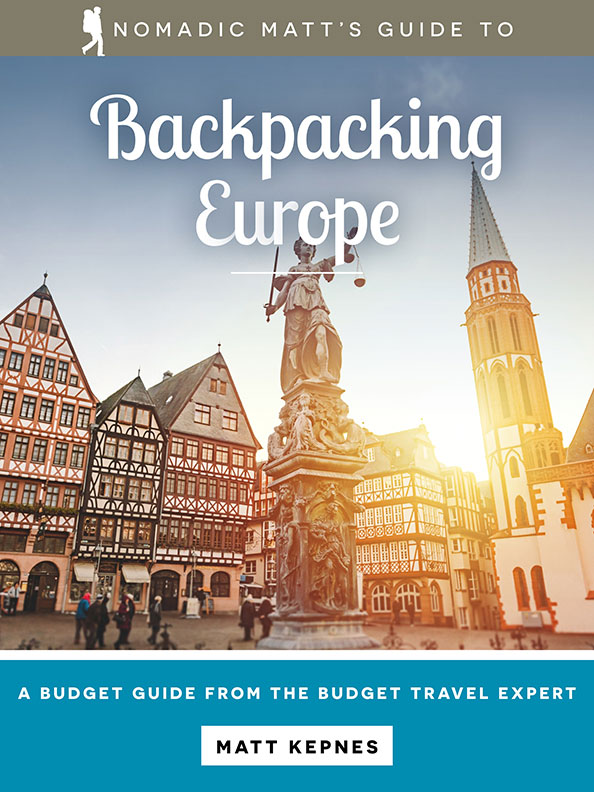
My detailed 200+ page guidebook is made for budget travelers like you! It cuts out the fluff found in other guides and gets straight to the practical information you need to travel while in Europe. It has suggested itineraries, budgets, ways to save money, on and off the beaten path things to see and do, non-touristy restaurants, markets, bars, safety tips, and much more! Click here to learn more and get your copy today.
Book Your Trip to Switzerland: Logistical Tips and Tricks
Book Your Flight Use Skyscanner to find a cheap flight. They are my favorite search engine because they search websites and airlines around the globe so you always know no stone is left unturned!
Book Your Accommodation You can book your hostel with Hostelworld as they have the biggest inventory and best deals. If you want to stay somewhere other than a hostel, use Booking.com as they consistently return the cheapest rates for guesthouses and cheap hotels. My favorite places to stay in the country are:
- Balmers Hostel (Interlaken)
- Zurich Youth Hostel (Zurich)
- City Hostel (Geneva)
Don’t Forget Travel Insurance Travel insurance will protect you against illness, injury, theft, and cancellations. It’s comprehensive protection in case anything goes wrong. I never go on a trip without it as I’ve had to use it many times in the past. My favorite companies that offer the best service and value are:
- Safety Wing (for everyone below 70)
- Insure My Trip (for those over 70)
- Medjet (for additional repatriation coverage)
Looking for the Best Companies to Save Money With? Check out my resource page for the best companies to use when you travel. I list all the ones I use to save money when I’m on the road. They will save you money when you travel too.
Want More Information on Switzerland? Be sure to visit our robust destination guide on Switzerland for even more planning tips!
Editor’s Note : Visit Switzerland paid for my one-way flight from Zurich to NYC as well as reimbursed me for expenses. They provided no logistical support or had any input on how or where I went. I traveled the same way I would anywhere else.
Got a comment on this article? Join the conversation on Facebook , Instagram , or Twitter and share your thoughts!
Disclosure: Please note that some of the links above may be affiliate links, and at no additional cost to you, I earn a commission if you make a purchase. I recommend only products and companies I use and the income goes to keeping the site community supported and ad free.
Related Posts

Get my best stuff sent straight to you!
Pin it on pinterest.

11 Cheapest Ways To Travel Switzerland On A Budget [2024]
- Post author: Nicoletta
- Reading time: 38 mins read
- Post last modified: March 4, 2024
- Post comments: 0 Comments

Many people think that traveling in Switzerland is incredibly expensive. That is why they eventually decide to spend a day in Zürich and walk away. However, such a decision only convinces them that Switzerland is an expensive country.
It doesn’t necessarily have to be true if you can find your way . I visited Switzerland for the first time in a month and saved significant money. After that, I lived there for 3 years and found many ways to cut your expenses .
So, in this article, I’ll reveal the 11 cheapest ways to travel to Switzerland on a budget and explore as much of this stunning country as you want.
11 Cheapest Ways To Travel Switzerland On A Budget: Quick Guide
Here is a quick list of the cheapest way to travel in Switzerland for you:
- Get Swiss Travel Pass
- Purchase Half-Fare Card
- Get Saver Day Pass
- Buy Single Train Tickets Online In Advance
- Get Regional Passes
- Plan Your Itinerary
- Go Camping/Hostels
- Stay In A Local Family
- Avoid Restaurants
- Find Local Markets
- Bring Your Water Bottle
✈ Travel Resources For Your Trip ✈
Here are some of my favorite travel resources I use for my travel adventures.
1. Get Swiss Travel Pass or Swiss Travel Pass Flex
The most important thing is getting a travel pass to see Switzerland. Never pay for a single ticket unless you buy it at a specific place for less or just need to make a single train ride.
With a travel pass, you’ll save up so much in Switzerland.
Swiss Travel Pass
If you want to travel to Switzerland for a longer time (at least 5 days) and see different places (at least 5), the best way to save up is to purchase a Swiss Travel Pass .
This Pass is available for 3, 4, 8, or 15 days . All trains, buses, boats , and public transportation in cities are included in the Pass.
You can choose between 1st and 2nd class . If you are young, below 26 years old , your Pass will be considerably cheaper than for an adult (26 years and above).
Depending on the number of days you choose, you must travel on consecutive days with a Swiss Travel Pass.
Swiss Travel Pass Flex
Swiss Travel Pass Flex works the same as the Swiss Travel Pass. The only difference is that you can use the flex one on the chosen number of days within a month . In comparison, the Swiss Travel Pass has to be used on consecutive days.
Traveling with a Swiss Travel Pass in Switzerland is suitable for a longer itinerary .
Follow my 8-day Switzerland itinerary , which is designed to travel with a Swiss Travel Pass. Get the most out of Switzerland and your Swiss Pass, and save a lot.
👉 READ ALSO: Is Swiss Travel Pass Worth It?

2. Purchase Half-Fare Card
Half-Fare Card is another great way to travel to Switzerland on a budget. It’s very similar to the Swiss Travel Pass Flex and can be a cheaper option in some cases.
If you want to travel to Switzerland for a few days and visit only specific places on your bucket list, the Swiss Half-Fare Card can be the best deal for you.
It costs 120 CHF for a month of travel in Switzerland. Once you have it, you’ll get 50% off every train , bus , boat , and cable car ride .
➡ Book your Half-Fare Card For Switzerland here.
Comparison 4-Day Swiss Itinerary (Half-Fare Card vs. Swiss Travel Pass)
Let’s say you have an itinerary for 4 days in Switzerland. And you only want to visit Lucerne , Interlaken , Jungfraujoch , Montreux , Zermatt , and Gornergrat .
If you calculate costs for all train rides and mountain excursions for this itinerary, you’ll see that having Half-Fare Card will be cheaper than having a Swiss Travel Pass. I calculated it, and it was around 150 CHF cheaper with Half-Fare Card.
So the longer you travel and the more places you want to visit , the better value the Swiss Travel Pass brings.
If you have a shorter itinerary and a few specific places to tick off your Swiss bucket list, Half-Fare Card will be more economical for your trip.
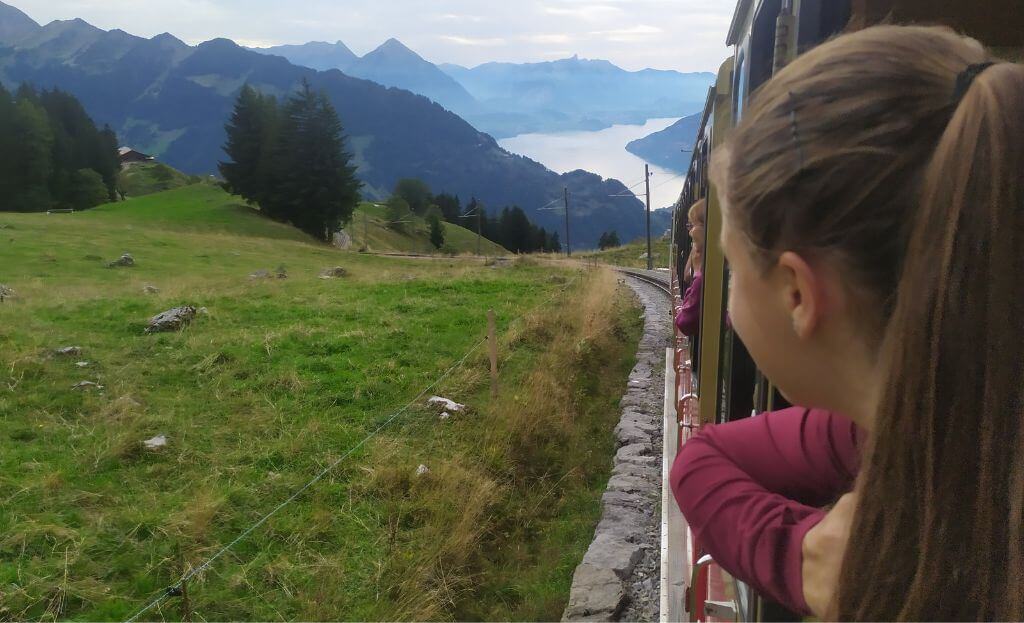
3. Get Saver Day Pass
If you only have one day in Switzerland , the best deal you can get is the Saver Day Pass. It’s a pass that you can use for all trains, buses, boats, and public transportation in cities in Switzerland. However, it’s not valid for mountains in Switzerland .
Let’s say you’re in Paris and want to visit Switzerland for a day . You arrive in Zurich and want to travel to Lucerne and take a boat ride on a Swiss Lake . After, you’ll stay overnight in Switzerland and leave the country the next day . In this case, Saver Day Pass will be the cheapest way to travel to Switzerland for you.
You can buy it on the official SBB website .
PRO TIP: The more in advance you buy the Saver Day Pass, the cheaper it gets.
👉 READ ALSO: Trains From Paris To Switzerland: Comprehensive Guide Fastest Way From Paris To Zermatt

4. Buy Single Train Tickets Online In Advance
If you only have to take a single train ride in Switzerland, there are two ways to travel on a budget . Get the SBB App and buy your ticket in advance through the app. It usually has cheaper train tickets .
➡ Check the Trainline website for the best deals.
I lived in Switzerland for 3 years . I got a seasonal/regional pass for every season to explore the places I wanted to. However, this pass wasn’t valid for train connections to other Swiss cities. So whenever I had to travel to other parts of Switzerland, I got my ticket on Trainline . It saved me hundreds of money.
So check it out, buy your single ticket online, save it to your phone , and travel. Have an ID or passport with you as they’ll check it on the train .
5. Get Regional Passes
If you only want to explore a specific region in Switzerland , the cheapest way to travel on a budget is to get a regional pass.
The most popular regional passes in Switzerland are:
- Jungfrau Travel Pass
- Berner Oberland Pass
- Lake Geneva-Alps Pass
- Zermatt Peak Pass
- Davos Klosters Premium Card
With these regional passes, you’ll explore the entire region using trains, buses, boats, and cable cars to the mountains free of charge .
These passes are the best way to explore a specific region if you’re staying longer and want to do at least 3 activities there.
👉 READ ALSO: Which Pass Is Best For Jungfraujoch? Which Pass Is Best For Schilthorn? Revealed! Jungfrau Travel Pass vs. Swiss Travel Pass

6. Plan Your Itinerary
Planning your itinerary always saves your travel costs . Your costs significantly decrease when you’re organized and know what you’ll do and where you’ll go.
For instance, if you purchase the Swiss Travel Pass and intend to see many places, you’ll need an itinerary to get the most out of your pass . The Swiss Travel Pass already saves you a lot, but you can waste it if you don’t plan .
Look up train departure times, boat timetables, and cable car duration, and organize your journey . You can see more within a day than if you don’t plan.
So plan your itinerary, be organized, and get the most out of your trip and a travel pass.
Travel Itinerary Planning Services

7. Go Camping/Stay In Hostels
Accommodation in Switzerland can get expensive. But if you know where to stay, you can travel to Switzerland on a budget and save on accommodation.
One of the cheapest ways to travel to Switzerland is to go camping. However, you don’t specifically have to stay in a freezing tent and be uncomfortable.
Some places have big tents (like a hostel) where you can stay. It has a regular bed, and it’s warm inside. The best is that you’ll save a lot rather than staying in a hotel.
PRO TIP: One such camping tent is located in Matten bei Interlaken . So you can stay there if you want to explore the Jungfrau region.

8. Stay In A Local Family
Another way to save on your accommodation and even get some pocket money is to help a local family and stay with them for a while.
I spent 14 days on a Swiss farm in the mountains above Lake Brienz at the age of 22. I stayed there for free and helped the family make cheese .
Every day, I woke up and fell asleep with stunning views of Lake Brienz. I learned how to make delicious Swiss cheese, helped the family, and got to stay in Switzerland for free.
And I even got some pocket money that I used after exploring Switzerland.
PRO TIP: You can find such stays on the Agriviva website or Workaway .
👉 READ ALSO: How Swiss Cheese Is Made – learn about my experience on a Swiss cheese farm

9. Avoid Restaurants
Restaurants in Switzerland are quite pricy. And honestly, many are average, and the food is not good. Of course, if you want to try Swiss fondue , a typical dish, the way to go is to eat in a restaurant .
However, you don’t have to eat in a restaurant every single time during your trip. Instead, go to a supermarket , make a sandwich, or buy stuff for the day.
You can also picnic in the mountains or near the beautiful Swiss Lakes. And it’ll be a much more enjoyable experience.
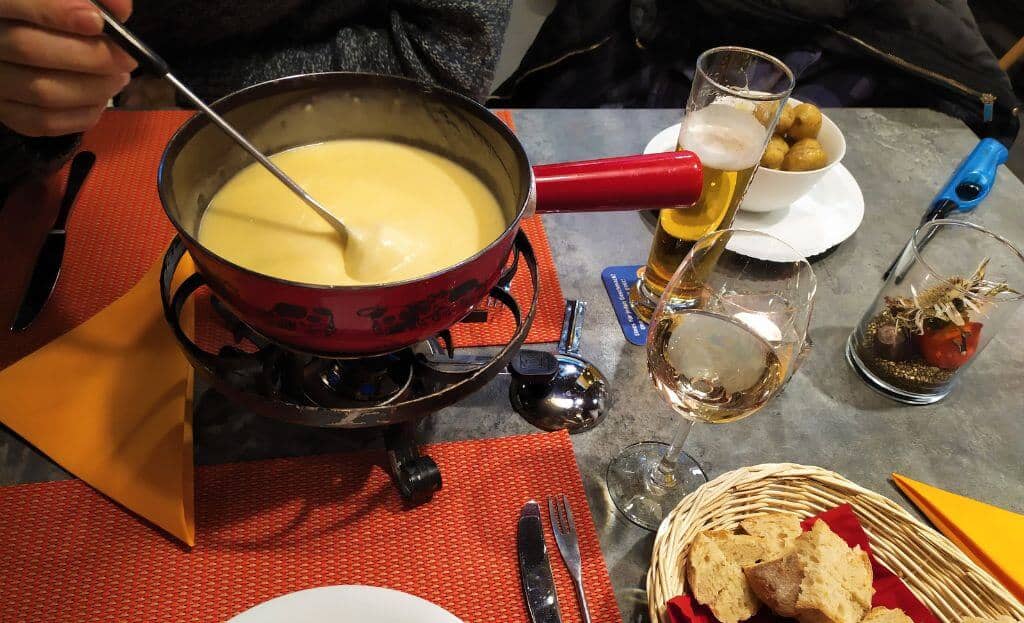
10. Find Local Markets
Some places organize local markets, where you can taste samples of typical food and support local communities . So check the area you’ll visit in Switzerland and whether they organize markets when you’re there.
It’s a cheaper and better alternative to eating in a restaurant.
11. Bring Your Water Bottle
Switzerland has the best water ever . No wonder vast mountains and glaciers surround you. So the water is clean and comes directly from pure nature. So take advantage of it and bring your water bottle.
There is no need to buy bottled water in a supermarket in Switzerland. The best way to go is to drink tap water . Or you can also drink the water from springs when hiking in Switzerland.

👉 READ ALSO: Switzerland In November: Best Things To Do & See
Practical Tips For Visiting Switzerland
I’ve got some further tips to help you plan your trip to Switzerland. See what month is best to come, budget you’ll need, and get my free packing list below:
What Month Is Best To See Switzerland
The best months to see Switzerland are June and September .
In June , everything is beautifully green: hills are full of mooing cows, rivers are full of blue waters from the melting glaciers, mountains are still snowy, and waterfalls are falling off steep rock cliffs. It’s also much less crowded than in the summertime (July & August).
September shines with autumn colors , and Switzerland gets a slight upgrade. It’s a beautiful month; everything calms down after the busy summer season, and the landscape views are spectacular. However, it can snow towards the end of September, but it’s not usual.

What Is The Best Way To Get Around Switzerland
The best way to get around Switzerland is through public transportation : trains , buses, boats, and cable cars . This way, you’ll enjoy the breathtaking scenery and soak in the atmosphere.
The best way to use public transportation on a budget is to purchase a Swiss Travel Pass or a Half-Fare Card . They’ll help you save 50% of your travel costs in Switzerland. Check out the list of cheapest ways to travel Switzerland to learn more about these travel passes.

How Much Should You Budget For A Trip In Switzerland
I’ve created a simple table for you comparing costs in Switzerland or individual travel items. Check it out below so that you know what budget you need for your Swiss trip.
Overall, you’ll spend around 100 Swiss Francs per day if you want to travel to Switzerland on a budget and still enjoy some attractions.
How Expensive Is Switzerland?
I’ve also written a separate article about expenses in Switzerland . It’s a detailed guide on budgeting your trip, how much things approximately cost, and what you can expect. It also covers the cost of living and further useful tips .
Check it out by clicking on the image below :

Get My Switzerland Packing List
Packing for a Swiss trip might be challenging because you have to prepare for all kinds of weather conditions . Nevertheless, I packed everything into a backpack for my month-long trip to Switzerland . And I want to help you with packing.
So get my Switzerland packing list for free, save time, and don’t overpack

I’ve also answered some of the frequently asked questions to help you plan your trip to Switzerland and create the best experience for you. So check them out below.
Is It Possible To Travel To Switzerland On A Budget?
Yes, it’s possible to travel to Switzerland on a budget. The most important thing is to get a travel pass , plan your journey , and avoid eating in restaurants all the time. This is the best way to travel to Switzerland on a budget.
What Is The Cheapest Way To Travel To Switzerland?
The cheapest way to travel to Switzerland is to buy a Swiss Travel Pass , Half-Fare Card , or a regional pass . With travel passes, you’ll save time and see the entire Switzerland.
If you stay in Switzerland longer and want to see many places , buy a Swiss Travel Pass .
If you have a shorter itinerary and only want to check some places off your bucket list, opt for Half-Fare Card . Get a regional pass if you only want to visit a specific region (e.g., Jungfrau region).
How Many Days In Switzerland Is Enough?
Switzerland is a beautiful country and offers many things to do. An optimal number of days to stay is between 8 to 14 days .
8 days is the shortest time to explore the highlights of Switzerland. If you want to see different regions and spend some time hiking, staying 10 to 14 days in Switzerland is best .
How Much Does It Cost To Spend 10 Days In Switzerland?
If you have a 10-day itinerary, plan to spend between 2000 CHF and 3000 CHF for the entire trip. It might seem a lot, but it’s considering that you’ll get the most out of your trip , do all the sightseeing activities and things the country offer, and eat well.
If you’re on a budget , you can plan to spend around 1000 CHF during 10 days in Switzerland.
What Is The Best Way To Tour Switzerland?
The best way to tour Switzerland is by train. Get a Swiss Travel Pass and explore all the corners of Switzerland. The best is to follow the Grand Train Tour of Switzerland on your own to see all the Swiss highlights. This way, you won’t miss anything important and will get the most out of your Swiss Travel Pass.
How To Travel Around Switzerland By Train?
The best way to travel around Switzerland by train is to follow the Grand Train Tour of Switzerland . It’s a designed itinerary by the Swiss tourism board to explore the highlights of Switzerland.
To get the most out of train travel, the best way to get around is to use a Swiss Travel Pass . It’ll give you flexibility, free travel on trains, buses, boats, and cable cars, and save you 50% off your travel costs.
Wrap-Up: 11 Cheapest Ways To Travel Switzerland On A Budget
These are the 11 cheapest ways to travel Switzerland on a budget. I hope it’ll help you plan your Swiss itinerary and get the most out of your trip to Switzerland. Switzerland is not the cheapest country in Europe, but you can significantly save costs .
The most important thing is to plan your journey , choose a good travel pass that suits your travel, and save up on food in Switzerland. This way, you’ll be able to travel Switzerland on a budget.
If you have any questions or need help planning your trip to Switzerland, contact me at info(at)voicesoftravel.com . I’ll gladly help you.
Happy Travels!
More Tips For Switzerland Travel
Looking to visit more places in Switzerland? Check out my related articles:
Best Of Switzerland Itinerary: 8 Days By Train
3 Days In Switzerland: 11 Itineraries For All Travelers & Seasons
Honeymoon In Switzerland: How To Plan Your Romantic Gateway
Best Time To Visit Switzerland
22 Amazing Day Trips From Interlaken
23 Incredible Things To Do In Jungfrau Region
Is Jungfraujoch Worth It? Ultimate Guide
5 Best Panoramic Trains In Switzerland
8 Best Mountains In Switzerland To Visit
Jungfrau Travel Pass vs. Swiss Travel Pass
Swiss Travel Pass: Unlimites Travel In Switzerland
Brienz Switzerland: Best Things To Do & Places To Visit
Grindelwald In Winter: Complete Guide For Your Visit
Does Switzerland Use The Euro? Revealed!
How Swiss Cheese Is Made
Switzerland Vs. Austria: Which Is Better To Visit?

About the author: Nicoletta is a travel enthusiast and passionate language learner. While traveling, she loves to connect with locals using her language skills to learn about new cultures. Look for her skiing, hiking in the mountains, or exploring new destinations as she designs travel itineraries for her clients.
SWITZERLAND : Interested in more articles for Switzerland? Check out my Switzerland Travel Page .

You Might Also Like

How To Get To Ometepe Island: Full Guide!

Is It Safe To Fly From Lima To Cusco In 2024? Revealed!
![how to travel cheap switzerland Read more about the article 9 Medieval Castles In France You Must Visit To Perfect Your Itinerary [2024]](https://voicesoftravel.com/wp-content/uploads/2022/04/medieval-castles-in-France-300x213.jpg)
9 Medieval Castles In France You Must Visit To Perfect Your Itinerary [2024]
Leave a reply cancel reply.
You must be logged in to post a comment.
Cookie policy

Switzerland on a Budget: 10 Essential Tips
By: Author Alpaca The Bag
Posted on Last updated: April 17, 2023
Switzerland is notorious for being at the top of every “Most Expensive Country in the World” list, making it exceedingly difficult to travel Switzerland on a budget. But that doesn't have to be the case.
Even the most budget-conscious traveler should have Switzerland on their bucket list. Switzerland is full of dramatic landscapes that can take your breath away.
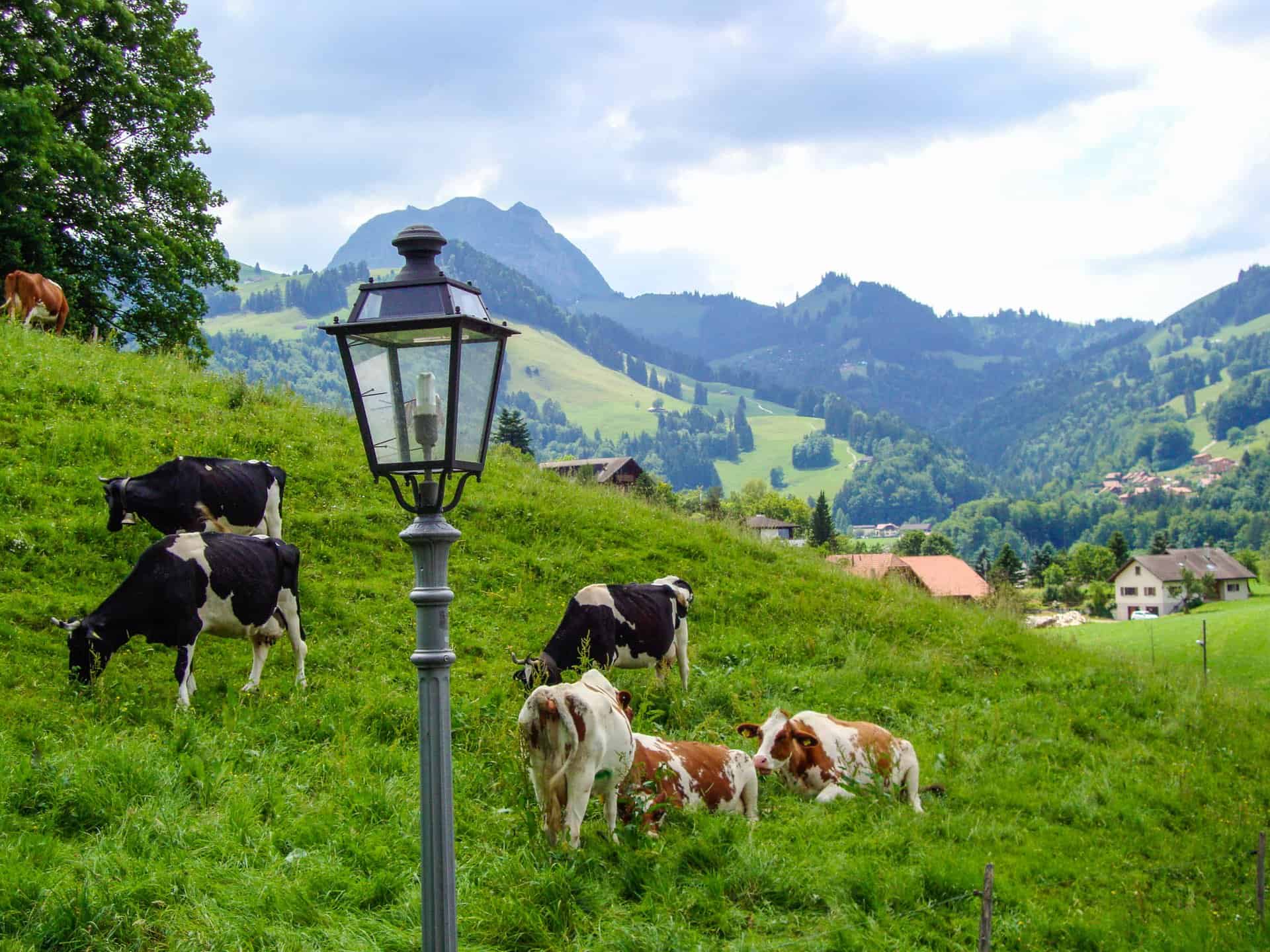
It's where you find lush green rolling hills that have quaint little chalets with cows roaming freely around them. It's where mountains meet lakes, and you can eat endless amounts of delicious chocolate and cheese.
It almost seems too beautiful to be a real place. If these aren't reasons enough to want to pack your bags right now, we don't know what are!
Need airfare? Find cheap flights and more at Travelocity.com .
Want to travel around Switzerland by car? Find the best car rental service at Traserbas.com .
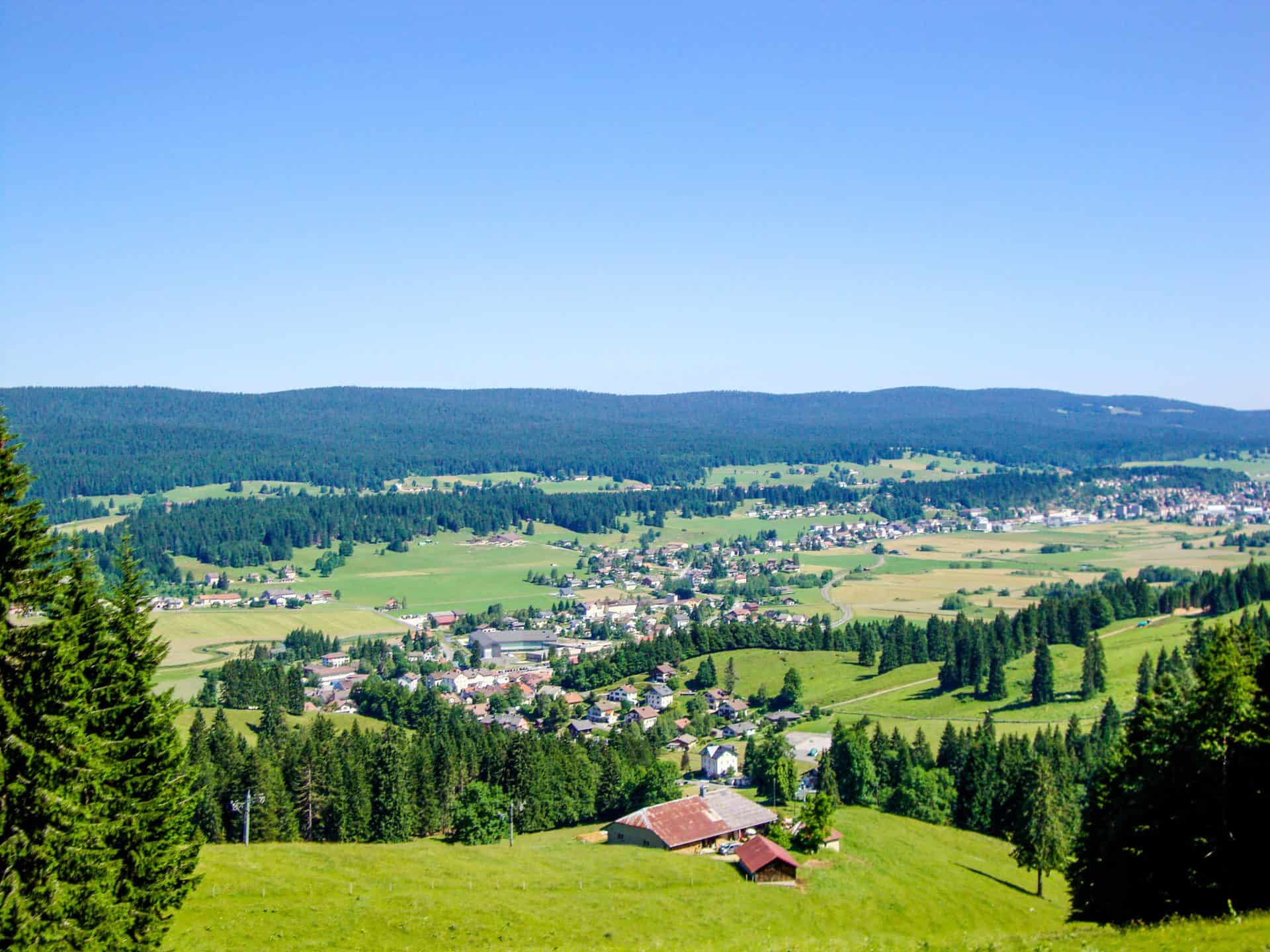
So how do you visit one of the most expensive countries in the world without breaking the bank?
It's easier than you might think. Here are ten helpful tips to keep more money in your pocket while still traveling to the beautiful country of Switzerland.
Table of Contents
1. Spend More Time in One Place
2. skip staying in the major cities, 3. cheap or free accommodations, 4. buy food at a grocery store, 5. buy souvenirs at grocery stores, 6. drink tap water, 7. visit free museums, 8. free outdoor activities, 9. avoid high seasons, 10. invest in a travel pass, how to travel switzerland.
Switzerland is a tiny country. Consider setting up a home base for yourself so you can explore the best places in the rest of the country from there.
Usually, the longer you spend in one place, the better the nightly rates for accommodations. This typically holds true whether you're staying at a hotel, youth hostel, Airbnb , etc.
Some hotels or hostels will even give you a free local transit pass, so check when booking.
Switzerland is a small, steep country, much more up and down than sideways, and is all stuck over with large brown hotels built on the cuckoo style of architecture. Ernest Hemingway
See also: Travel Credit Cards for Beginners
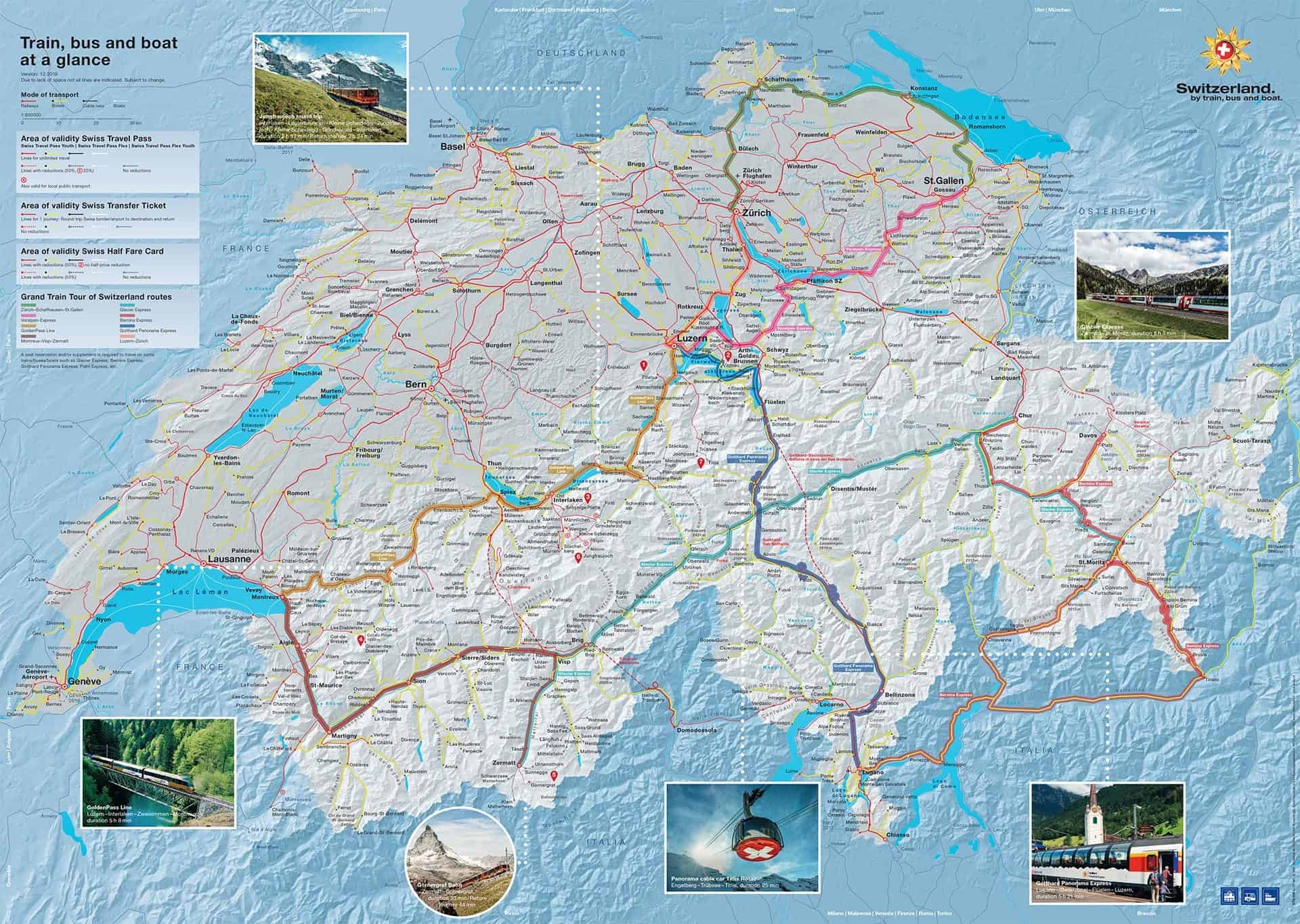
There are benefits to staying in major Swiss cities. Proximity to everything allows easy access to museums, shopping, and nice restaurants, but people come to Switzerland for the views.
Switzerland has some of the most beautiful landscapes in the world, so visit and stay in a town with views.
It will be less expensive, and you're more likely to get the picture-perfect postcard version of Switzerland that you're seeking.
You also don't need to go very far outside the cities to get spectacular views. Train travel is a popular way to get around in Switzerland, so it's easy to get places even when staying outside the main cities.
Check out the Swiss Railways website to get an idea of what small towns fall on the major train lines, prices for train tickets, train stations, etc.

Nowadays, budget travelers have so many options in finding a place to stay.
You're no longer limited to choosing between a hotel and a hostel. You can now rent peoples' apartments or private rooms or even stay on someone's couch.
However, our two recommendations to experience Switzerland on a budget are Workaway and Sleep on Straw.
Workaway is an exchange program that, in return for a few hours of work a day, you have your housing covered (and, in some cases, a few meals).
You can do various tasks, from working with schools, animals, or even farming.
This is an excellent program because it gives you a real, local experience, and you are giving back to the community you are visiting! Plus your accommodation is free.
There are also several other options when it comes to work, with Switzerland being one of the best countries to teach English to keep the funds topped up.
Sleep on Straw
Farms in Switzerland started opening up their doors and letting travelers experience a night sleeping on fresh straw.
It has become trendy over the summer months and can start at 6 Swiss Francs ($6) a night.
What better way to experience Switzerland than waking up on a farm and walking outside to enjoy the mountains.
As with anywhere you stay, do your research. It doesn't matter if it's a hotel, Airbnb, Workaway, or Sleeping on Straw — read traveler reviews.
You might save a buck in the end, but if you end up being miserable because you didn't read reviews, it won't be worth it.
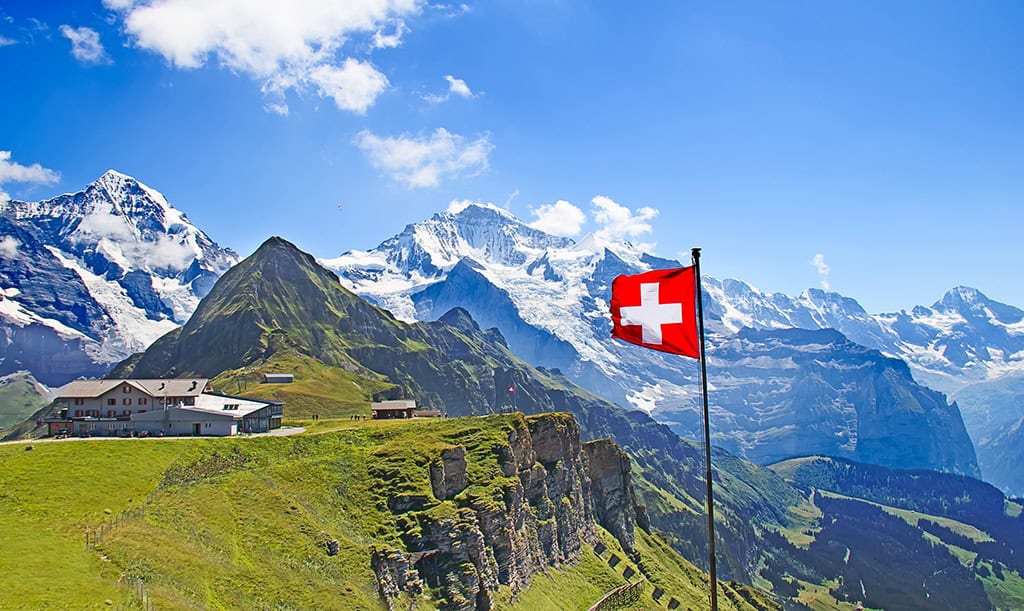
Switzerland is one of the most expensive destinations for dining out; it's cheaper to buy your meals at grocery stores.
This is not news to budget travelers. However, there are cheaper grocery stores where you get more for your money.
The two major grocery stores in Switzerland are Migros and Coop. The cheaper budget grocery stores are Aldi, Denner, and Lidl.
Stock up on white wine, cheese, and bread, and use it as an opportunity to make fondue !
Another option is to buy “ugly fruits and vegetables” from Coop.
Coop began selling “wonky” produce at reduced prices to reduce food waste. The produce is naturally deformed but does not have any defects in taste.
Just because they aren't pretty doesn't mean they don't taste good.
While you're buying your lunch at a grocery store, why not buy your souvenirs too? That Swiss chocolate may be half the price in a grocery store versus a tourist spot.
Many grocery stores in the larger towns often have a Switzerland souvenir section where you can buy chocolate, cheese, cowbells, ornaments, magnets, etc.

Not only is food expensive in Switzerland, but drinks are too (including bottled water).
Luckily, Switzerland has some of the cleanest water available. There are fountains everywhere that you can use to fill up your water bottles.
Whatever city you end up visiting, check what local museums they have, and if they're free, have days with free entry to visit or offer other discounts.
There are so many free museums in Switzerland. Below is a list of some of the more popular ones in Geneva and Zurich.
Free Geneva Museums and Sites
- Natural History Museum
- Art and History Museum
- ICT Discovery
- Tavel House
- Botanical Gardens and Conservatory
- Ariana Museum
- Museum of the History of Science
- Carouge Museum
- The Museum of Ethnography
Free Zurich Museums and Sites
- Zoological Museum
- Augusto Giacometti Entrance Hall
- Museum of Modern Art (Free on Wednesdays)
- Museum of Anthropology
- Botanical Gardens
- Fluntern Cemetery (Visit James Joyce's grave)
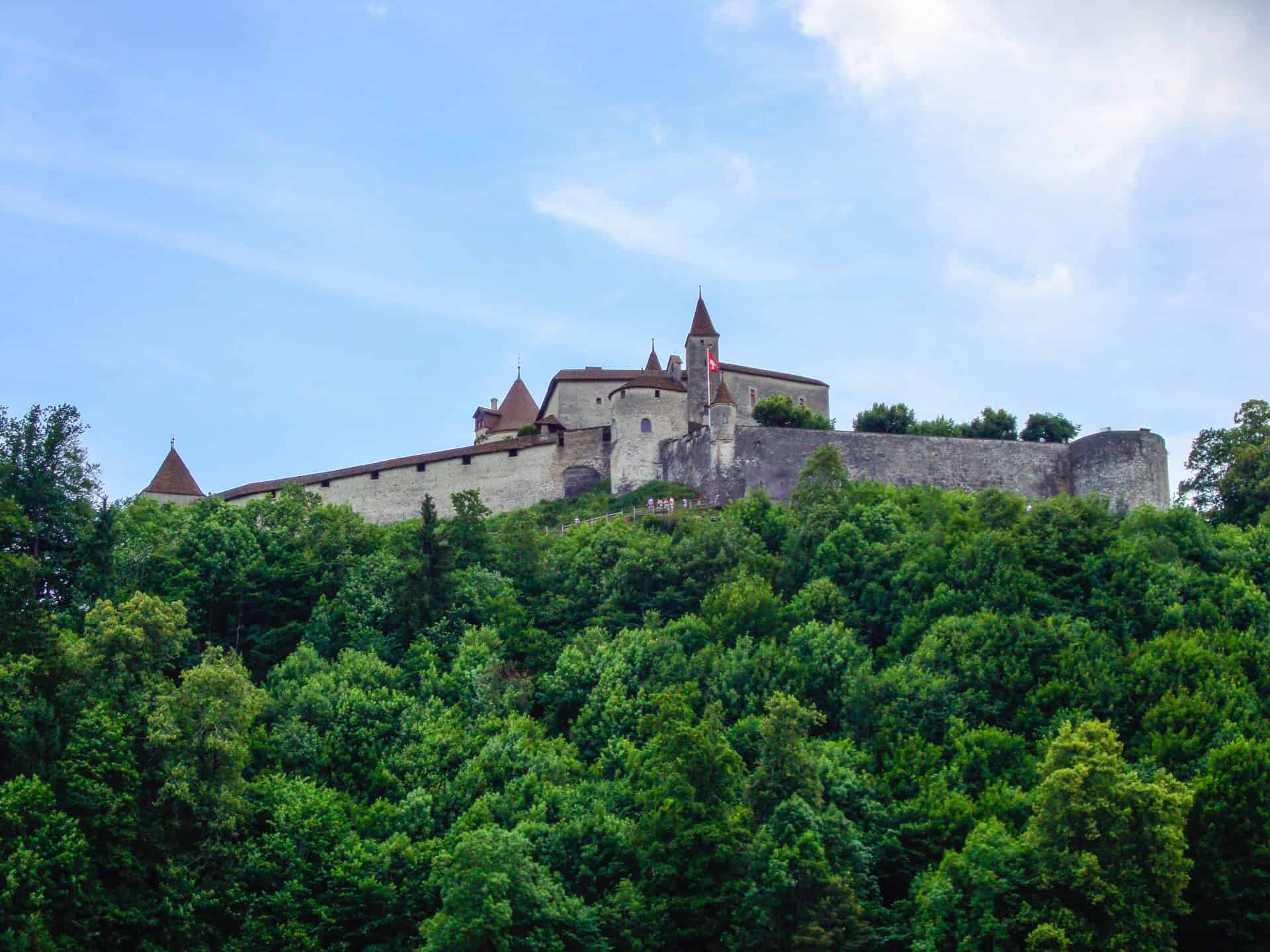
There are so many enjoyable outdoor activities in Switzerland that don't cost a dime.
Hiking is one of the major activities (the other being skiing) that Switzerland is known for. You could easily spend your whole visit hiking and be perfectly happy.
There are quite a few lakes in Switzerland and plenty of places where you can enjoy a swim in them too. They can be a little chilly sometimes!
Explore Historic Towns
Like many European countries, Switzerland is full of ancient and historic towns that you can explore.
Pop into the town's cathedral for a chance to see some beautiful art. A couple of must-visit towns are Gruyères and Altstadt.
One of the best things to do in any country is to participate in a festival. You can see the local culture at its best and usually get fireworks, music, etc.
Free Walking Tours
There are quite a few cities that offer free walking tours . They are run by volunteers and usually provide a couple of tours every day in several languages.
Cheese Making Tours
Depending on the area you choose to visit, small-town cheesemaking farms often will happily show you around and let you see how they make their cheese.
There are also larger factories that give public tours for usually a small price (around 5 Swiss Francs, or $5).
Related: Food Experiences in Emilia-Romagna
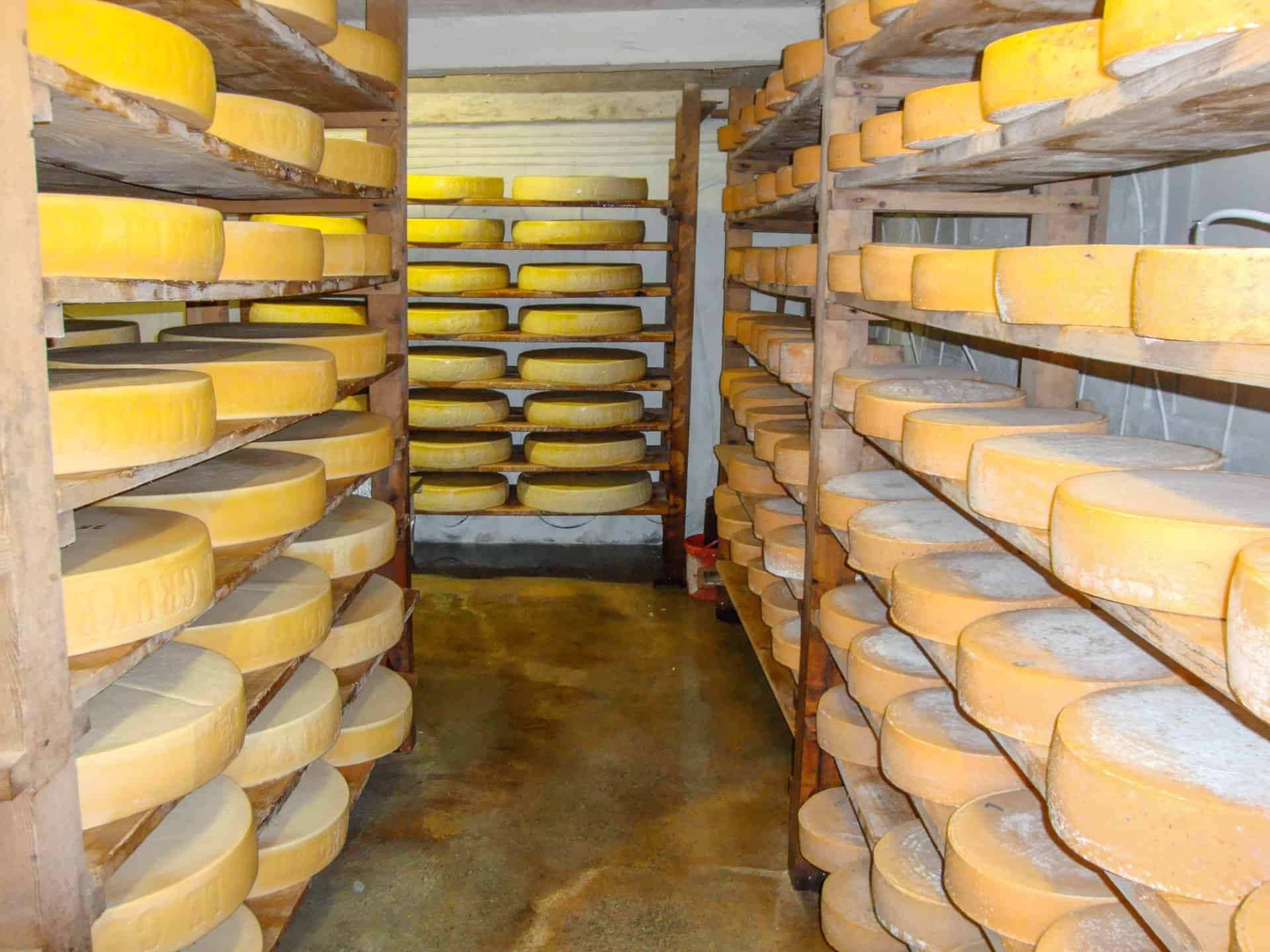
There is no wrong time to visit Switzerland, but the high seasons for visitors are summer and winter .
The best time to visit, and get the most for your money, is during the shoulder months of spring and fall.
Accommodations will be cheaper, and there will be fewer travelers visiting.
If you choose to travel during spring or fall, and hiking is on your list of activities, check and see if trails are open while you are there.
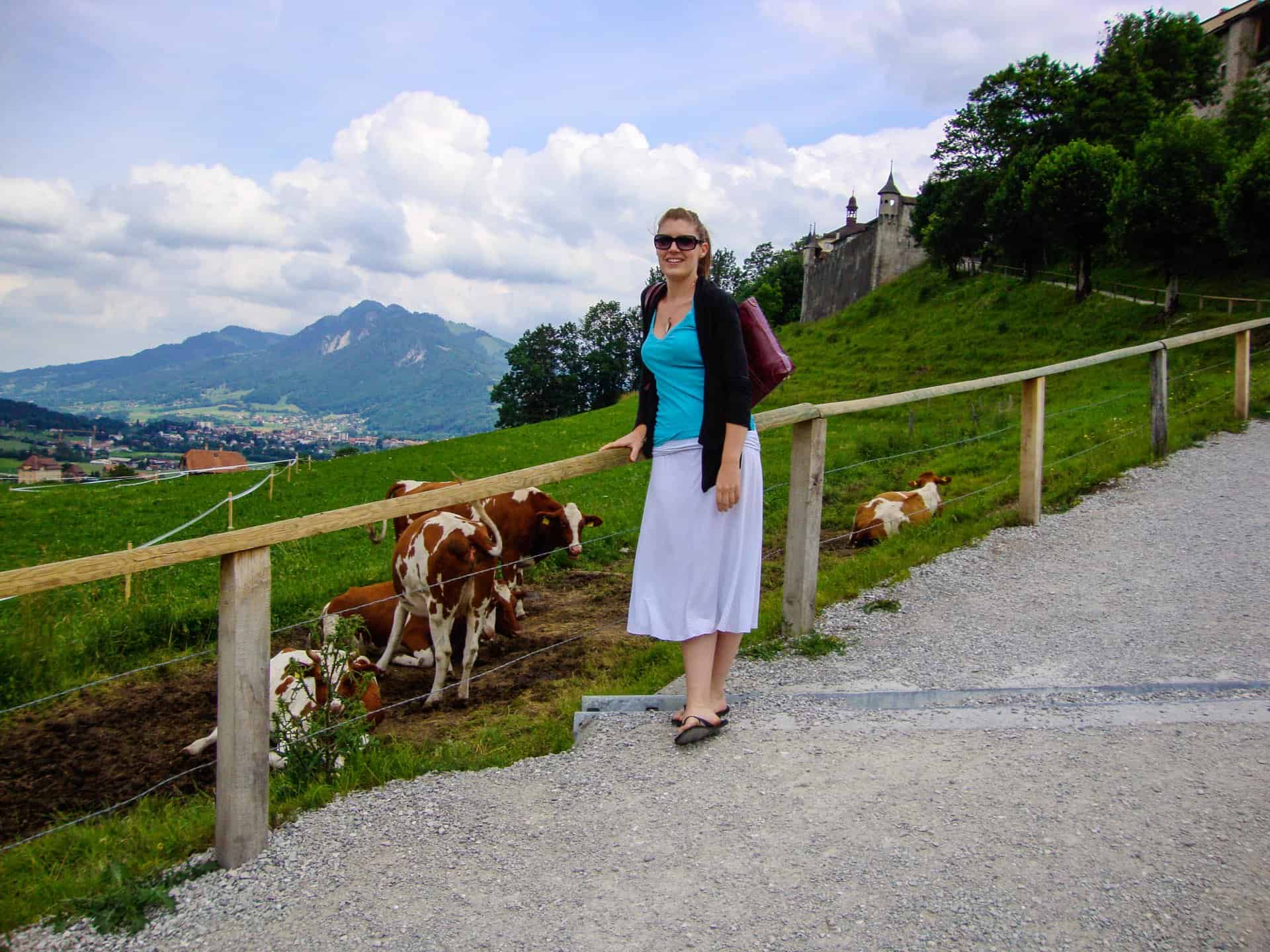
Travel passes can save you a lot of money, but you must first determine if it's the right pass for you.
If you don't use passes to their full potential, they can be more expensive for you in the long run.
Swiss Travel Pass
The Swiss Travel Pass gives you almost complete access to the country, entry to about 500 museums, train, bus, and boat tickets, etc. Again, this can save you money, but it can cost you too.
If you don't have a plan or itinerary for what you want to see, it may end up being more expensive for you.
Swiss Half Fare Card
The Swiss Half Fare Card allows visitors to buy train, bus, or boat tickets for half price for up to a month.
If you choose this option, there is very little difference between 1st and 2nd classes, and it's recommended to buy the 2nd class ticket.
Supersaver Tickets
Supersaver tickets are not a pass per se, but when you buy a train ticket online, you can sometimes buy a supersaver ticket instead.
These tickets are the cheapest available because they are offered at times when fewer people travel.
Swiss Coupon Book
The Swiss Coupon Book offers discounts and a lot of 2-for-1 deals. You can view the deals before purchasing the book.
This is not as popular as the other passes since you probably won't be able to use all the coupons to make it worthwhile. However, if you are in the country for a more extended period, it may make sense to buy the coupon book.
Student Passes
If you're a student or are under the age of 18 (and sometimes under 26), you may be able to get student discounts while traveling.
There are many ways to make a trip to Switzerland come to life without going broke.
Whether you're an outdoor adventurer or a history buff, there is plenty in Switzerland that you can do and still have extra money in your pocket after your trip.
Now all you need to do is grab your passport and travel!
We hope this guide to traveling to Switzerland on a budget has helped inspire you to plan a trip.
If you'd like to go but not alone, consider a small-group tour with G Adventures :
Trekking Mont Blanc is a challenging 10-day high-altitude adventure in the Alps. You'll start trekking in Chamonix, France, and pass through Italy and Switzerland as you make your way around Mont Blanc. The trip ends in Chamonix.
London to Rome: Picnics & Pizza is a quick 7-day rail journey from London to Rome, including a stop in Interlaken, Switzerland.
We are pun-loving, enthusiastic travelers combining our passion for travel with the idea of helping others realize their own travel plans! Check us out at alpacathebag.com.
Planning a trip? Go Backpacking recommends:
- G Adventures for small group tours.
- Hostelworld for booking hostels.
Sadye Reish
Sunday 3rd of September 2017
Nice work you guys!!!
Wednesday 30th of August 2017
Switzerland is an amazing place.We can enjoy the nature.Thanks for sharing this post.
How To Visit Switzerland On A Budget By A Local [2024]

By Gemma Tedaldi | Published: 2nd February 2024 | Updated: 16th February 2024

Switzerland is notorious for being an expensive country to visit, let alone live in, (since moving here a few years ago we have avoided certain foods like the plague because of the cost – we’re looking at you chicken!), but you can still visit Switzerland on a budget and not break the bank in the process. With some careful pre-planning and booking before your visit, you can still enjoy a wonderful trip to this incredible country.

Table of Contents
Is Switzerland Expensive? Can you really visit Switzerland on a budget?
15 switzerland on a budget tips, average costs in switzerland, switzerland on a budget faqs, planning your trip use our favourite travel resources below:.
Accommodation: We recommend Booking.com
Rental Car: We recommend Rentalcars.com
Flights: We recommend Kiwi.com
Tours: We recommend Get Your Guide
Switzerland can most definitely be done on a budget, you just need to plan ahead and visit at certain times of the year. We have been living in Switzerland for a few years now, and although we do still have the occasional, ‘How much!?’, moment, we have definitely learnt a few tips and tricks that make travelling around Switzerland and in general just visiting Switzerland more budget-friendly.

1. Travel in the shoulder seasons of spring or autumn
Consider visiting Switzerland in one of its shoulder seasons, either spring or autumn , as accommodation prices and flights can be much cheaper than during the peaks of summer and winter. We have taken flights between Switzerland and the UK in spring for as little as 38 CHF / 35 GBP / 40 Euros return, and the same flight in winter has cost upwards of 163 CHF / 150 GBP / 170 Euros one way!
If you would rather visit Switzerland in the summer or in the winter then check out our posts on those seasons as well.

2. Book accommodation in advance
This kind of goes without saying, but the sooner you book your accommodation the cheaper you are likely to get it. If you try to book the night before or even a week before, you may be left with slim pickings in terms of choice and be forced to book into somewhere a bit more expensive than you had anticipated. This is especially important if you are planning on visiting a well-known destination or during an event such as Fasnacht in Basel .
3. Utilise budget accommodation options
Staying in hostels and at campgrounds is a great way to save money on accommodation as many have cabins and bungalows for cheap stays. These prices can also be more affordable as they are often near popular destinations but on the outskirts of a city or in a small town or village

4. Stay in one location and do day trips from there
This kind of goes hand in hand with booking your accommodation in advance, but often in hotels and guest houses the longer you stay the more you can potentially get discounted nights at your accommodation. Some accommodations in more touristy destinations also occasionally have a minimum number of days you can stay with them anyway, so why not make the most of it and stay at one place taking day trips to nearby locations before moving to the next destination.
5. Avoid staying in the centre of cities
Avoid staying in the centre of main cities and instead opt for the outskirts, or just off the main centre of the city, as not only will these locations still accessible by tram or bus, but they are more often than not cheaper than if you stayed in the centre with a view over a landmark. For example, if you were to stay in Basel overlooking the river it could cost you upwards of 190 CHF per night, but if you choose to stay closer to the train station it can be around 140 CHF per night.

Planning your own trip to Switzerland? Make sure you check out our Travelling Tedaldi Amazon Store Travel Guides for all your guidebooks and maps. (We’ve done the hard work for you and linked all the things we used to plan our trip!)
6. Get City tourism cards / city guest cards / Free Public transport / bikes
Many cities and towns throughout Switzerland offer a Guest Card for staying with them, which gives you free, or at least very discounted, rates on the local public transport as well as local attractions. We have utilised these cards in Basel , Interlaken and Lauterbrunnen , and they are really fantastic ways to save a bit of money without even trying.
7. Swiss Travel Pass – To buy or not to buy!
The Swiss public transport system is known for being good, with nearly everything running on time and with fantastic connections throughout the country by train, tram, bus and boat. So is a Swiss Travel Pass worth getting for your visit? If you are planning on moving around a lot and sticking to the well-known locations with good public transport connections then it may be worth it, but with prices starting at 245 CHF for 3 days, and going up to 755 CHF for 15 days, you have to make sure that you will really utilise it.
Buy your Swiss Pass here


8. Book any train passes in advance
If you choose not to opt for the Swiss Travel Pass then your other option for some reduced travel costs is by getting a Saver Day Pass . Even as residents in Switzerland we regularly use the Saver Day Pass for day trips as if you book in advance you can get it for as little as 39CHF, and it gives you free travel on nearly all trains, trams, buses and boats as well as a few funicular railways and cable cars as well. This can easily add up to over 100 CHF if you were to do it by buying tickets as you go, so the Saver Day Pass is well worth it!
9. Rent a car to save on train passes
If there is a group of you visiting Switzerland and you don’t mind driving, (which, let’s be honest, is quite frankly incredible to do through Switzerland!), then renting a car is a great option to save on train passes for the entire group, even more so if you plan to get a little off the beaten path exploring. If you are only planning on visiting cities however then this isn’t such a great option as city centre parking can get quite expensive / is often difficult to find.
We can highly recommend booking a rental vehicle through Rentalcars.com , we have used them numerous times over the years and they are always just what we need as well as affordable.

10. Free drinking water
Most fountains throughout Switzerland provide clean and safe-to-drink water, fresh from the mountains! So be sure to bring a reusable bottle with you on your trip, or even purchase one in Switzerland as water can be rather expensive to buy otherwise. Pro tip – don’t ever order water for the table in a restaurant, not only will it be one of the most expensive drinks on the menu, but why pay for it when you can get it for free from a fountain outside!
11. Don’t eat out for every meal
One of the biggest budget killers in Switzerland is eating out for every meal. Instead, buy breakfast from a local cafe or bakery, grab food for a picnic from Migros, Coop or Bretzelkönig, (they do reasonably priced and tasty sandwiches, salads and snacks, or you can eat in some of the larger stores which have food court) and then either eat out in the evening or opt to cook your own meal if you have accommodation with kitchen facilities.

12. Too Good To Go
If you would really like to eat out often and are staying in, or even travelling through, a city then a great option for reduced-cost food is to get the Too Good To Go App, which connects you with discounted food across the city. Anything from local delicacies, to fast food, and supermarket takeaway food to restaurants that have too much left over at the end of the day. You can easily get a real deal for your money, as long as you are willing to have some unknown food.
13. Museums & gallery events
Some museums and galleries have free entry or discounted entry on certain days of the week or month, with some even having special events where you can pay a one-off admission fee and have entrance to multiple locations. The Museum Nacht in Basel is one of these events, and not only gives you reduced admission to museums, but they are also open until 2 am allowing you plenty of time to really experience them!

14. Free walking tours
Often when visiting a city for a short amount of time you really want to learn about the history and see the main sights in a short amount of time, that is where free walking tours come in. These are often held on different days throughout the week depending on the destination but are a great way to learn about the city from a local.
15. Visit the free things – the landscape!
Yes, it is all well and good visiting the ‘ Top of Europe ’, but when it costs anything from 95CHF each on top of any day passes you may have bought, you can easily spend that money on numerous other things and visit some more cost-effective, authentically Swiss and even free attractions instead.
Many incredible destinations in Switzerland are free to enjoy and it is only the cost of public transport there that you need to worry about. Some of our favourite trips in Switzerland have been when we have hiked out to relatively unknown locations to tourists, such as Zug , Niederhorn and even Mount Rigi .

📍 Cup of coffee – anywhere between 5 and 10 CHF depending on the size, (Starbucks is the most expensive place for coffee so be sure to opt for a local cafe or coffee shop instead.
📍 Glass of wine – from 7 CHF upwards depending on the wine, if it is local or not etc and the size of the glass, You can buy a small ‘takeaway wine’, (called Wine & Go), in Coop for around 4.50 CHF however, which is again perfect for sitting and enjoying the sunshine with!
📍 Local beer – a local beer in a bar is roughly 7 CHF, but if you head to Coop you can get a can of beer for around 2.30 CHF, (perfect for a drink in the sun overlooking a river or lake!)
📍 Take away sandwich – anywhere from around 5 CHF to 9 CHF depending on the filling. We would recommend going to Bretzelkönig for some delicious and reasonably priced baguettes and bretzels.
📍 Meal in a restaurant – a main meal in a restaurant can be anything between 20 and 30 CHF at lunchtime, depending on the dish, but between 20 and 50 CHF in the evening. You can easily rack up a 100 CHF bill for a three-course meal with a drink.

How much budget do I need for a trip to Switzerland?
This is slightly dependent on how long you plan to stay in Switzerland and where you plan to visit, as obviously the longer you stay the more it will cost and if you plan on visiting typical tourist destinations or cities only, then again it will be more expensive. On average we would suggest it costs around 100 – 130 CHF per day, not including accommodation which could cost another 100 CHF or more depending on the level of accommodation you are staying in.
How to survive in Switzerland on a budget?
The best thing to help ‘survive’ a trip to Switzerland on a budget, is to plan in advance! We cannot stress this enough, but if you plan in advance you will without a doubt save some money before you even get to Switzerland.
What is the cheapest city to visit in Switzerland?
Switzerland isn’t known for being cheap, and the cities are no different. The main cities of Basel, Bern, Lucerne and Zurich are some of the most expensive places to visit unless you are staying overnight and can take advantage of a city card. The cheapest city to visit in Switzerland is not really known, as there are so many variants as to what can make it cheap to visit, but generally, the areas around the Jura , Neuchâtel and Thurgau are deemed some of the cheapest.
Conclusion: Switzerland On A Budget
Switzerland is well known for being one of the most expensive countries to visit in Europe, (if not the world!), but it is still possible to enjoy a trip to Switzerland on a budget. Not only can you visit Switzerland without breaking the bank but you can have an incredible trip at the same time.

Gemma is the owner and author of The Travelling Tedaldi, a travel blog helping travellers to discover the best road trips and travel itineraries throughout the UK and Europe. When she isn’t writing about her favourite travel destinations, she can often be found out exploring local hikes or planning future trips.
Switzerland on a Budget: Tips For Cheap Travel
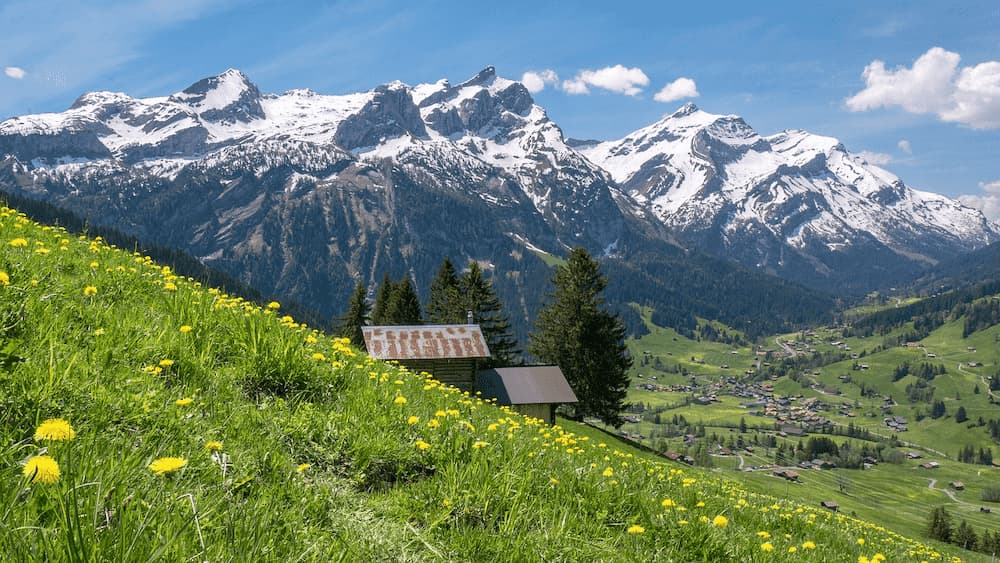
Wondering if it’s possible to travel to Switzerland on a budget? Of course, it is, but it depends on what your budget is. While the country can be explored without ludicrous amounts of money, it’s important to keep in mind that it’s still one of the most expensive countries in the world and is far from cheap.
But there are ways to save money while traveling in Switzerland, and I want to tell you all about them. From finding cheap flights to getting the best exchange rates for Swiss Francs; here’s everything you need to know about traveling to Switzerland on a budget!
Table of Contents
Typical Cost of Traveling in Switzerland

The typical cost of traveling in Switzerland depends on many different factors. The main thing to consider is what you’re going to spend money on – are you fine staying in one place the entire time, or do you want to ride trains to explore more destinations?
Would you prefer to pay more for a hotel and save money on going out, or vice versa? Or are you looking for the most budget experience all around? The average cost of a trip to Switzerland is:
- Budget: 100-200 CHF per day
- Mid-Range: 200-400 CHF per day
- Luxury: 500+ CHF per day
Keep in mind that it depends on so many things. If you can get cheap plane tickets, sleep on someone’s couch for free, eat only home-cooked meals, and pay only for attractions and train tickets, you can get costs under 100 CHF per day.
Finally, I highly recommend you set apart a budget for iconic Swiss landmarks. Schilthorn , Jungfraujoch , Titlis , Pilatus , and other mountains are very expensive to visit, but worth every penny because it’s an experience unlike anything else.
If you have to prioritize what to spend money on in Switzerland, I say eat sandwiches the entire time you’re there but splurge for access to visitor’s centers in the mountains. What’s the point of traveling to a country with such stunning natural landmarks if you’re not going to visit any of them?
Can You Travel to Switzerland on a Budget?
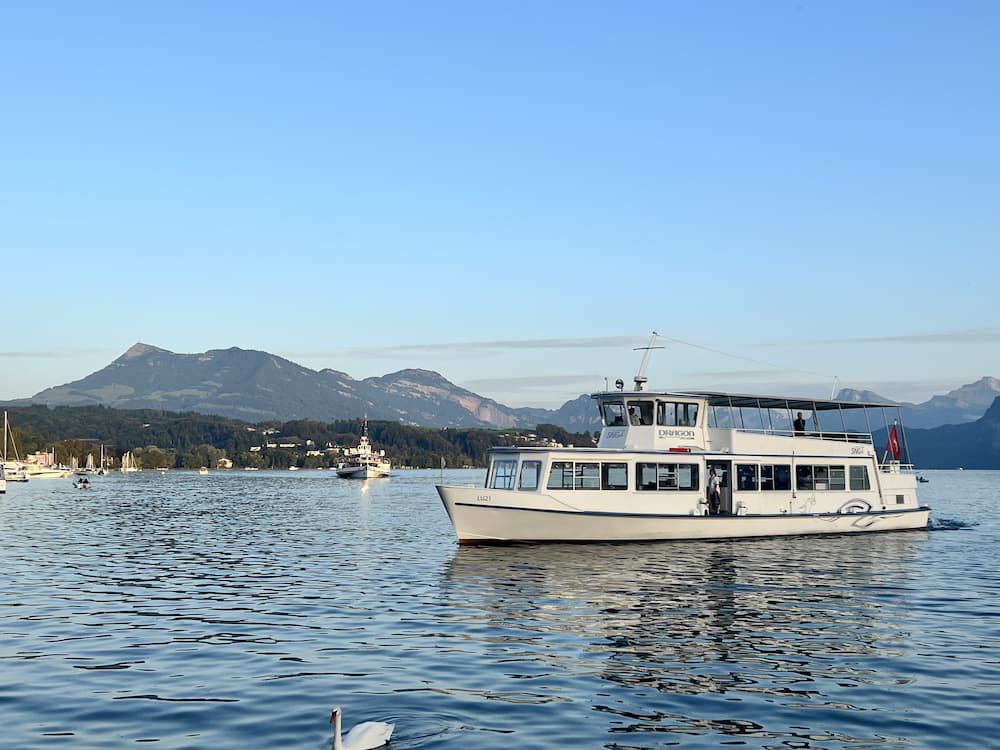
Switzerland is one of the most expensive countries in the world but it is possible to visit it on a budget. Don’t get me wrong – a cheap stay in Switzerland can get you a four-star hotel with restaurant dinners every night in a different European city. But it is absolutely possible to travel the country without spending absurd amounts of money, and I’m going to share all my best tips with you!

Start saving money right off the bat when looking for flights to Switzerland. Flying with a low-cost airline can save you hundreds of Euros, especially if you can manage to pack all your belongings in an underseat bag so you don’t have to pay extra for carry-on luggage.
Low-cost airlines that operate flights to Switzerland are:
It’s important to note that only Basel Airport is serviced by all four airlines. Zurich airport only works with Vueling and Easyjest, while the airport in Geneva works with all airlines except Ryanair.
Low-cost flights are available from other destinations in Europe. If you’re traveling from overseas, look for flights to London, Munich, Paris, or other major destinations in Europe. From there, you can book a cheap flight to Basel for 20-30 Euros in one direction.
Just pay attention to the airports. Budget airlines usually offer flights to airports that are farther outside the city. In practice, this means that you’re more likely to find cheap flights to Switzerland from say Gatwick Airport in London than Heathrow.
I recommend looking for cheap flights to Basel first and then looking for flights from your city to the connecting one. It is a bit of a hassle, but if you use search tools like Skyscanner, Kayak, and even Google Flights , it should be easy enough. And it will save you a lot of money.
Regional Transportation

Public transportation works very well in Switzerland; all the major cities are connected by trains, and you can travel around the entire country relying only on public transportation. However, trains in Switzerland are also notoriously expensive, so traveling on a tight budget isn’t the easiest thing in the world.
But there are ways to save money and they’re called train passes! Some of the most popular options are:
- Eurail/Interrail Pass
- Swiss Travel Pass
- Half-Fare Card
- GA Travel Card
- Berner Oberland Pass
…and more. Some of these passes are regional and won’t offer discounts outside a specific canton or city. Stay away from taxis and Uber because they’re significantly more expensive than train travel.
If you’re serious about traveling to Switzerland on a budget, start by making a list of all the destinations you want to visit. Then look into the cost of the different passes, and see which one is the best value for the money. It’s often the Half-Fare card, especially if you’re in the country for a short time and don’t intend to travel to a new city every day.
But if you want to ride trains often and get discounts on other attractions, the Interrail/Eurail Pass or the Swiss Travel Pass might offer better value. It’s hard to say without knowing your itinerary. Math doesn’t lie, so take the time to look into the cost of train tickets to towns you want to visit (available on sbb.ch ), and attractions you’re willing to pay for, and then just do the math.
Additionally, SBB often offers supersaver passes at a discounted cost. These are usually train tickets you buy a couple of days in advance, and they’re valid only for the connection at a specific timeslot. But they can be up to 70% cheaper than standard tickets, so they are a great way to save money. Relying on supersaver tickets is an option if you don’t want to have a rigid itinerary in Switzerland, and instead prefer to be more spontaneous and flexible.
Transportation Within Cities

Many cities in Switzerland offer multiple public transportation options to get around. Most Swiss cities don’t have a metro, and I’m pretty sure that Lausanne is the only city with a Metro system. Trams, buses, and local trains are public transport options in most other towns.
The reason I’m even mentioning all of this is because public transportation within a city is often entirely free for tourists. In most Swiss cities, when you book a stay at a hotel or an apartment registered with that city’s tourism board, you’ll get a city pass that includes free public transportation in a certain zone and discounts for other attractions. This is the case in Geneva, Lucerne, Interlaken, and other destinations.
I advise against riding any type of public transport without an appropriate ticket. Conductors often come and check, and if you are caught without a valid ticket, you’ll be fined so much money you wish you had rented a limousine to get around because it would have been cheaper.
Finally, just explore on foot. If you don’t want to pay for public transportation, it’s better to walk around. Bike rental is usually cheap and in some places, it’s free, so you can get around faster for very little money.
Food & Drinks
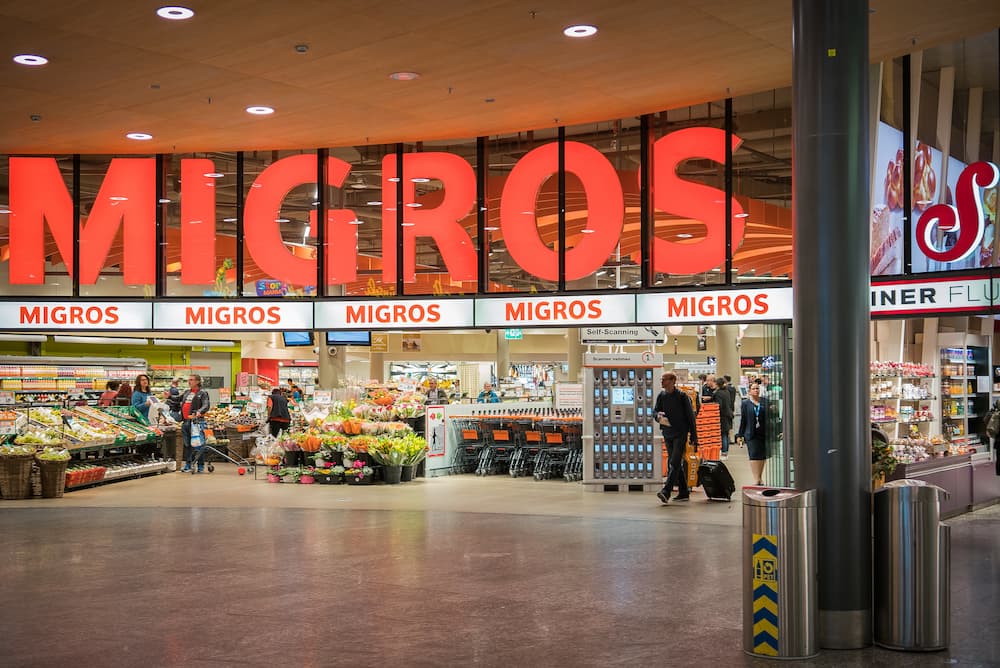
Saving money on food and drinks is the easiest thing in Switzerland if you know where to go. For one, there are many fast-food joints and small restaurants where you can eat good food for little money. Kebabs and pizza are often the cheapest things to eat out in Switzerland, followed by sandwiches.
Look for hole-in-the-wall shops, get recommendations from locals, and visit bakeries often. If you stay at a private apartment or a ho(s)tel with access to a kitchen, you can also prepare your own food. This is by far the best option for saving money because supermarkets in Switzerland are surprisingly affordable.
The restaurants at those supermarkets and department stores are also significantly cheaper than proper restaurants with table service. They usually have a buffet-style menu and charge food by the kilo, and you can often get a generous portion for under 20 CHF. My favorites are:
- Migros restaurant
- Coop restaurant
- Manor restaurant
But cooking your own food is by far the best for eating for cheap in Switzerland. You can get about 500 grams of pasta, tomato sauce, some mozzarella, and olive oil for less than 10 CHF. That amount of food should be enough for at least 4 generous meals. In Zurich, 10 CHF can get you two scoops of ice cream.
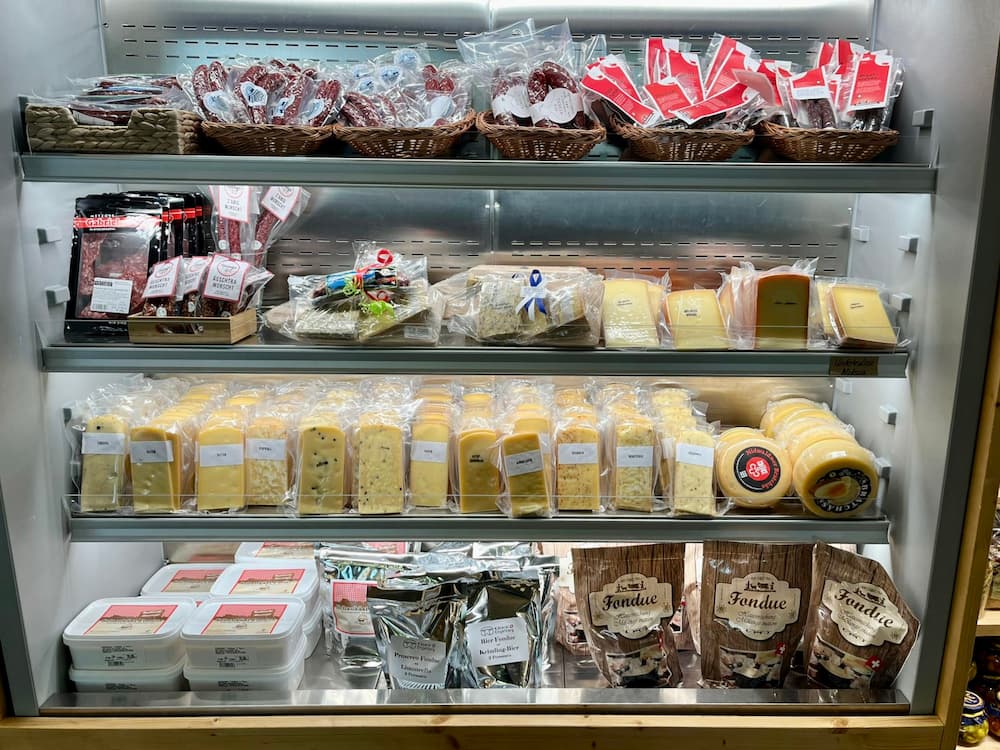
Even if you don’t have a full-sized kitchen, you can always make sandwiches. If there’s no fridge at your accommodation, buy foods that don’t need to be refrigerated, and get smaller sizes of the ones that do so they don’t go bad, and make sandwiches. If you can survive off sandwiches while you’re in Switzerland, you can easily save hundreds of Francs.
And you can prepare picnics! This is my go-to for going out and exploring because restaurants in the mountains are even more expensive than those in the city centers. So, whenever I make plans to spend an entire day outdoors, I’ll prepare a picnic we can enjoy out in nature. It’s always a fun experience, not to mention how much money it can save you.
A meal at a restaurant costs 20-30 CHF on average, and that’s for basic meals in mid-range restaurants. High-end and fine-dining restaurants are significantly more expensive. Two meals a day for two people is at least 100 CHF, so avoiding restaurants in Switzerland is by far the best way to save money in the country.
Finally, never buy water while you’re in Switzerland. The tap water is perfectly safe for drinking, so remember to bring a reusable water bottle and fill it up before leaving the accommodation. One thing to note is that many restaurants in Switzerland will charge you for tap water if you don’t order any other drink.
Accommodation

Accommodation is expensive in Switzerland and will likely take up most of your travel budget. The cost of hotel rooms and apartments varies depending on the city, but in general, you can expect hostels to be up to 100 CHF, mid-range hotels are 100-300 CHF, and luxury hotels can be well over 1,000 CHF for a night.
Keep in mind that the bang for the buck depends on the city. In a smaller place like St. Gallen, 300 CHF per night can be enough for a pretty good hotel. But in Geneva, it will likely get you a mid-range hotel room at best.
Hostels and guesthouses are the way to go for a budget stay. Pitches on campsites are also a decent option if you’re no stranger to spending the night under the sky. You can camp outdoors in Switzerland, and this can actually be a great way of saving money while uncovering some of the country’s most spectacular natural landmarks.
I recommend going with a hostel or a budget apartment for city stays. Even rooms at private properties are a good option, provided they come with a private bathroom and a shared kitchen at the very least. Anything that can allow you to prepare food at home is a good option because it can save you a lot of money.
House-sitting and couch surfing are also options to consider, but they’re generally the best solution for friendly and somewhat adventurous travelers. There’s nearly a quarter of a million hosts for couch surfing in Switzerland, and if you’re up for it, you can save a bunch of money on accommodation.
Personally, I prefer house-sitting because I’m somewhat of an introvert. And also because so many people who are looking for house-sitters need someone to take care of their pet while they’re away. I love animals, and I’m always thrilled to save thousands of Francs on accommodation simply because I need to feed a cat during my stay.
Things to Do in Switzerland on a Budget
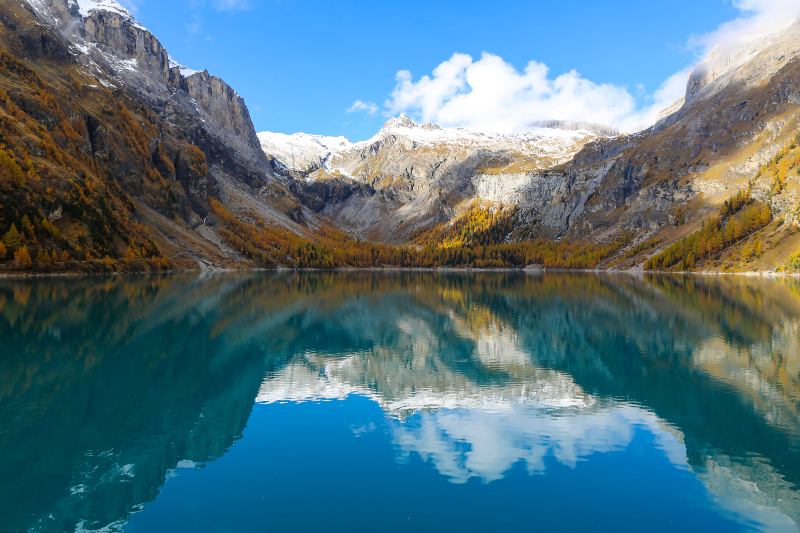
Switzerland offers surprisingly many free activities for one of the most expensive countries in the world. The country has stunning nature, and exploring its countless hiking trails often costs nothing.
Well, that’s the case for hikes that are accessible from urban areas. Access to hiking trails in the Alps is generally not as easy and often requires you to ride mountain trains and gondolas, which are very pricey.
But there are plenty of hiking trails to be explored without spending any money, as well as a bunch of free attractions. I can’t list everything, but I recommend you check out my detailed posts on free things to do in cities throughout Switzerland. I’ve got ideas for:
- Grindelwald
Botanical gardens and public parks are often free of charge in Switzerland, as are certain museums. CERN is also entirely free, so if you are traveling in the Lake Geneva region, stop by the famous science center to have your mind blown free of charge.

Additionally, the amount and nature of things you can do for free in Switzerland highly depend on the season. In the summer, you can usually go hiking for free, swim in the lakes and rivers, and even try climbing mountains. But in the winter you can’t do any of these things; you might be able to ice skate on a frozen lake or explore some winter hiking trails, but there are generally fewer cheap things to do in Switzerland once the snow falls.
Also, free walking tours are available in most Swiss cities. They’re not entirely free because you are expected to tip the guide, but it’s still significantly cheaper than organizing something with an official operator.
Finally, museums and other attractions can have discounted or even free access for select holidays and days of the month. Always check whether a place you want to visit grants discounts or free entrance for whatever reason, and you might just save some money in the process.
Cheap Places to Visit in Switzerland

Here’s the thing – there are no cheap places to visit in Switzerland. The prices are similar throughout most of the country with a few exceptions, and it’s expensive everywhere. One thing to keep in mind is that accommodation is often cheaper in bigger cities than in smaller villages, simply because there are more options. So, always choose to stay in a city or a town, as opposed to a village in the mountains.
On top of that, don’t plan a trip to Zurich or Geneva if you’re trying to do Switzerland on a budget. They’re the two most expensive cities in the entire country and by far the worst Swiss destinations for budget trips.
Instead, choose a smaller city. Chur, St. Gallen, Interlaken, and even Basel are all more affordable than Zurich and Geneva, especially in terms of accommodation and restaurants. Basel is a good destination because it’s close to the airport, it’s got many free activities, and you can easily travel to other destinations in Switzerland from the city.
Lucerne is one of my favorite cities and I highly recommend it to anyone who wants to experience authentic Swiss charm. It’s not exactly a cheap place, but you can find budget accommodation and visit many of the city’s best landmarks without spending a Franc. The Chapel Bridge, Spreuer Bridge, city walls, and the iconic Lion Monument are all free to visit in Lucerne.
More Switzerland Budget Travel Tips (Do’s and Don’ts)
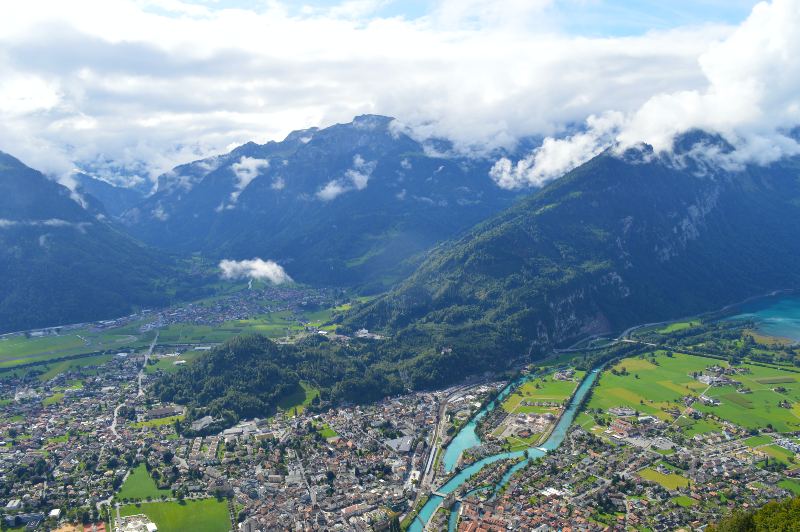
I’m not done with tips for saving money while traveling in Switzerland, and here are some more ideas.
- Travel in the off-season. The peak season in Switzerland (summer/winter) means higher prices of accommodation, transportation, attractions, and even restaurants. Avoid traveling during peak season for the best deals.
- Always ask for discounts. It never hurts to ask for a discount; the worst that can happen is that you get denied a discount and spend the same amount of money you would if you didn’t ask. So, whether it’s a hotel, museum, or whatever else, ask if they offer any special deals or discounts and see if you’re eligible. You can also haggle at souvenir shops and local boutiques to try and save some money while shopping.
- Look into the city cards . All major cities in Switzerland have city cards (not the same as city passes that you get for free) that offer free access to attractions, discounts, use of public transport, and other deals for a select period. City cards are often hit or miss, and it’s best to once again do the math; see which attractions you’d like to visit and calculate the cost of tickets vs. the cost of the city card. The Geneva city card is a really good deal and I highly recommend getting that one if you’re planning to visit many landmarks in the city.
- Mind the exchange rates. The currency used in Switzerland is the Swiss Franc. When paying by card, you can choose whether you want to pay in Francs or a different currency. It’s generally best to pay in Francs because you’ll get the best exchange rates. I highly recommend a wise.com account and one of their free cards because they’ve got minimal fees even for ATM withdrawals. Also, you don’t need that much cash in Switzerland, but it’s good to have some on hand, just in case. You’ll get the best rates if you withdraw Francs from your bank account at the bank, otherwise, you can use ATMs, but you’ll pay steep fees.
One thought on “ Switzerland on a Budget: Tips For Cheap Travel ”
Very good advice. We are six time travelers and it can be done as you say.
Leave a Reply Cancel reply
Your email address will not be published. Required fields are marked *
Get Our Free Swiss Tips Guide
Popular destinations, important pages, on social media, travel planning, certified swiss travel expert.

Best Time to Visit
Weather & Climate
Switzerland Airports
Getting Around
Places to Visit in Switzerland
Top Things to Do in Switzerland
Top Things to Do in Geneva
One Week Itinerary
Most Scenic Train Routes
Switzerland's Nature Parks
How to Go Skiing
The Top Hikes
Matterhorn Complete Guide
The Most Beautiful Lakes
Foods to Try
Best Restaurants
Your Trip to Switzerland: The Complete Guide
:max_bytes(150000):strip_icc():format(webp)/ElizabethHeath-Headshot-horiz-e7525e97616245958bf3d94e8db7f119.png)
If you've ever ogled over photos of Switzerland's Alpine peaks, rolling meadows, and pristine lakes, you'll be happy to know that it's even more beautiful in person. The central European country is small compared to its neighbors, but it packs a lot into its 16,000 square miles, including 13 UNESCO World Heritage Sites , more than 1,500 glaciers, and at least that many lakes.
All these geologic wonders add up to some of the more stunning scenery in the world. And that's enough to bring travelers—about 12 million of them per year —to Switzerland. When you factor in the countless opportunities for hiking, skiing, and boating; hearty Swiss food; modern, interesting cities; and what is probably Europe's best public transportation system, you're met with an accessible, exciting, and altogether satisfying vacation destination.
Planning Your Trip
- Best Time to Visit : The best time to visit Switzerland depends on what you want to do while you're here. Ski slopes are open November through March (though there is year-round skiing in a few places), while hiking and swimming are glorious in the summer months. But to beat the crowds, consider a visit in spring or fall.
- Language: Switzerland's cantons, or states, are mostly either French- or German-speaking. In the southern Ticino canton, Italian is the first language and in the Graubünden/Grisons canton, Romansh, a form of ancient Latin, is still spoken by about 60,000 people. The good news for travelers is that English is widely spoken, especially in hotels, restaurants, stores, and tourist attractions.
- Currency: Despite being in the middle of western Europe, Switzerland is not part of the EU, though it participates in the European Common economic market. The official currency here is the Swiss franc (abbreviated CHF). That said, your euros will probably be accepted at most places, though they'll give you change in francs.
- Getting Around : The clean, convenient, and comprehensive Swiss Travel System is the pride of Switzerland, and rightly so. The system includes trains, buses, lake and river ferries, funiculars, cogwheel trains, ski lifts, and gondolas that permit access to virtually every corner of the country. Because the system is so complete, we recommend touring Switzerland by public transportation, instead of by rental car. From airports and larger train stations, taxis are always available for those who don't feel like schlepping their bags.
- Travel Tip: If you plan to do a lot of travel within Switzerland, consider purchasing the Swiss Travel Pass , which grants the holder unlimited first- or second-class travel across the country's network of trains, buses, and boats, and most scenic railways. Plus, you'll get admission to more than 500 museums, as well as discounts on mountain excursions. However, if you just plan to visit a couple of places in the country, you can get by with individual train/transit tickets.
TripSavvy / Michela Sieman
Things to Do
While every traveler has their own reasons for visiting Switzerland, the big draws here can more or less be broken down into three categories: scenery, outdoor activities, and Swiss history and culture. Your trip will likely start or end in one of Switzerland's big cities, where that history and culture are on full display. Be sure to plan at least one (or several) excursions into the Swiss countryside, either on an easy or challenging hike, a boat ride across an iconic lake, or a cable car ride up to some of the highest peaks in Europe.
Here are some ideas for planning your Swiss itinerary:
- Explore one of the country's culturally rich cities. If you're flying into Switzerland, you'll most likely arrive in Zürich or Geneva. Zürich , Switzerland's largest city, is a delightful place to spend a few days taking in art and history museums, dining in centuries-old restaurants, and strolling down the River Limmat. Geneva , in French-speaking Switzerland, is the diplomatic center of Europe, with plenty of history and classical appeal, and an idyllic setting on the shores of Lake Geneva.
- Hike, bike, swim, or ski. No matter what time of year you visit, you'll find a huge range of outdoor activities in Switzerland—though admittedly, swimming is a bit brisk from October to June! There are biking and hiking routes for every level of fitness, extensive networks of ski "arenas" across the Alps and the Jura mountains, and rivers and lakes waiting for you to jump in for a swim or a paddle.
- Choose a mountain excursion. In Switzerland, it doesn't matter if you're not a skier or hiker. You can answer the call of the mountains just the same, thanks to dozens of scenic mountain excursions that whisk you—by cogwheel rail, cable car, or ski gondola—for close-up looks at the Matterhorn , the Eiger, the Aletsch Glacier, and more. At most places, you can have lunch on the mountaintop while you enjoy the view. Don't leave Switzerland without partaking in at least one of these thrilling rides.
For more trip-planning ideas, check out our full-length articles on the top things to do in Switzerland , Switzerland's most scenic train rides , and Switzerland's top lakes .
What to Eat and Drink
Swiss cuisine is hearty, to say the least. Cheese, chocolate, potatoes, and meat feature heavily on Swiss menus everywhere, and risotto is popular in the cantons bordering Italy. Swiss wine, from vineyards mostly south of the Alps, is so popular among the Swiss that only 2 percent is exported!
Here are some of the foods and beverages you shouldn't miss in Switzerland:
- Fondue. This classic dish of melted cheese, served with bread and vegetables for dipping, is as iconic as the Matterhorn. Fondue originated in French-speaking Switzerland , but it's pretty much ubiquitous across the country.
- Raclette. Sort of a cousin of fondue, raclette is melted cheese served on a plate with bread, potatoes, and gherkins. Its roots are high in the Alps, where farmers would make meals from their abundant cheese reserves.
- Rösti. Pancakes made of grated, fried potatoes, rösti may be served as a side dish or, when paired with eggs, meat, or cheese, as the main course.
- Chocolate. Thanks to milk from grass-fed Alpine cows, plus a few "secret" recipes, Swiss milk chocolate is among the creamiest in the world. Brands to look for include Toberlone, Lindt, Sprüngli, and Läderach.
- Swiss wine. Largely produced in the more temperant cantons south of the Alps, Swiss wine is equally celebrated in its red and white varieties. Chasselas and pinot noir are among the most common grapes, but across the country's wine-growing region, micro-vineyards specialize in small-batch wines. Be sure to sample the wine while you're here— Swiss wine is hard to find outside Switzerland.
Read more in our guides to the top foods to try in Switzerland and where to eat in Zürich .
Where to Stay
Switzerland's accommodation options range from rustic mountain bunkhouses for hikers to luxurious 5-star hotels with spas, Michelin-star dining, and every imaginable amenity. In between those extremes, there are concept hotels, ski-in/ski-out lodges, and a host of B&Bs, small inns, and vacation rentals.
If you're staying in a city, we usually recommend basing yourself in the historic center so that you're within walking distance of popular tourist attractions, restaurants, and bars. But cities like Zürich also have creative, modern districts outside of the center, which make for interesting bases as well. In an Alpine destination such as Zermatt, Saas-Fee, or Gstaad, we like cozy, traditional hotels that really impart a sense of place.
For a taste of what Zürich has to offer, check out our articles on Zürich's top neighborhoods and best hotels.
Getting to Switzerland
International flights to Switzerland, especially those originating outside of Europe, will likely arrive in Zürich or Geneva. Some intra-Europe flights might land at Basel's airport, which is actually located just over the French border.
You can reach Switzerland by train from the neighboring countries of Austria, Germany, France, and Italy. Note that if you're traveling to Switzerland from an adjacent country, your ticket will likely only cover you until your first stop in Switzerland; for example, if you're traveling from Milan, Italy, your ticket will take you as far as Lugano. After that, you'll need a travel pass or ticket from the Swiss Travel System if you want to change trains.
If you're driving to Switzerland, you need to purchase or make sure your car already has a motorway vignette —a sticker that permits access to Swiss highways.
Learn more by checking out our guides to Zürich airport , traveling to Switzerland from Italy , and Zürich's public transportation .
Culture and Customs
While there are no special "rules" for visiting Switzerland, travelers here might find the Swiss somewhat reserved, especially when compared to Mediterranean cultures to the south. Here are a few basic customs and courtesies to keep in mind:
- Be on time. Trains aren't the only thing that runs on time in Switzerland. Plan to arrive on time, or even a few minutes early, for restaurant reservations or other reserved activities.
- Don't be noisy. In restaurants, on public transportation, and especially in the evenings in residential areas, keep your voices at a conversational level.
- Tip in moderation. While tipping waitstaff is appreciated in Switzerland, it's not expected. Tips for your hotel cleaning staff and bellhops are the norm, however.
Money Saving Tips
Here's something you should know about Switzerland before you start planning your trip: it's expensive. Hotels, dining, trains, and attractions are all costly compared to many other European countries, but there are a few ways you can save money:
- Travel in the shoulder seasons. Visit Switzerland in the spring or fall to save money on airfare and hotels.
- Drink tap water. Unless otherwise posted, tap water in Switzerland is clean and safe to drink. Bring a reusable water bottle and fill it up at any tap.
- Pack a picnic. Before you head out for a day of adventures, stop at a grocery store and pick up bread, cheese, cold cuts, or whatever else you want for a picnic. Just don't forget to grab a chocolate bar for the road!
https://whc.unesco.org/en/statesparties/ch
https://www.worlddata.info/europe/switzerland/tourism.php
Switzerland Tourism. "Language distribution." Retrieved on November 9, 2021.
Switzerland Tourism. "Currency." Retrieved on November 9, 2021.
BBC. "Tracing fondue’s mysterious origins." February 12, 2013.
Switzerland Travel Guide
The Best 17 Places to Visit in Switzerland
The Top 20 Things to Do in Switzerland
Lake Como Guide: Planning Your Trip
One Week in Switzerland: The Ultimate Itinerary
France Guide: Planning Your Trip
How to Travel From Florence to Paris by Train, Bus, Plane, and Car
The 10 Best Restaurants in Switzerland
How to Travel Between Italy and Switzerland by Train
The Complete Guide to Switzerland's Nature Parks
Matterhorn: The Complete Guide
The Best Time to Visit Switzerland
The Most Beautiful Lakes in Switzerland
Your Trip to Zurich: The Complete Guide
France Travel Planner for Every Vacation
How to Use Swiss Trains and the Swiss Travel Pass
Unfortunately, we could not find any results for your search term
- Aargau region
- Basel region
- Bern Region
- Fribourg region
- Geneva region
- Graubünden region
- Jura & Three-Lakes Region
- Lake Geneva region
- Lucerne Region - Lake Lucerne
- Region Eastern Switzerland / Liechtenstein
- Ticino region
- Valais region
- Zurich region
- Avalanche course
- Bungee jumping
- Carriage rides
- Chocolate factory
- Competition
- Cooking course
- Creative workshop
- Cross country skiing
- Eating with locals
- Escape Game
- Escape Room
- Exhibitions
- Food & Drink
- Ice climbing
- Indoor amusement park
- Lift tickets
- Llama and alpaca trekking
- Monster Scooter
- Mountain bike
- Mountain tour
- Natural attractions
- Night sledding
- Paragliding
- Photo course
- SBB Day Pass
- Scenic flight
- Scenic train
- Ski touring
- Snowboarding
- Snowshoeing
- Stand up paddle
- Summer tobogganing
- Swiss Rail Passes
- Trail running
- Train ticket
- Travel preparation
- Via ferrata
- Virtual Reality Games
- Wakeboarding
- private car tour
- snowboard rental
- virtual travel companion
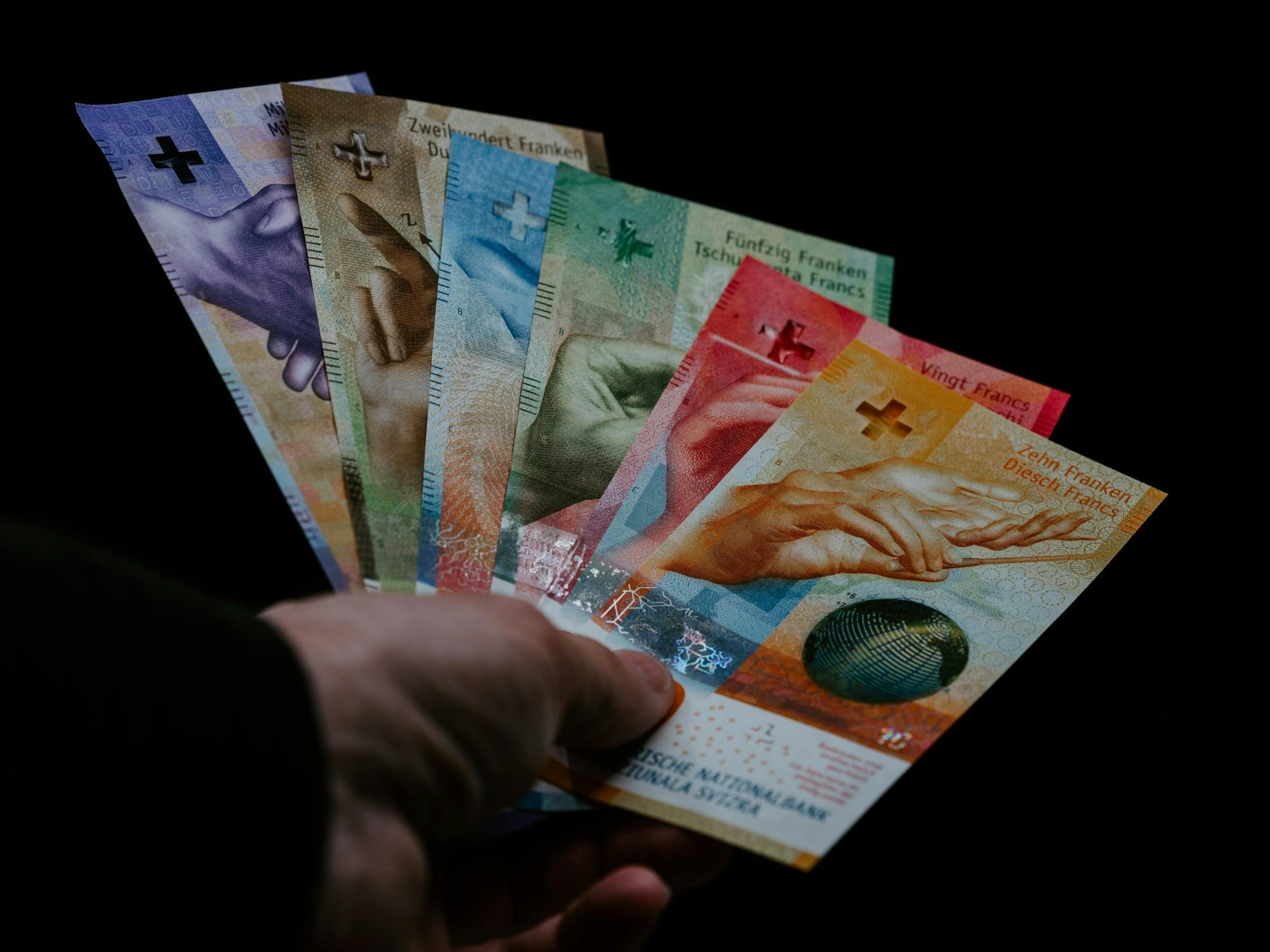
Save money in Switzerland - 33 tips for your trip
Switzerland is one of the most expensive countries in the world, but there are ways to get around on a budget. This article will show you how to save money while traveling in Switzerland. We'll help you plan your trip on a budget. Here you will find 33 valuable tips on how to save money on food, accommodation, leisure time and travel.
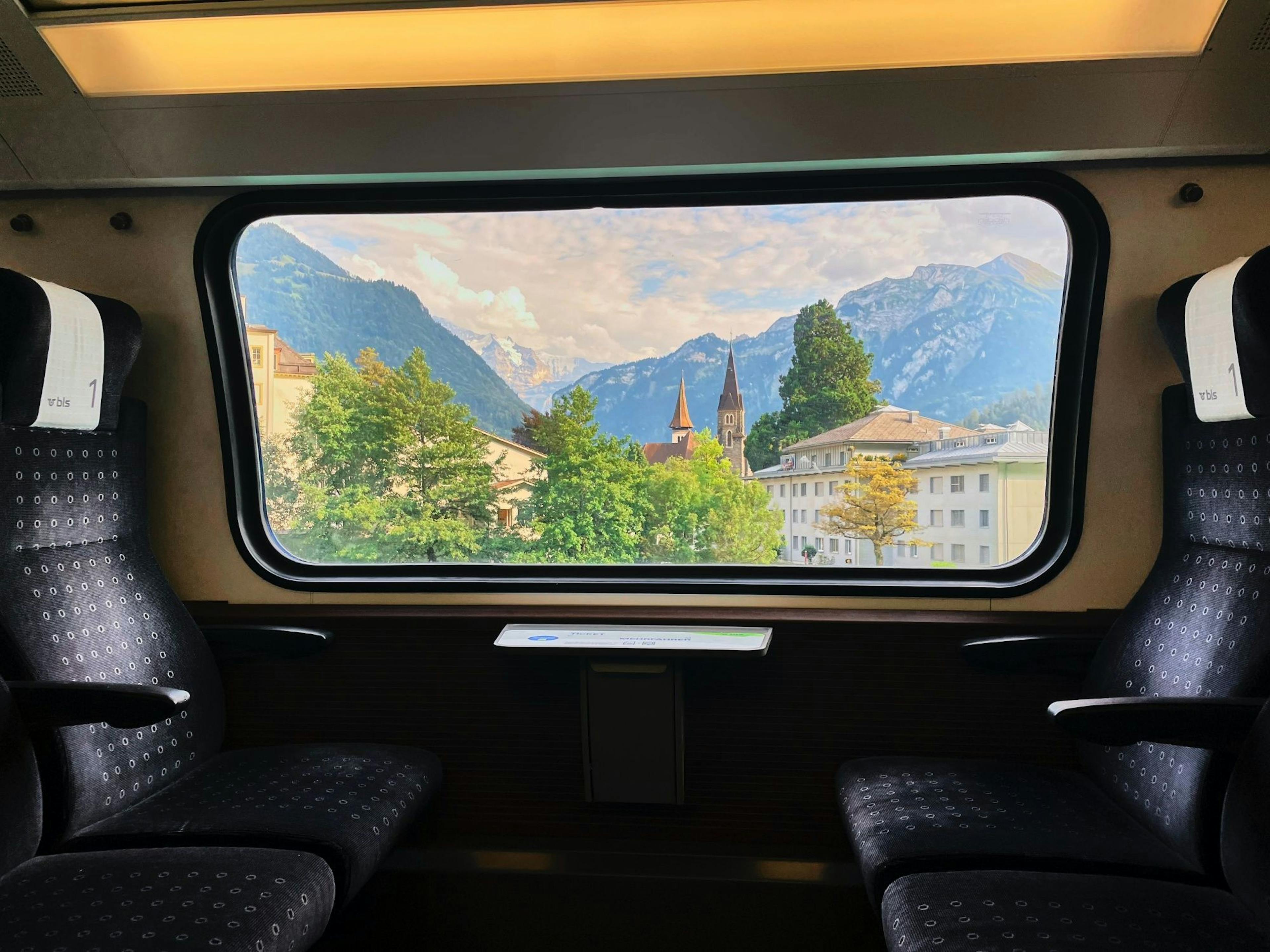
Saver Day Pass SBB - starting at 29 CHF
The Saver Day Pass is available at dynamic prices up to 6 months in advance. The earlier you book, the cheaper you travel. With this pass, you can travel throughout Switzerland without restrictions and use all means of public transport.
Validity: All day
Use your phone or print out the voucher
No booking fees
Discount: Swiss Half Fare Card
booked 1555 times
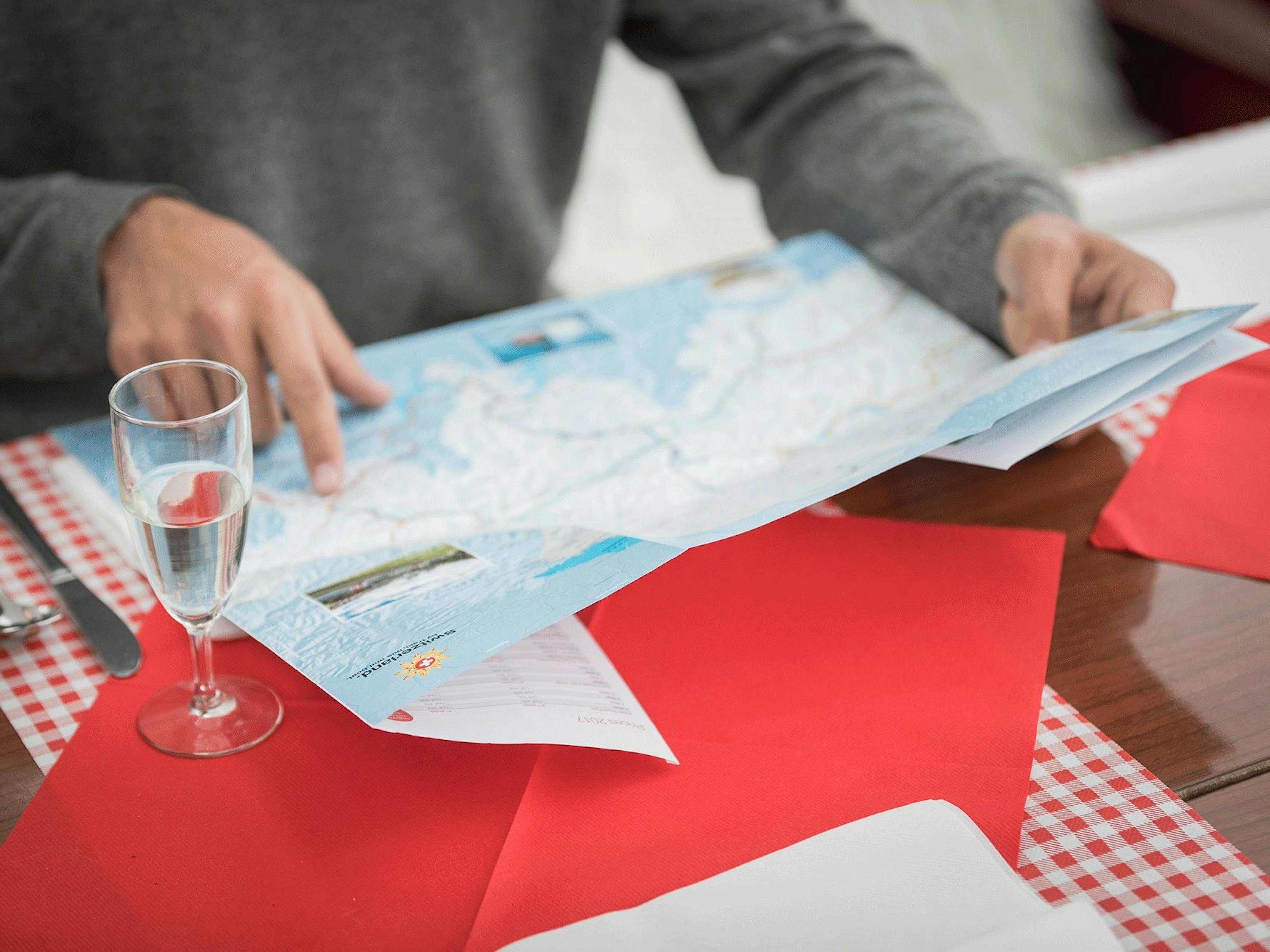
Swiss Half Fare Card
With the Swiss Half Fare Card you get a 50% discount on your trips by bus, train, boat and most mountain railroads. You can travel throughout Switzerland within one month.
Free cancellation
booked 56 times

Friends Day Pass for Youth SBB
The Friends Day Pass for Youth is an incredibly attractive offer for young people under 25. With up to three other people, you can travel all over Switzerland at an unbeatable price.
booked 14 times
Switzerland is one of the most expensive countries in the world. The stronger the Swiss franc, the more expensive it becomes for guests from abroad. Occasionally, the Swiss price level reaches twice the global average.
The internationally recognized "Big Mac Index" makes a tangible comparison*.
- US Dollar vs. Swiss Franc : The Big Mac costs 30% more in Switzerland: in the USA USD 5.15 | in Switzerland USD 6.71
- EURO vs. Swiss Franc : The Big Mac costs 40% more in Switzerland: in the euro area EURO 4.77 | In Switzerland EURO 6.55
- YUAN vs. Swiss Franc : The Big Mac costs 90 % more in Switzerland: in China YUAN 24.00 | In Switzerland YUAN 45.29
(*Values July 2022 with purchasing power adjustment)
This may discourage some people from visiting Switzerland. Which is a shame: because despite the generally high prices, there are numerous tricks you can use to save money on your trip to Switzerland. We introduce you to some valuable money saving tips for Switzerland to help you plan your trip on a budget.
- Focus on free activities
There are plenty of free attractions and activities in Switzerland. These include numerous zoos, theme trails, churches, quite a few museums and much more. In addition, visiting natural attractions such as lakes, waterfalls and gorges is free in the vast majority of cases. And of course, hiking or swimming in a pristine mountain lake is also very easy on your budget. Find out more in our article about 100 free things to do in Switzerland .
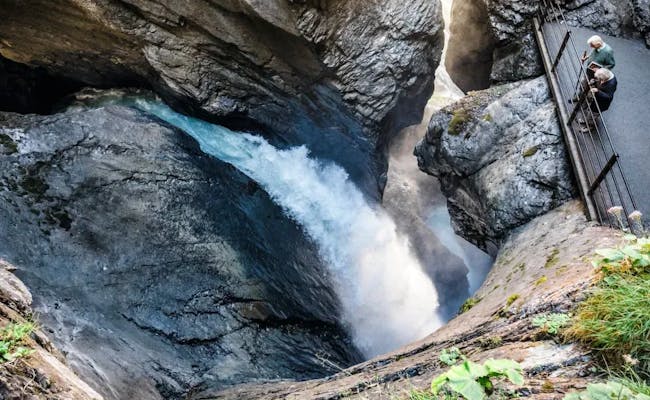
- Benefit from good exchange rates and low fees
In Switzerland, you can pay by card almost everywhere. If you use Revolut, you can pay your bills directly in Swiss francs and don't suffer any exchange rate losses. Through the app, you exchange your currency for CHF at the daily rate and pay in Switzerland as if you had a local debit card. This way you ensure that your fees and losses stay at a minimum.
- Choose the right time to travel to Switzerland
If you choose your travel time wisely and don't travel during peak season, you can save money on your trip. Learn more about the best time to travel to Switzerland .
- Avoid skiing around Christmas as well as in January and February.
- Seek out the mountains especially in April and June or late summer/early fall.
- Avoid the summer months of July and August for hiking.
- Use spring or fall for your excursions and hikes.
- Avoid Ticino between June and October because many things are booked up.
- Avoid winter sports hotspots
Tourism magnets are expensive. It is much cheaper away from the big crowds. If you avoid typical tourist destinations, you will save quite some money in Switzerland.
If you choose one of the big winter sports resorts with a ringing name like Zermatt, Gstaad or St. Moritz, it can be expensive. The formula for saving money is to look for the lesser-known ski resorts, of which there are over 200 to choose from in this country. For a more detailed overview of ski resorts in Switzerland , see our related article on the subject.
- Seek out destinations off the beaten track
A trip to Europe's highest train station on the Jungfraujoch is a special experience, but also very expensive. Areas off the beaten path offer cheaper yet extremely attractive destinations. Rural or sparsely populated regions are more affordable than cities or sophisticated hotspots.
Inexpensive and unforgettable travel experiences can be found throughout Switzerland. For example in the Jura mountains, in Appenzellerland, in the Aargau countryside or at hidden magic spots in Graubünden, Ticino or Valais.

- Save your budget with food highlights
Switzerland is the land of fine chocolate and delicious cheeses. Want to know what's behind it? Take advantage of the numerous offers to visit our chocolate factories , show dairies and other culinary manufactories for a small entrance fee or free. Who knows, you might discover a secret or two.
- Join a free walking tour
Thanks to their small size, Swiss cities are relatively easy to explore on foot. Many offer free walking tours. Because Switzerland survived two world wars intact, its historic old towns are largely intact today. This feature is not taken for granted in Europe and is appreciated by tourists from all over the world.
- Castles, museums, bridges and libraries preserve your budget
Even today, castles are difficult to access because you have to pay admission. But from the outside they always impress for free. This is the case with bridges anyway, and in Swiss museums you can sometimes get in for free or at a reduced price. A Raiffeisen membership, the museum pass, the Swiss Travel Pass , other special public transport tickets or a student card can help.
Many libraries are not only free for students. Besides free Wifi, they offer shelter in stimulating, beautiful reading rooms. Plus, you'll get a slice of local daily life.
- Visit Swiss cultural assets
Switzerland has countless cultural assets that are open to the public. Here are a few examples to help you save money in Switzerland.
- Collège Calvin in Geneva, founded in 1559, still functions as a high school and is open to the public.
- Low entrance fees invite you to visit the UNESCO World Heritage Site Castello di Montebello in Bellinzona.
- Like all churches in this country, the Baroque cathedrals of Einsiedeln Abbey and the Abbey District of St. Gallen are open to the public free of charge.
These and another 13.400 historic buildings with special flair are part of the Swiss list of cultural assets. They can be visited free of charge or at low cost throughout the country. For your personal selection, you can find a detailed list of all cultural assets in Switzerland on the federal geoportal.
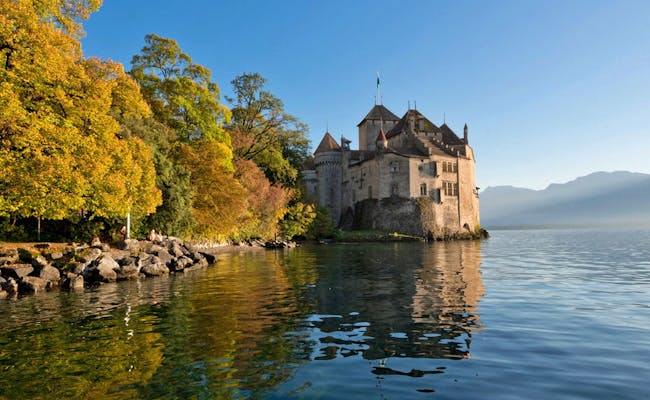
- Discover Switzerland in the panoramic train
Enjoy your train journey with a panoramic view thanks to large, high reaching windows. In such special trains you can explore the most beautiful sides of of Switzerland. Delight in the culinary delights while the breathtaking landscape breathtaking landscape passes you by.
If you have to buy a ticket, panoramic trains won't save you any money. But if you have a Swiss Travel Pass, an Interrail or a Eurail, you're in for unforgettable rides at budget prices. This way, the trip becomes a destination without you having to spend a lot of money in addition to your passport.
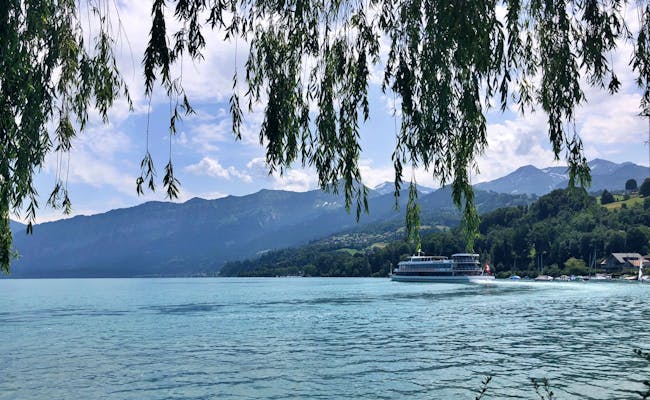
- Book well in advance or at very short notice
The higher the number of vacant rooms, the lower the overnight rate. Today, many hotels flexibly adjust their changing offers at short notice according to current demand. The same applies to trains and flights as well as to the entire offer in tourism. It often pays to book well in advance, when the prices are lower. But also make sure you check last minute offers carefully and keep an eye on them.
- Book the right flight
Booking a flight is easy today. Finding the best and cheapest flight on the Internet is more difficult. Here are some tips:
- Use comparison portals like Google Flights, Skyscanner, Momondo, Kiwi or Kayak to find the best deal.
- Check recommended flights additionally on the website of the respective airline. Sometimes they are offered cheaper there. Especially when it comes to checked baggage, which is often not included on booking portals.
- Avoid peak travel times, because high demand generates high prices.
- Book early and save up to 50%. Last minute bargains are rare on flights.
- Try to stay flexible. Sometimes a day earlier or two days later makes a big difference.
- Large airports and EU hubs allow for cheaper airfares to Switzerland.
- Direct flights cost more. Stopovers push prices down.
- Profit from discounted train tickets
If you are travelling through Switzerland for a few days and use public transport a lot, it is often worth buying a railway pass for your train trip in Switzerland .
If you have your main residence in Europe, the Interrail allows you unlimited train travel in 33 countries. This includes Switzerland. If your main residence is outside Europe, you benefit from the same discounts and opportunities with the Eurail. By the way, the Swiss Travel Pass also saves you a lot of money if you often cover longer distances on your trip.
There are also discounted tickets, such as the SBB savings ticket. Learn more about the Train tickets in Switzerland and discover new ways to save money.
- With the SBB Savings Day Card you can travel Switzerland for as little as CHF 29 per day if you book early enough.
- With the Swiss Half Fare Card you can travel through Switzerland at half price.
- Travel cheap by car
The more passengers you have in your car, the cheaper the trip will be. If the passengers pay, the trip will be especially cheap.
Once you are in Switzerland, you benefit from the flexibility and can go anywhere at any time. You don't have to pay attention to timetables. Another advantage is that you can also eat and sleep in the car if necessary.
Rental cars are also an option. The websites of the major car rental companies always offer bargains. Many comparison platforms help you with your online search.
- Long-distance buses bring you cheaply to Switzerland
Compared with air, car and train travel, the journey by long-distance bus is often cheaper. When the buses are fully booked, it can get crowded. Seat guarantee and WLAN still bring some comfort. In addition to the low fare, there are other arguments for traveling by bus. The luggage regulations are more generous than with airlines and the rebooking and cancellation options are more flexible.
Please note, however, that long-distance buses like Flixbus are only suitable for traveling to Switzerland, but not for getting around within Switzerland.
- Save with car sharing
Low rental costs with a low ecological footprint. Carsharing is the idealistic alternative to classic car rental. Here are two Swiss providers in comparison:
2EM is a community that dreams of a better world. On their app, private individuals share their vehicle for a contribution towards expenses. For the app expenses, the 2EM community takes a small commission.
Founded in 1997, the Mobility cooperative is the pioneer in car sharing. Around 250,000 users share 3000 cars at 1500 locations. Here, too, you benefit from convenient self-service with spontaneous and short-term 24x7 use. At many train stations in Switzerland there are red mobility (electric) cars as an optimal combination of road and rail.
- Uber and Vertt are sometimes cheap
In a direct comparison to conventional cab services, the ride-sharing service Uber comes out cheaper, especially for short distances. The Uber app automatically determines the route, calculates the price, charges your credit card and pays the driver.
Those who know Uber are at home with Vertt . The Zurich-based startup also uses algorithms to arrange ridesharing - just cheaper. The drivers pay less commission, which you notice clearly at the end of the ride. You already know the fare beforehand.
- Rent a bike
Switzerland has a well-developed bicycle network. Even if there is still room for improvement in the infrastructure, you can get around Switzerland wonderfully by bike. You can either borrow it for free or rent it cheaply. You can choose from around 20 bikesharing networks in Switzerland.
- Velospot operates in several Swiss cities.
- RentABike is a leading Swiss bike rental company with 150 rental stations. Many of them at major train stations.
- CargoVelo2Go rents electric cargo bikes by the hour.
- Publibike is an ecologically oriented bikesharing app.
- Free bikes are available for rent through Schweiz Rollt in cities like Zurich and Geneva.
- Book hotels with savings and special prices
Did you know that all-inclusive vacations are a Swiss invention ? Almost a hundred years ago, billboards advertised "7 days of sun, snow and sports from CHF 50." Hundreds of Swiss hotels offered all-inclusive packages, appealing to budget-conscious guests.
Even today, you'll find many low-cost or all-inclusive offers on hotel websites. They are aimed, for example, at families with children , wellness fans or city travellers. You can sometimes find overnight rates as low as CHF 30 per person, including a rich breakfast or half board.
The higher the number of detached rooms, the lower the overnight price. Many hotels today adjust their changing offers flexibly and at short notice according to the current demand. Therefore, it is worthwhile to obtain an online offer at the hotel of your choice for the desired period. It can pay off to plan well in advance or to react quickly.
- Stay in hostels
How about spending the night in a castle or in an original new building? And for little money with a sustainable environmental flair? Then one of the more than 50 Swiss youth hostels is the right place for you. From a bed in a 6-bed room to a double or single room with bathroom and toilet, there is a suitable solution for everyone.
Budget travelers benefit from free Wi-fi and luggage storage, bed linen and breakfast as well as common and leisure rooms or self-service restaurants. Inexpensive annual passes and the free hostel app bring benefits and discounts such as:
- easy booking or check-in
- annual pass on your smartphone
- hostel discounts
- cheaper entrance fees to museums as well as leisure facilities
- partner and family-friendly offers
- discounts on the public transport network
- Sleep in farms and guesthouses
Off the beaten track along the country roads you will find them: The country inns and farms with their moderate room rates. These traditional family-run businesses can be found all over rural Switzerland. Specialities of the Swiss cuisine according to grandmother's recipe or newly interpreted adorn the menus. To find the right accommodation for you, we recommend the platform MyFarm of Agrotourism Switzerland.
You will also find inexpensive accommodation and catering options in the many guesthouses, inns, bed and breakfasts and hotels. Throughout Switzerland they offer comfortable accommodation at favorable conditions. This leaves you more money for other nice things in your trip through Switzerland. A look at over 400 host offers you will find in this pension directory.
- Sleep on straw
Sleeping on straw is a farm adventure for the whole family. You lie in the fragrant straw and look forward to the strengthening breakfast. The fresh milk and the farm's own products are a unique pleasure. On corresponding websites you can find farms that offer sleeping on straw for as little as 10 CHF per person. But beware, not all of them are so cheap. Check out the MyFarm platform and find the right farm for you.
Swiss Activities Tip: Although sleeping on straw is a great experience, it is not suitable for everyone. If you suffer from allergies and have problems with hay, straw or dust, it's better to avoid it.
- Book a holiday apartment or a house
Are you travelling with family or friends? Then it often helps the travel budget if you book a holiday apartment or a holiday home. The more travellers, the lower the accommodation costs per person. If you want to save on meals, your holiday home is the right place. Cooking yourself is usually cheaper. You can find offers on the following platforms:
- HomeToGo is a meta search engine with forwarding function. If you like the accommodation, you will be guided to the right booking portal.
- Atraveo is suitable for offers from one week.
- Airbnb is ideal for accommodation in the city.
- Casamundo offers a practical map view for orientation.
- HomeAway helps with short stays in city apartments.
- Holidu offers vacation rentals throughout Switzerland.
- Discover attractive campsites and bungalows
Save money on accommodation and travel without complications? Camping is more popular today than ever before. Many Swiss campsites offer high standards of development with recreation close to nature.
You are traveling without equipment and want to arrive spontaneously? Book a fully equipped accommodation at the campsite. The trend is called "glamping" and combines glamour and camping. You spend the night in comfortable bungalows, romantic yurts or in a nostalgic circus wagon.
TCS Camping is the largest provider in Switzerland. As a member you have up to 20% discount on TCS campsites. Depending on your Switzerland itinerary it can be worthwhile. On the portals of TCS or Camping.info you will find the right campsite in Switzerland.
- Use Park4night and Roadsurfer Spots
What's better than getting to know the country and its people spontaneously on a road trip? Are you on a round trip through Switzerland with your car, caravan or motorhome? Apps like park4night and roadsurfer spots simplify your daily search for a parking space.
They show you where you can easily park for the night or in between. Park4night documents suitable public parking spaces. In Switzerland, this is completely safe. On the other hand, Roadsurfer Spots will guide you to natural parking spaces on private property, some of which you have to pay for.
- Find cheap lunch menus
Eating in Swiss restaurants does not always have to be expensive. Cheap lunch menus allow for inexpensive enjoyment. So look for restaurants, inns and bistros between 11:30 am and 1:30 pm. Look for signs at the entrance with the daily menus and prices. Often you can choose from three or more different menus and pay much less than you would in the evening or if you ordered à la carte.
- Eat near universities and schools
Near big schools and universities, there is often a high density of restaurants and take-away stalls offering reasonably priced meals. As they compete for the favour of students, prices are often lower than in other places.
- Save money at a self-service restaurant
Cheap is not always bad. That's true of self-service restaurants, too. They serve inexpensive and at the same time good quality food. In Switzerland, you can find them in shopping malls or at large supermarkets like Migros and Coop. School, university and company cafeterias welcome out-of-town visitors. Places like museums, open-air swimming pools or youth hostels sometimes also run restaurants.
- Spare in the fight against food waste
There are numerous concepts that combat food waste. These include the Ässbar and TooGoodToGo.
The Ässbar , which you can find in eight cities in Switzerland, offers delicious baked goods from the day before. With the slogan "fresh from yesterday," you get delicious creations from bakeries in the area. Perfect for a cheap meal or picnic for your next hike in Switzerland . By the way, the Ässbar sometimes also offers whole menus that were cooked and packaged the day before, but not sold.
Via the TooGoodToGo App you can see where you can save food from going to waste in your area. Restaurants, bakeries, supermarkets and even drugstores offer their food at a greatly reduced price, which is wonderful for your travel budget.
- Enjoy a picnic
Get your food at the counter and find a nice place to picnic. Since you're foregoing a set table with service, you'll save some money. Lakefront promenades, public fireplaces, lookout points and park benches, to name a few, are perfect for a leisurely picnic. Takeaway stands are booming in Switzerland and you'll find them everywhere:
- at train station arcades
- in shopping malls
- in pedestrian zones
- in large stores such as Migros, Coop, Manor, Jelmoli or Globus
- in restaurants with takeaway offers
- on lake and river promenades
- at mobile counters on streets and squares
- and near schools and universities
- Get your own groceries and be your own chef
The shopping possibilities in Switzerland are huge and the choice is enormous. So buy your own ingredients and cook your own food to save money on the restaurant. Here are some tips for good bargains:
- The big supermarkets Migros and Coop carry inexpensive budget products in their private label. At Migros, the packages are white and green striped and labeled "M-Budget." Coop labels them with "Prix-Garantie" in pink lettering on a white background.
- Discounters such as Denner, Lidl or Aldi are attractive for low-cost purchases.
- Products with the "Action" label promise interesting reductions.
- Shortly before closing time, orange discount points with up to 75% off stick on perishable goods.
- Shop on farms
At farms you have a wide selection of fresh vegetables, fruits, dairy products, eggs and homemade jams. Also fresh from the farm: sausages, lamb, turkey, pork and other meats. By buying the goods directly from the farmer, they are often cheaper than in the store. With over 3000 farm stores in Switzerland, the websites of Hoflädeli and MyFarm will help you find them.
- Save money on drinks
In Switzerland, drinks can add up when paying at the restaurant or at the supermarket. So take advantage of the abundant free fountains or tap water. Fountains with drinking water quality can be found on every corner in Switzerland. Especially in cities. Self-service restaurants and canteens offer free tap water. Often the taps are discreetly placed and not immediately visible.
Did you know that you can drink alcohol in public in Switzerland? So buy a cold beer and drink it on the lakeshore or in a cozy park. Another insider tip for thirsty budget travelers: Look out for the many happy hour offers.

Switzerland is one of the most expensive countries in the world. However, thanks to good travel planning, it is also an affordable destination for budget travelers. Now you know the ways and ways to save money in Switzerland.
Table of contents
Discover leisure activities, top destinations.
- Grindelwald
- Lauterbrunnen
- Brienzwiler
Top Activities
Top attractions.
- Harder Kulm
- First Cliff Walk
- Jungfraujoch
- Museum of Transport
- Mount Titlis
- Lake Lucerne
- Schynige Plate
- Eiger Glacier
- Lake Geneva
- Grindelwald First
- Chillon Castle
- Travel Planning Guide
Switzerland Travel Budget - Visit Switzerland on a Budget or Travel in Style
- Switzerland Costs

- Is Switzerland Expensive?
- How much does a trip to Switzerland cost?
- Grindelwald
- Switzerland Hotel Prices
- Switzerland Cities: Hotel Prices by City
- Best Romantic Hotels for Couples in Switzerland
- Best Adults Only Hotels in Switzerland
- Best Cheap Hotels in Switzerland
- Best Hotels for First Time Visitors in Switzerland
- Best Luxury Hotels in Switzerland
- Best Family-Friendly Hotels in Switzerland
- Best Party Hotels in Switzerland
- Best Hotels for a Weekend Getaway in Switzerland
- Best Hotels for One Week in Switzerland
- Best Pet-Friendly Hotels in Switzerland
- Best Hotels for Scuba Diving in Switzerland
- Best Business Hotels in Switzerland
- Best Hotels for Skiing in Switzerland
- Best Hotels for One Night in Switzerland
- Hostel Prices & Reviews
- Switzerland Tour Prices
- The Best Family-Friendly Tours to Switzerland
- The Best Hiking & Trekking Tours in Switzerland
- The Best Historical Tours in Switzerland
- The Best 10-Day Tours in Switzerland
- The Best One Week (7-Day) Tours in Switzerland
- The Best 2-Week Tours in Switzerland
- The Best River Cruises in Switzerland
- The Best Bicycle Tours in Switzerland
- Tours for Outdoor and Nature Lovers in Switzerland
- The Best Christmas & New Years Tours in Switzerland
- The Best Coach Bus Tours in Switzerland
- The Best Adventure Tours to Switzerland
- The Best Eco Tours in Switzerland
- The Best Train & Rail Tours in Switzerland
- The Best Sightseeing Tours in Switzerland
- The Best Cultural Tours in Switzerland
- The Best Romantic Tours for Couples in Switzerland
- The Best Luxury Tours to Switzerland
- The Best Tours for Seniors to Switzerland
- How much does it cost to travel to Switzerland? (Average Daily Cost)
- Switzerland trip costs: one week, two weeks, one month
How much do package tours cost in Switzerland?
Is switzerland expensive to visit.
- How much do I need for a trip to Switzerland?
- Accommodation, Food, Entertainment, and Transportation Costs
- Travel Guide
How much does it cost to travel to Switzerland?
You should plan to spend around $284 (Sfr259) per day on your vacation in Switzerland. This is the average daily price based on the expenses of other visitors.
Past travelers have spent, on average for one day:
- $62 (Sfr57) on meals
- $38 (Sfr35) on local transportation
- $334 (Sfr305) on hotels
A one week trip to Switzerland for two people costs, on average, $3,971 (Sfr3,630) . This includes accommodation, food, local transportation, and sightseeing.
All of these average travel prices have been collected from other travelers to help you plan your own travel budget.
- Travel Style: All Budget (Cheap) Mid-Range Luxury (High-End)
- Average Daily Cost Per person, per day $ 284 Sfr 259
- One Week Per person $ 1,986 Sfr 1,815
- 2 Weeks Per person $ 3,971 Sfr 3,630
- One Month Per person $ 8,510 Sfr 7,779
- One Week For a couple $ 3,971 Sfr 3,630
- 2 Weeks For a couple $ 7,942 Sfr 7,261
- One Month For a couple $ 17,019 Sfr 15,559
Are You an Experienced Traveler?
Help other travelers! Answer a quick question about your past travels. Click here: let's do it!
How much does a one week, two week, or one month trip to Switzerland cost?
A one week trip to Switzerland usually costs around $1,986 (Sfr1,815) for one person and $3,971 (Sfr3,630) for two people. This includes accommodation, food, local transportation, and sightseeing.
A two week trip to Switzerland on average costs around $3,971 (Sfr3,630) for one person and $7,942 (Sfr7,261) for two people. This cost includes accommodation, food, local transportation, and sightseeing.
Please note, prices can vary based on your travel style, speed, and other variables. If you're traveling as a family of three or four people, the price per person often goes down because kid's tickets are cheaper and hotel rooms can be shared. If you travel slower over a longer period of time then your daily budget will also go down. Two people traveling together for one month in Switzerland will often have a lower daily budget per person than one person traveling alone for one week.
A one month trip to Switzerland on average costs around $8,510 (Sfr7,779) for one person and $17,019 (Sfr15,559) for two people. The more places you visit, the higher the daily price will become due to increased transportation costs.
Organized tours are usually more expensive than independent travel, but offer convenience and peace of mind that your trip has been planned by a travel expert.
The average price for an organized tour package in Switzerland is $392 per day. While every tour varies by total price, length, number of destinations, and quality, this is the daily average price based on our analysis of available guided tours.
- Lake Constance | Self-Guided | Germany, Austria, Switzerland 6 Days - 5 Destinations $ 1,117
- Spectacular Switzerland 9 Days - 11 Destinations $ 3,549
Independent Travel
Traveling Independently has many benefits including affordabilty, freedom, flexibility, and the opportunity to control your own experiences.
All of the travel costs below are based on the experiences of other independent travelers.
Switzerland is a moderately priced destination to visit. It's about average with most other countries for travel costs. The prices for food, accommodation, and transportation are all fairly reasonable.
Within Europe, which is known to be an expensive region, Switzerland is somewhat more expensive compared to the other countries. It is in the top 25% of countries in Europe for its travel costs. While a few countries in the region are more expensive, Switzerland is more expensive than most.
For more details, see Is Switzerland Expensive?
How much money do I need for a trip to Switzerland?
The average Switzerland trip cost is broken down by category here for independent travelers. All of these Switzerland travel prices are calculated from the budgets of real travelers.
Accommodation Budget in Switzerland
Average daily costs.
Calculated from travelers like you
The average price paid for one person for accommodation in Switzerland is $167 (Sfr153). For two people sharing a typical double-occupancy hotel room, the average price paid for a hotel room in Switzerland is $334 (Sfr305). This cost is from the reported spending of actual travelers.
- Accommodation 1 Hotel or hostel for one person $ 167 Sfr 153
- Accommodation 1 Typical double-occupancy room $ 334 Sfr 305
Hotel Prices in Switzerland
Looking for a hotel in Switzerland? Prices vary by location, date, season, and the level of luxury. See below for options.
Find the best hotel for your travel style.
Actual Hotel Prices The average hotel room price in Switzerland based on data provided by Kayak for actual hotel rooms is $170. (Prices in U.S. Dollars, before taxes & fees.)
Kayak helps you find the best prices for hotels, flights, and rental cars for destinations around the world.
Recommended Properties
- CFI Hotel & Restaurants Touring Budget Hotel - Kayak $ 128
- The Omnia Luxury Hotel - Kayak $ 356
Local Transportation Budget in Switzerland
The cost of a taxi ride in Switzerland is significantly more than public transportation. On average, past travelers have spent $38 (Sfr35) per person, per day, on local transportation in Switzerland.
- Local Transportation 1 Taxis, local buses, subway, etc. $ 38 Sfr 35
Recommended Services
- Private Transfer from Zurich to Basel, English Speaking Driver Viator $ 196
- Zurich Private Airport and Hotels Transfer with Round-Trip Viator $ 149
What did other people spend on Local Transportation?
Typical prices for Local Transportation in Switzerland are listed below. These actual costs are from real travelers and can give you an idea of the Local Transportation prices in Switzerland, but your costs will vary based on your travel style and the place where the purchase was made.
- City Pass (2) Sfr 26
- Cable Cars (for 2) Sfr 60
Food Budget in Switzerland
While meal prices in Switzerland can vary, the average cost of food in Switzerland is $62 (Sfr57) per day. Based on the spending habits of previous travelers, when dining out an average meal in Switzerland should cost around $25 (Sfr23) per person. Breakfast prices are usually a little cheaper than lunch or dinner. The price of food in sit-down restaurants in Switzerland is often higher than fast food prices or street food prices.
- Food 2 Meals for one day $ 62 Sfr 57
Recommended
- Fondue Cooking Class and Cheese Workshop in Switzerland Viator $ 143
- Sunset hike with outdoor Cheese Fondue dinner Viator $ 167
What did other people spend on Food?
Typical prices for Food in Switzerland are listed below. These actual costs are from real travelers and can give you an idea of the Food prices in Switzerland, but your costs will vary based on your travel style and the place where the purchase was made.
- Breakfast for 2 Sfr 12
- Tea at Interlaken Sfr 30
Entertainment Budget in Switzerland
Entertainment and activities in Switzerland typically cost an average of $56 (Sfr51) per person, per day based on the spending of previous travelers. This includes fees paid for admission tickets to museums and attractions, day tours, and other sightseeing expenses.
- Entertainment 1 Entrance tickets, shows, etc. $ 56 Sfr 51
Recommended Activities
- Private City Tour & Photoshoot with a Local in Zurich Viator $ 232
- Sledding adventure with Chocolate degustation Viator $ 129
What did other people spend on Entertainment?
Typical prices for Entertainment in Switzerland are listed below. These actual costs are from real travelers and can give you an idea of the Entertainment prices in Switzerland, but your costs will vary based on your travel style and the place where the purchase was made.
- 1 Day Bicycle Rental Sfr 31
- The Swiss Transport Museum Entrance Fee Sfr 32
Tips and Handouts Budget in Switzerland
The average cost for Tips and Handouts in Switzerland is $6.20 (Sfr5.67) per day. The usual amount for a tip in Switzerland is 5% - 15% .
- Tips and Handouts 1 For guides or service providers $ 6.20 Sfr 5.67
Alcohol Budget in Switzerland
The average person spends about $26 (Sfr24) on alcoholic beverages in Switzerland per day. The more you spend on alcohol, the more fun you might be having despite your higher budget.
- Alcohol 2 Drinks for one day $ 26 Sfr 24
- Fantastic, full day, private wine tour to Alsace! Viator $ 285
- Pinot Noir & Pinot Wine Tour to Baden-Württemberg Viator $ 279
Water Budget in Switzerland
On average, people spend $4.24 (Sfr3.88) on bottled water in Switzerland per day. The public water in Switzerland is considered safe to drink.
- Water 2 Bottled water for one day $ 4.24 Sfr 3.88
Related Articles
Switzerland on a budget.
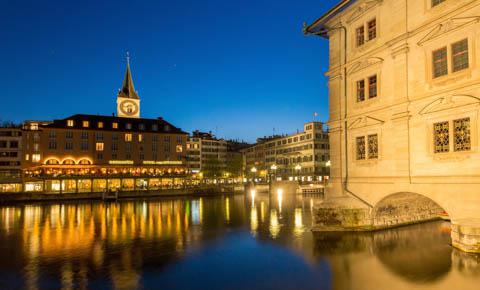
Top Tourist Attractions
Popular foods, more related articles.
We've been gathering travel costs from tens of thousands of actual travelers since 2010, and we use the data to calculate average daily travel costs for destinations around the world. We also systematically analyze the prices of hotels, hostels, and tours from travel providers such as Kayak, HostelWorld, TourRadar, Viator, and others. This combination of expenses from actual travelers, combined with pricing data from major travel companies, gives us a uniqe insight into the overall cost of travel for thousands of cities in countries around the world. You can see more here: How it Works .
Subscribe to our Newsletter
By signing up for our email newsletter, you will receive occasional updates from us with sales and discounts from major travel companies , plus tips and advice from experienced budget travelers!

Search for Travel Costs
Some of the links on this website are sponsored or affiliate links which help to financially support this site. By clicking the link and making a purchase, we may receive a small commission, but this does not affect the price of your purchase.
Travel Cost Data
You are welcome to reference or display our travel costs on your website as long as you provide a link back to this page .
A Simple Link
For a basic link, you can copy and paste the HTML link code or this page's address.
Travel Cost Widget
To display all of the data, copy and paste the code below to display our travel cost widget . Make sure that you keep the link back to our website intact.
- Privacy / Terms of Use
- Activities, Day Trips, Things To Do, and Excursions
Home » Trip Planning » Budget Tips
11 ways to save money on Swiss train travel

- Last Updated: 30 Apr 2021
- By Tanya, Founder of Swiss Family Fun
If you buy something through a link here, we may earn a commission. See our disclosure policy . Note that p rices and opening times may change without notice.
Switzerland train travel is efficient, punctual, clean and a great way to see this beautiful country. But Swiss public transportation can also be expensive, especially if you are traveling with a large group or family.
So here are tips for getting discounts on Swiss train fares to maximize your budget.
How much does it cost to ride a train in Switzerland?
Short-term travel passes, long-term travel cards, discount fares.
Full fare train travel in Switzerland can be expensive. Here are some sample one-way fares (double these for round trip).
- Zürich to Luzern = CHF 25
- Luzern to Interlaken = CHF 33
- Zürich to Zermatt = CHF 125
- Zermatt to Geneva = CHF 102
Children 6-16 pay half-fare. Children under 6 ride for free.
Seniors and students do not get a discount on full fare train tickets. But they do qualify for discounts on some travel passes, travel cards and mountain excursions.
Travel passes are designed for tourists, making Swiss travel more convenient and cost effective. Instead of buying individual tickets each day of travel, you purchase a travel passes for a specific number of days, from 2 to 10 days depending on the pass.
Most travel passes cover public transport (trains, trams, buses) and give discounts on mountain excursions and leisure activities. Look at the specific pass details for the exact benefits.
1. Swiss Travel Pass
The most popular option for tourists is the Swiss Travel Pass. It fully covers transportation on trains, buses, and boats for a predetermined number of days. It also gives a discount on mountain transport at many locations. This is the most flexible pass and is best if you are traveling long distances and don’t have a set itinerary.
Should you buy a Swiss Travel Pass?
2. Regional travel passes
Many mountain destinations offer a regional travel passes that covers trains, buses, boats, and some mountain transport (or discounts for them) in one region for a certain number of days. You’ll have to do the math, but generally, these are only worth it if you don’t have a car (meaning you are always traveling to/from places by public transport) and you will be using expensive mountain transport every day.
- Jungfrau Pass
- Berner Oberland Regional Pass
- Tell Pass for Central Switzerland
- Erlebnis Card for Upper Valais
- Graubünden Pass for southeast Switzerland
- Golden Pass for western Switzerland
See Best Swiss Regional Passes
3. International travel passes
If you are traveling across Europe with a InterRail or Eurail pass, you may be eligible for discounts on Swiss train travel. But if Switzerland is the focus of your trip, it’s much better to purchase a Switzerland specific pass as mentioned above.
Interrail Global Pass – This pass is only available to residents of Europe and not valid in the country you live in (i.e. Swiss residents cannot use it in Switzerland). It is generally used to travel between major destinations/countries, e.g. 5 days of travel in one month. If you use this pass in Switzerland, it covers all public transportation and gives a discount on some mountain excursions (usually 25% off). If seat reservations are required on your train (like the Glacier Express), you must purchase those separately. Learn more .
Eurail Pass – This pass is only available to non-European residents. Depending which version of the pass you get, you get discounts on train trail and some mountain excursions in Switzerland. Learn more .
These travel cards are designed more for Swiss residents, giving them discounted travel over the long term. But these can also be purchased by tourists and may be a more cost efficient option in some scenarios.
4. Half-fare travelcard
The SBB Half-fare travelcard gives you a 50% discount on public transportation (trains, trams, buses and boats) and most mountain transport. This pass pays for itself rather quickly if you ride up just a few expensive mountains.
Swiss residents can purchase the yearly SBB Half-fare travelcard, which costs CHF 185/adult. First you have to order a Swiss Pass, which is a travel ID card. Then you can buy travel passes to load onto the card. Learn more .
Tourists can purchase a 1 month Half-fare card, which provides the same benefits but just for 30 days. In 2023, this short-term travelcard costs CHF 120/adult. Learn more .
More info about the SBB Half-fare card .
5. Junior card – Free travel for kids
If you are traveling with children aged 6 to 16, you should buy the SBB Junior card (sometimes called the Family Card). It costs CHF 30 per year and entitles the child to travel free on public transportation and most mountain transport when traveling with a parent with a valid ticket.
The Junior Card is available for purchase by both locals and tourists. You can buy the Junior card at a train station that has a ticket office. You need to bring IDs for your children proving their age.
You can also buy a Children’s Co-Travelcard, which allows children to travel free when traveling with any adult with a valid ticket. It also costs CHF 30/year.
Children under 6 are free on all public transport and almost all mountain transport when accompanied by a parent with a valid ticket.
More info about SBB Junior Cards
5. 1-month GA Travelcard
If you are staying in Switzerland for a few weeks, a one month GA card could be the most affordable way to travel. A GA pass includes free public transportation all over Switzerland, including trains, trams, buses and boats. It also include a discount on most mountain railways, usually 50% discount and some free. See the current validity map to see what’s covered.
In 2023, a 1-month GA Travelcard costs CHF 420 (2nd class), about the same price as an 8 day Swiss Travel Pass (see below). You do not need a SBB Half-fare card to use the 1 month GA Travelcard. Both Swiss residents and non-Swiss residents can purchase this card.
Buy a 1-Month GA travelcard
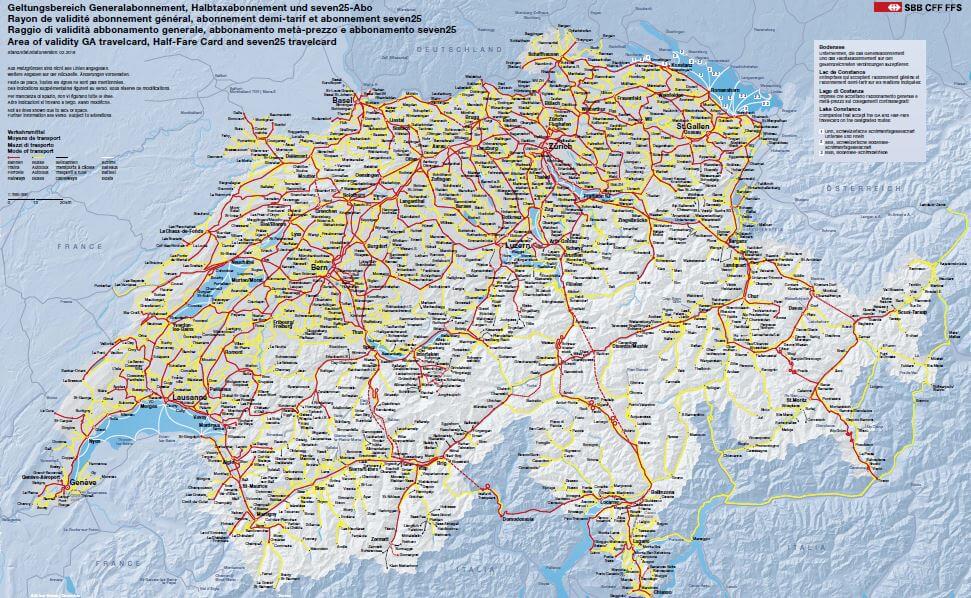
If you do a little research and purchase in advance, you can benefit from discounted fares and special promotions.
6. Supersaver fares
If you buy tickets in advance, you may get a Supersaver Ticket option, which can offer extreme discounts. In the example below, a normal one-way ticket from Zürich to Bern is CHF 51, but with Supersaver it’s only CHF 15.40 (even less with a SBB Half-fare card).
When booking tickets on SBB.ch or the SBB app, you’ll see the Supersaver option in the “Options for outward journey” section at the bottom of the screen. You’ll need to expand that section to see it. The Supersaver option isn’t always available. If you see the % symbol, then a discount option is available.
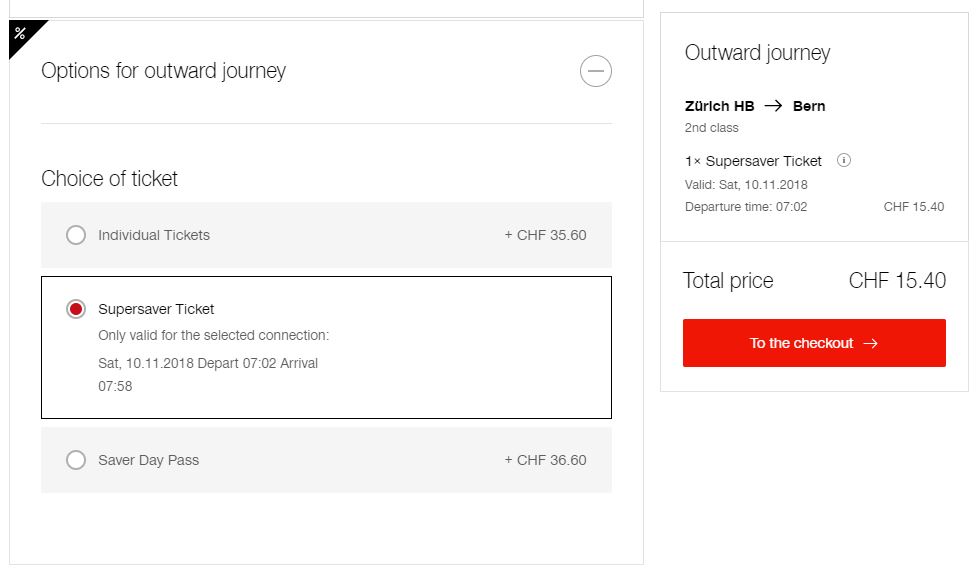
Please note that the Supersaver fare is for a specific date & time, so you cannot use this ticket for a different train that day, e.g. if you missed the train or wanted to take an earlier one. More details on SBB .
7. SBB Railaway combi discounts
SBB Railaway does many special travel promotions within Switzerland. Their “combi discounts” give you a discount when you purchase your train travel together with a leisure activities like mountain excursions and museums. The discount is at least 10% but can be as high as 50%. They typically publish a new set of offers each season.
See SBB Railway Offers here .

A day pass covers all public transport covers all public transportation throughout Switzerland and gives discounts on some mountain transport. In 2022, the standard day pass costs CHF 150 full fare and CHF 75 with a SBB Half-fare card. But there are three ways you can get a discounted day pass.
8. Saver Day Passes
Anyone can buy Saver Day Passes in advance, which covers all public transportation throughout Switzerland and gives discounts on some mountain transport. These Saver Day Passes can be as low as CHF 52 for adults or CHF 29 for adults with a SBB half-fare card. This is about the same price as a return ticket from Zürich to Luzern. Amazing deal!
The downside is that you have book very far in advance to get the biggest discount. If your plans change, there is bad weather or you get sick, you might not be able to use the pass.
The Saver Day Pass generally has the same validity as a GA Pass. But some mountains do not accept the Saver Day Pass (even if they accept the GA pass). So check the validity map to make sure your desired destinations are covered.
Learn more about the Saver Day Pass
9. “Gemeinde” Day Passes
Many towns pre-purchase GA Day Passes (covers travel for the entire country), which they offer at a discount to people who live in the town. You can see a list of towns and calendar of what’s still available here: https://www.tageskarte-gemeinde.ch/en-us/
This website simply links you to the website for that Gemeinde (aka community), so you can see their rules for reserving and purchasing the tickets. You can often reserve them online, sometimes by phone, then pick them up a few days before your travel day. Typically only people living in the Gemeinde can reserve and pick up the tickets, so you could have a friend do it for you.
10. Leisure Card
If you have a SBB Half-fare card, you can purchase a “Leisure Card,” which includes 20 GA day passes for CHF 900. This works out to CHF 45/day, which is much cheaper than the standard half-fare day pass price of CHF 75/day.
You have to use all 20 passes within a year of purchase. But you can use them anytime and don’t have to pre-book a specific day.
Buy SBB Leisure Card
Is it cheaper to buy Swiss train tickets online?
For regular tickets, it is not cheaper to purchase Swiss train tickets online. However, some discount offers (like Supersaver fares and Saver Day Passes) are only available on the SBB website and SBB mobile app. So it’s always better to purchase train tickets online or via mobile app so you can see if these discounts are available.
Do I need to reserve a seat on Swiss trains?
Seat reservations are only CHF 5 but it’s not usually necessary to make a seat reservation on Swiss trains. I’ve made a reservation only one time in 17 years.
But you may need/want to reserve a seat if:
- you are traveling on a special panorama train that requires a reservation (e.g. Glacier Express, Bernina Express, Gotthard Express)
- the train is forecast to be very crowded and you are traveling a long distance on a single train
- you are traveling a popular commute route during commuting hours (Zurich – Bern, Bern – Geneva, Zurich – Lugano)
- you are traveling with children or a large group and want to sit together
- you want to sit in a special train car, like family area or business zone
You can only make reservations on most Intercity (IC) and ICN trains, not on local trains. You can see the forecast capacity on the SBB.ch or SBB mobile app. They have a little people icon that turns red as they predict the train to be more full.

You can make the reservation online at SBB.ch. You don’t reserve the seat when purchasing your ticket. You do it separately using the reservation booking system . During this process, make sure to select the same train your ticket is for.
Do I have to buy a train ticket for my dog?
Dogs larger than 30 cm tall must have a train ticket. Small dogs under 30cm may travel for free only if they travel inside a carrier or basket.
For short journeys, purchase a half-fare ticket for your dog. For longer journeys, purchase a Dog Day Pass, which costs CHF 25. You can also purchase a Dog year pass for CHF 350. Learn more .
Do I need a train ticket for my bike?
Yes, you need a separate train ticket for your bike. For short distances, you can purchase a half-price ticket for your bike in addition to your own ticket. For longer distances, purchase a bike day pass, which in 2022, costs CHF 14. Learn more about taking bikes on Swiss trains .
Do disabled passengers receive discounts?
Disabled passengers are not automatically entitled to discounts on Swiss train travel. However, you may receive discounts if you purchase Swiss train tickets from your country of origin. Learn more .
I hope these tips helped. Do you have any other ideas on how to save money on travel in Switzerland?
- TAGS: Swiss Public Transport
You might also like
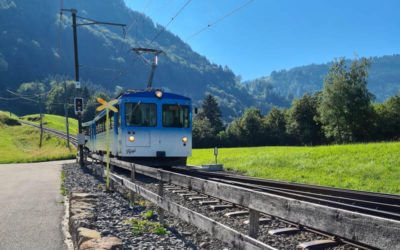
Support us!
When you book something through our links, it costs you the same but we earn a small commission. This support helps us keep our website free to use. Thanks!
via SkyScanner
via Booking.com
via DiscoverCars

via GetYourGuide
We respect your privacy. Please review our privacy policy to understand how we process and store data submitted through the comment form below. If you submit this form, you explicitly agree to the terms described in our privacy policy.
2 Responses
Thank you, very useful! Saved us quite a bit on train tickets
Great! So I could help you save some money on your trip.
Leave a Reply Cancel reply
Your email address will not be published. Required fields are marked *
Save my name, email, and website in this browser for the next time I comment.
Hi! I’m Tanya and our family has been living & hiking in Switzerland since 2005, collecting dozens of fun hikes and activities for all ages and abilities. More about us…
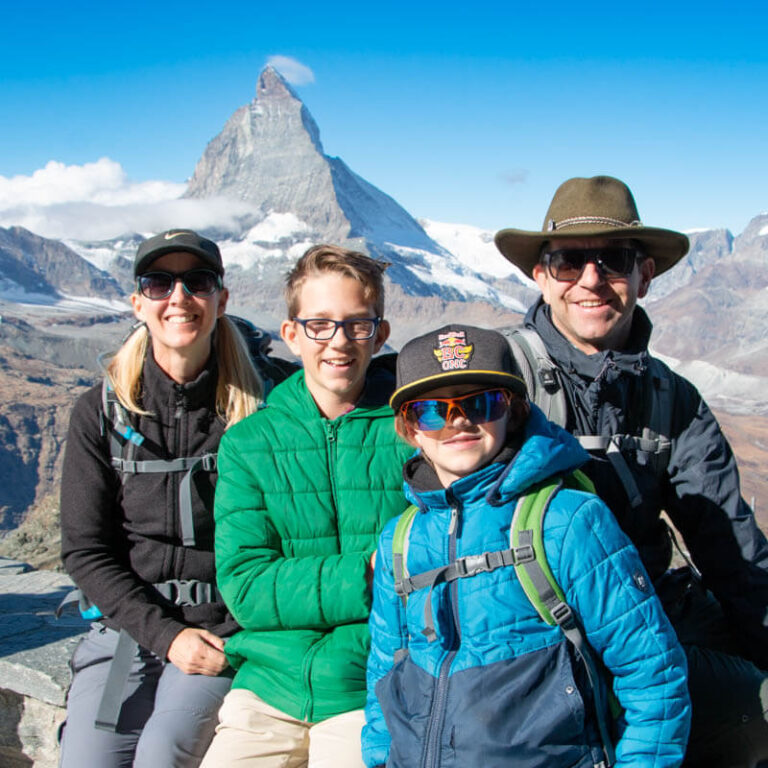
Need help planning?
Short on time? Get our interactive map with curated itineraries. Learn more…
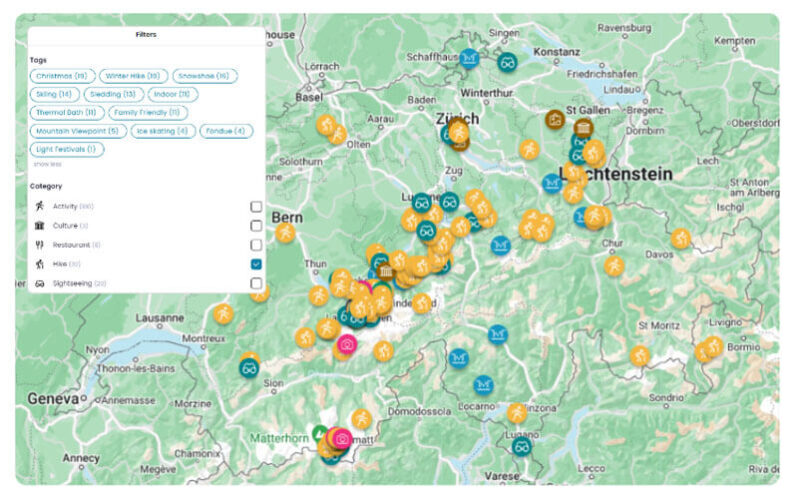
Have questions? Book a video call with me to create a custom itinerary.
Need inspiration? Get our Switzerland Bucket List ebook with twenty “Top 10” checklists.
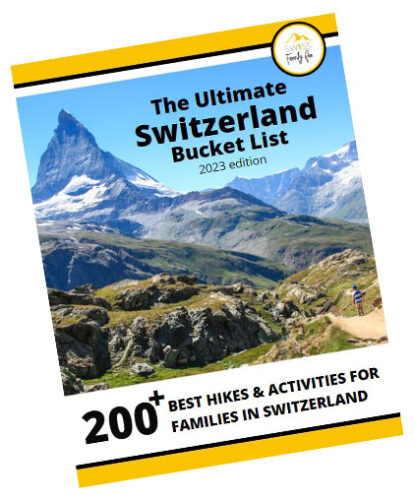
Subscribers may login below. At the moment, membership is by invite only.
- Skip to primary navigation
- Skip to main content

How to visit Switzerland by train on a budget: our tips
Last Update: 25/01/2024 2 COMMENTS
Switzerland is a very small country compared to its neighbors… However, it is probably also the country with the most trains. 🙂 Switzerland and trains are a love story, and if you decide to travel in Switzerland we can only encourage you to consider this means of transportation.
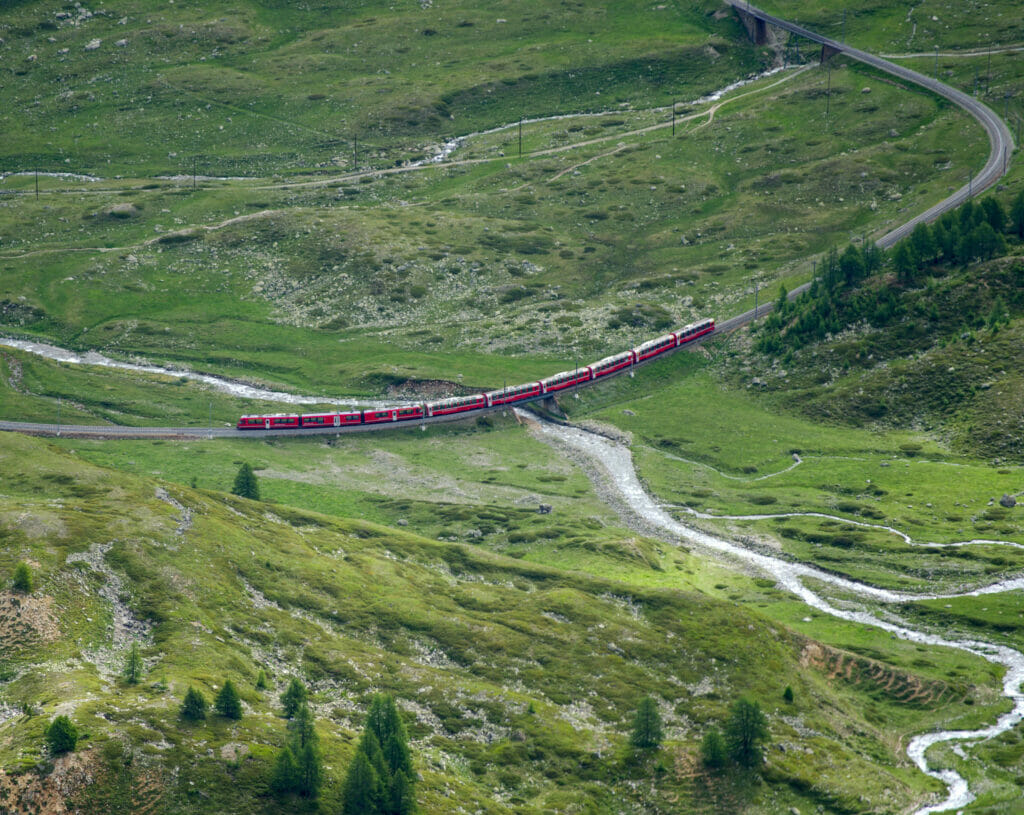
Ecological, practical, it is also an option that can be VERY scenic! Switzerland has some of the most beautiful train routes! By the way, if you are thinking about which route to take, we suggest you take a look at this article where we talk about the most beautiful train lines in Switzerland. 🙂
The Swiss travel pass
The swiss travel pass youth and the family card, regional passes – discover a swiss region by train, the half-fare travelcard, buy swiss train tickets on the spot (at the station or via the app), supersaver tickets – buy your train ticket in advance, supersaver day passes in switzerland, faq about train travel in switzerland – special tickets, visiting switzerland by train.

But enough of that, in this article we are not going to focus on the routes or the legendary punctuality of the Swiss trains, but on the train ticket system and the different options available to you. Switzerland is a country with a reputation for being expensive (we’ll be honest, it’s the case for many things). Nevertheless, if you do your homework and plan your trip in advance, you can save a lot of money on train tickets.
We start with the product that has been “created” for people who decide to visit Switzerland. This means that the Swiss Pass is only available to non-residents of our small country. This is the reason why we have never tested it personally… After that, we already did quite some research about it because we have already recommended it several times to friends who wanted to visit Switzerland.
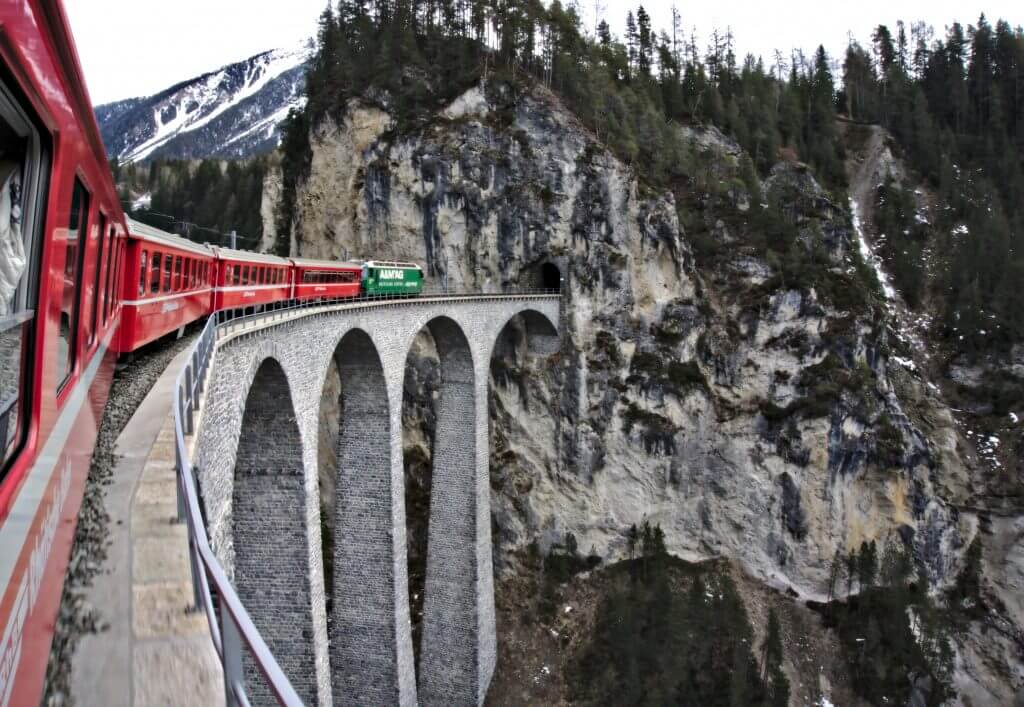
The idea of the Swiss Pass is to make it simple: one card and everything (or almost everything is included). You choose the number of days you want and then the swiss pass will allow you to take any train, bus, boat, streetcar, subway in the country as well as access to more than 500 museums! The Swiss pass also includes a lot of cable cars and for those that are not included, the pass gives you a discount equivalent to the half-fare card that many Swiss people have. There are just some trains like the Glacier Express, the Bernina Express or the Golden Pass where you will have to pay a supplement for the seat reservation. You can see the validity of the pass on this map .

The swiss pass exists in 2 models:
- The classic Swiss Travel Pass : You choose between 3, 4, 6, 8 or 15 days of validity and then, upon activation, the pass is valid for the consecutive days.
- The Flex Swiss Travel Pass : ditto, you choose the number of days. The difference here is that the days can be used flexibly over a period of 30 days.
The flex pass is a bit more expensive, but in reality it’s often worth it because it allows you to use fewer days (basically you don’t activate the pass on days when you just take a bus to visit a city but keep the pass days for longer trips).
If you are interested in the Swiss pas, we encourage you to read our detailed review of the Swiss here .
Our links to Getyourguide are affiliate links. By buying the passes via Getyourguide you pay the same price as on the official website (actually for a reason that escapes me it’s even a few CHF cheaper via Getyourguide), and as a bonus we will get a small commission. In addition to supporting us in our independent research (because no, this content is not sponsored, it is our honest and spontaneous opinion on this product), you will also benefit from GetYourGuide’s flexible and simplified cancellation conditions.
To learn more about how we monetize our site via affiliate marketing, you can read this article .

The Swiss travel pass is also VERY advantageous for young people under 25 and families! On Getyourguide , you can simply select the youth rate in the menu. The price is about 30% lower!
For families, simply add the children to your order (it’s free) and you will get the Family Card. All children under 16 years old travel for free if they are accompanied by a parent holding the Swiss pass . Honestly, if you travel with children, it’s a good deal and also a very comfortable and fun thing to do everything by train! In addition, the Swiss pass also includes more than 500 museums throughout the country.
If your trip in Switzerland is limited to a particular region, it may be worth looking into a “regional” pass. Generally much cheaper than the Swiss pass, these regional passes allow you to benefit from the same transport advantages.
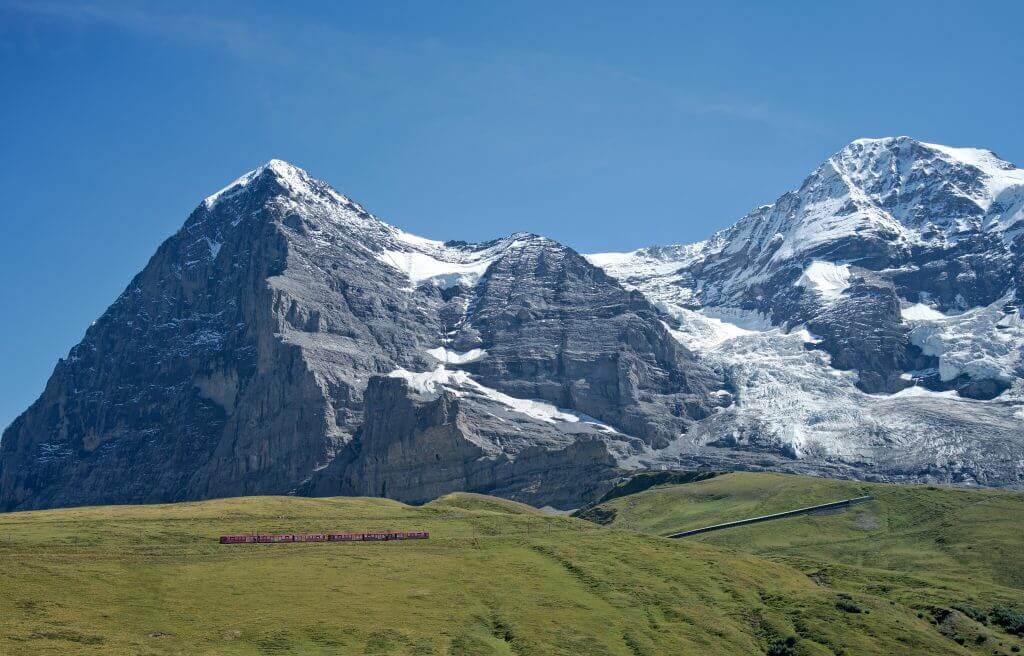
For example there is:
- The Jungfrau Pass : This pass gives unlimited access to the cable cars, buses and trains of the Jungfrau region (from Interlaken to Grindelwald, Lauterbrunnen, Mürren, etc). Please note that you will have to pay a supplement if you want to go to the top of the JungfrauJoch (but this would also be the case with the Swiss Pass)
- The Graubünden Pass : A card issued by the Rhaetian Railway that gives access to all trains, post buses and regional buses in Graubünden. It’s really cheap compared to the Swiss Pass, so if you only plan to visit Graubünden, it would be better to take this pass and just buy a Supersaver ticket to go to Graubünden.
- The Pass Saint Bernard : This one is next to us and frankly it is so crazy in terms of price that we just had to add it to this list… Sold for 139 CHF, it gives unlimited access to the region’s transportation, 15 activities and all the ski lifts of the region during 1 year (so even in winter). The “summer” pass costs 29 CHF and includes the same services but just for the summer months!
- The Zurich Card or The Fribourg City Card : These are city cards. They include public transportation as well as museums/tours. If you visit these regions and want to do some cultural tourism, they really pay for themselves very quickly (and it would be a shame to use a day’s worth of Swiss Passes just to visit a city)
Note that in some cities and regions (Lausanne, Dents du Mid region, Val d’Hérens and many others) these cards/passes are included if you stay there and they give you access to regional transport and activities.

The Half-Fare travelcard was originally reserved for Swiss residents. Its price? 185 CHF per year (165 CHF when renewed). In Switzerland, a lot of people take it (including us) because it allows to have a 50% discount when taking the train. For occasional travelers like us, it’s really quickly amortized. The problem is that it was not accessible to travelers passing through.
There is now a half-fare card version for foreign tourists. Sold at 120 CHF, it is valid for 1 month .
It sounds expensive, but believe us it pays for itself. What is an example? You are planning a small city trip in Switzerland. You arrive in Geneva and decide to go to Zurich, then to Basel and finally come back to Geneva via Sion.

At full price you would pay:
- Train Geneva – Zurich : 88 CHF
- Train Zurich – Basel : 34 CHF
- Basel – Sion : 92 CHF
- Train Sion – Geneva : 48 CHF
Total: 262 CHF. With the half fare card, it would have been 251 CHF (131 CHF for the half price tickets + 120 CHF half fare card). In short, if you add to that a few tram/bus rides or excursions, it’s quickly worth it.
If you want to see more itinerary suggestions as well as the prices comparing the half fare card and the Swiss Travel pass, you can take a look at our detailed blog post.
After that, I would say that the Flex Swiss Travel Pass is quickly more advantageous if you start taking more transports… Quite honestly, you have to have fun doing the calculations. If you want to see more details, you can read this article in which we compare the 2 products in more detail.
For the occasional traveler
As you can see above, multi-day tickets and passes are very convenient, but they are also relatively expensive. If your travel plans in Switzerland involve less travel, then it might be more interesting to do without a pass and just buy tickets or day passes as you go. But here again, there are a few tricks that can save you some CHF.

For almost all public transport in Switzerland, you will have the possibility to buy your ticket at automatic machines (only exception would be on some lines in the mountains/countryside where the ticket is still sold from by the bus driver). The machines in the stations are large touch screens where you can choose the language and pay by card, cash or via smartphone.
The solution of the machine works very well for individual tickets, even if personally I would rather recommend the mobile application of the SBB. Very well designed, it allows you to check the timetable and directly buy the tickets. You just have to create an account and connect a payment method.

One feature that is nice on the app is EasyRide. Basically, you don’t buy a ticket, but simply activate the button when you get on a bus/train. At the end of the day, the app calculates the cheapest ticket that covers all your trips.
Example: At 8 am I take a train to Lausanne from Vevey. Price of the trip: 11.20 CHF if I bought the ticket (valid for 2 hours) At 11:30 am I decide to meet a friend and get on a bus in Lausanne to make 3 stops. Price of a ticket: 3.70 CHF (valid 1h) At 4pm I take a bus back to the train station area: 3.70 CHF At 18h I return to Vevey by train. Price of the trip: 11.20 CHF
By taking the tickets individually each time I would have spent 29.8 CHF. With the EasyRide, the application would have calculated that for this day it would have been more advantageous to take a day pass of the region (6 zones) for 22.8 CHF. Of course, if you know in advance which trips you are going to make, you can directly take such a ticket, but in reality I find it convenient to let the application do the math 😉 In case of ticket control, the app generates a temporary ticket that is valid as long as you have activated the trip BEFORE getting on the bus/train.
A good way to save money on train tickets in Switzerland is to buy them in advance! Supersaver tickets are a number of tickets made available to travelers at low prices (up to 70% off) up to 2 months before the date of travel. The earlier you book, the cheaper it is! These tickets are available for Half-Fare card holders as well as for people without a basic season ticket, for both 2nd and 1st class. They can be purchased directly from the timetable page. If Supersaver tickets are available on your dates, you will see the discounted price displayed on top. You will then have to select the option on the next screen:

Also consider whether you are flexible on the hours… Discounts are much lower during rush hour than during off-peak hours. If you can, try to travel mid-morning or mid-afternoon.

But be careful: these tickets are advantageous because they are neither refundable nor exchangeable! Personally, we often buy them but only if we are sure of the schedule. Example: during our last trip to Slovakia, we left by night train from Zurich. We bought a 60% discounted ticket to go to Zurich from Valais (starting from home, it was easy for us to take some margin and not miss our train).
For the return trip, however, our night train had to arrive at 8:20 am in Zurich. A Supersaver ticket was available at 8:35 am and another one at 9:35 am. As the night train between Vienna and Zurich takes 12 hours, we assumed that it would be possible that it would be a little bit late. In short, we also took a Supersaver ticket but we played it safe and took it with a 1h margin.
Similar to the Supersaver Tickets, it is possible to buy Supersaver Day Cards. They are put on sale 2 months before the date of travel and are available to both holders of a half-fare card and to people without a card. If you book in advance, the Supersaver Day Passes are available from CHF 29 with half fare or from CHF 52 without half fare. If you are planning a long day of travel, it is definitely worth it!
But beware, these day passes are neither exchangeable nor refundable.
More info on the SBB website
Do the children have to pay a ticket?

Children up to the age of 6 travel free of charge on all public transport. From 6 to 16 years of age, the reduced fare (half fare) applies.
Afterwards, if you travel with children older than 6, it is possible to take a pass for them which will make the trips free:
- La Swiss Family Card : This card is free of charge if the parents have a travel pass ( Swiss Pass , Swiss Pass Flex or half-fare card). The card can be picked up free of charge at the station ticket offices. With this pass, children from 6 to 16 years old travel free of charge on the entire network!
- The Junior card : The card costs CHF 30 per year and allows children up to the age of 16 to travel free of charge if accompanied by a parent who pays a ticket. The parent does not need to have any travel pass.
Are dogs allowed on trains and buses in Switzerland? If so, how much does the ticket cost?
Yes, dogs are allowed on all public transportation. Dogs up to 30cm tall can travel free of charge but must be in a carrier bag at all times. Larger dogs or those not in a bag must have a half-fare ticket. Note: if you are making a longer journey, it is possible to take a “dog” day pass which costs 25 CHF (this is cheaper than a ticket for a Lausanne-Zurich journey for example). If you travel often, there is also an annual pass for 350 CHF.

Is it possible to travel with a bicycle on swiss trains?
Yes, on most lines this is possible. However, please note that your bike must have a ticket. For short trips, you can take a half-fare ticket or, for longer trips, buy a “bicycle” day pass at CHF 14. To make sure that bicycles are allowed and if a reservation is necessary, the best way is to use the advanced search options on the “timetable” page and check the bicycle box. By clicking on the “train composition” button you will be able to see in which carriage there are bicycle spaces.
Is there free wifi on swiss trains?
No, there is no public wifi in public transport. Switzerland is outside the European Union, so foreign travelers are often subject to roaming fees (check your subscription before coming!). If you don’t have mobile data included in Switzerland, we advise you to take a pre-paid card from Sunrise (they have a 0 CHF offer for travelers). Their package offers unlimited data and calls for 2,5 CHF / day (the amount is deducted only on the days you use it). As a bonus, the SBB have a partnership with them and thanks to FreeSurf app you will have a free connection in the trains (no charge on the pre-paid card).
That’s it for this article about traveling to Switzerland by train and the different ticket options. If you have any questions, feel free to leave us a comment.
See you soon!

Novo-monde in your inbox
Receive the latest news from the blog directly in your inbox! Guaranteed 100% Travel and 0% Spam !
Select all the topics you are interested in: *
Protected by Cloudflare Turnstile
You might also like

Reader Interactions
8 months ago
Thanks for the excellent information.
We are travelling as a family of 4 (2 adults, 10yo, 8yo) over 7 days. We are happy to book in advance and commit to specific train times at an off peak time – middle of days work best for us. I’ve played around with ticket prices and it would seem super saver or super saver day passes will be best for my husband and I, but I think this mean we are not eligible for a free Swiss family card for the children. Am I understanding it correctly that I can buy them a Junior card for 30CHF each and they will travel free, or alternatively buy a 30 day half fare card from myself and husband and we are then eligible for the free family card.
The half price card doesn’t seem to pay for itself booking super saver fares, but comes out about even if I take the free kids travel into account (saving 60CHF for junior cards). And we then have a half price card should we do more travel than currently anticipated during our week in Switzerland.
Many Thanks
6 months ago
Hallo Fabienne,
Eine Freundin und ich werden drei Tage am Anfang November in Schweiz Urlaub machen. Wir übernachten in Interlaken und bekommen Interlaken Gästekarte. Wir wollen am ersten Tag zu Jungfraujoch bis zum Top fahren.
Am am zweiten Tag nach Lauterbrunnen und andere Orte in Jungfraujoch Region besuchen.
Am letzten Tag wollen wir Montreux besuchen. Was ist am günstigsten zu kaufen, Swisstravel Pass (3 Tage)+ Jungfrau Travel Pass + Anschlussticket Jungfraujoch Top 63 CHF oder statt Swisstravel Pass lieber Swiss Half Fare Card +Jungfrau Travel Pass + Anschlussticket Jungfraujoch Top 63 CHF? Über Ihre Hilfe würde ich mich sehr freuen.
Join the discussion Cancel reply
Reçois un e-mail lors de nouveaux commentaires sur cet article: Don't subscribe All new comments Replies to my comments
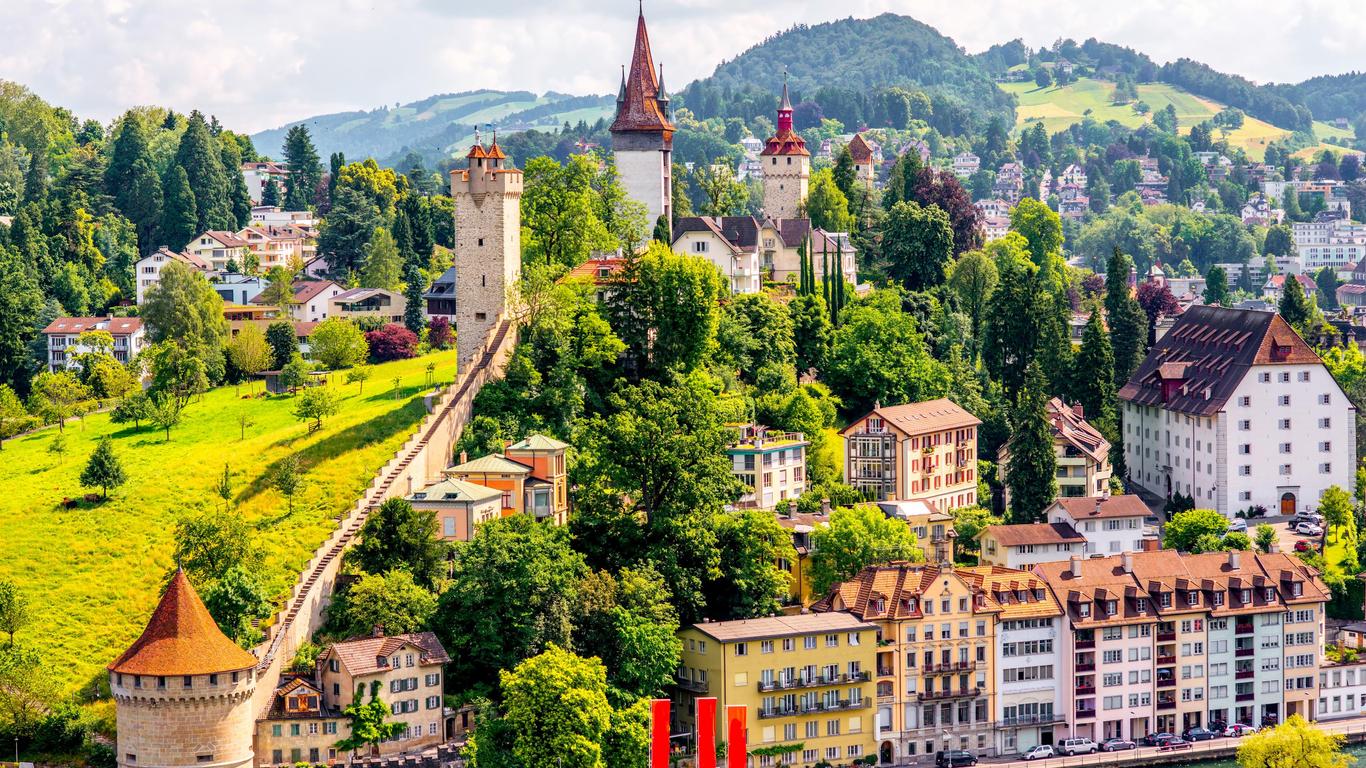
Find cheap flights to Switzerland from $170
This is the cheapest one-way flight price found by a kayak user in the last 72 hours by searching for a flight from the united states to switzerland departing on 9/17. fares are subject to change and may not be available on all flights or dates of travel. click the price to replicate the search for this deal., search hundreds of travel sites at once for deals on flights to switzerland.
Save 22% or more Compare multiple travel sites with one search.
Track prices Not ready to book? Create a price alert for when prices drop.
Filter your deals Choose cabin class, free Wi-Fi and more.
Bundle and save Save money when you bundle your flight + hotel.
Best Switzerland Flight Deals
Cheapest round-trip prices found by our users on KAYAK in the last 72 hours
Good to know
Faqs - booking switzerland flights, how to get to the city center from geneva international airport (gva).
The distance from the GVA airport to the city center is about 2.5 miles. It will take approximately 20 minutes and cost around 67 CHR ($70 USD) to take a taxi. Public transportation is preferable; in the arrivals hall, you may obtain a free pass for buses and trains. Buses take roughly 20 minutes to reach the city center, whereas trains take around six minutes.
Which facilities are available for those traveling with kids in Zurich Airport (ZRH)?
The kids' play areas are airside, at A81, A71, and B38. Zurich Airport has established a Family Services room to alleviate the hardship of flight for people with children. The space has diaper change tables, infant care supplies for sale, sleeping and nursing rooms, a kitchen with microwave and kitchenware, and a vast and colorful playroom of toys for the small ones and Playstation and video games for older kids. Childcare providers are available for assistance and support in the rooms airside at Gate A .Strollers are provided for children under four. You can get one at check-in and return it at your departure gate before flying.
What are the layover options from the U.S. to Switzerland flights?
The stopover options for flights from the U.S. to Switzerland vary depending on your airport, airline, and origin. Suppose you fly from Washington, D.C. (IAD) to Switzerland Zurich Airport. In that case, you could have stops at John F. Kennedy International Airport (JFK), Miami International Airport (MIA), Heathrow Airport (LHR), and Frankfurt Airport (FRA).
Are there lounges I can access at Zurich Airport?
Yes. If you are flying in economy class and arrive at Zurich Airport, you can visit the lounges by purchasing a day pass, paying at the door, or having an annual membership. The airport houses Aspire Lounge (Non-Schengen), located in Terminal E, on the third floor, near Gate E4. Aspire Lounge (Schengen), Dnata Skyview Lounge, Primeclass Lounge (Non-Schengen Area), and Swiss Lounge D are other lounges on the third floor.
Is a visa required to enter Switzerland?
Switzerland is a member of the European Schengen Agreement, which means that US Nationals can travel to Switzerland visa-free for up to 90 days. However, be advised that the 90 days applies to the Schengen area as a whole. As of 2021, an online ETIAS application will be required for entry. Official information can be found on the Swiss embassy’s website.
Are there nonstop flights to Switzerland?
There are international flights available to most of the airports in Switzerland; however, the only nonstop flights to Switzerland arrive in Zurich and Geneva, the country’s two busiest airports. Nonstop flights to these cities from the United States depart from several cities, including New York, Boston, Tampa, Las Vegas and Chicago.
Which city should I fly to for the best access to the Alps?
The Swiss Alps are one of the top tourist attractions in all of Switzerland, but they aren’t directly accessible from any Swiss airports. To get to the Alps, the best city to fly into is Zurich. After your flight lands in Zurich, you can transfer to the Alps’ base cities via train.
I want to visit Chillon Castle, which airport offers the easiest access?
Chillon Castle and the surrounding areas are another popular attraction for international tourists. The airport in Geneva provides the most convenient access to Chillon Castle. To get to the castle, you can catch a regional train from the city of Geneva to the city of Montreaux. Montreaux lies approximately 3mi from the castle.
How long is the flight to Switzerland?
An average nonstop flight from the United States to Switzerland takes 11h 23m, covering a distance of 4790 miles. The most popular route is New York - Zurich with an average flight time of 7h 45m.
What is the cheapest flight to Switzerland?
The cheapest ticket to Switzerland from the United States found in the last 72 hours was $380 one-way, and $390 round-trip. The most popular route is New York John F Kennedy Intl to Zurich and the cheapest round-trip airline ticket found on this route in the last 72 hours was $477.
Which airlines fly to Switzerland?
SWISS, United Airlines & Air Canada fly the most frequently from the United States to Switzerland.
What are the most popular destinations in Switzerland?
Based on KAYAK flight searches, the most popular destination is Zurich (71% of total searches to Switzerland). The next most popular destinations are Geneva (29%) and Lugano (0.3%).Searches for flights to Bern (0.0%) and to Thal (0.0%) are also popular.
How does KAYAK’s flight Price Forecast tool help me choose the right time to buy?
KAYAK’s flight Price Forecast tool uses historical data to determine whether the price for a given destination and date is likely to change within 7 days, so travelers know whether to wait or book now.
Top tips for finding cheap flights to Switzerland
- Enter your preferred departure airport and travel dates into the search form above to unlock the latest Switzerland flight deals.
- Zurich International Airport (ZRH) is Switzerland's most prominent and busiest airport. The airport, also known as Kloten, is a primary hub for the Swiss Airlines. The airline operates in Zurich and connects it to the country.
- Using charter flights, consider flying into Bern Airport (BRN) if you are heading to the Jungfrau Ski Region. If you fly into Zurich, it will take around one hour to use the train to the city center.
- If your final destination is around the French Alsace region, consider booking your flight to EuroAirport Basel Mulhouse Freiburg (BSL). It is located in southwestern Freiburg in Breisgau in Germany, southeastern Mulhouse in France, and northwest of Basel, Switzerland. France and Switzerland jointly oversee the airport's administration. Hence, choosing to fly to this airport will give you more options to choose from.
- Zurich Airport is the finest place to travel if you want to discover Switzerland. It is serviced by many international airlines, so it has a wide variety of travel options. It has excellent rail connections to major cities in the country.
- Geneva International Airport (GVA) is the primary airport serving the city of Geneva, as well as the countries of Switzerland and France. This airport has two terminals: the new, larger Terminal 1 and the seasonally used Terminal 2, which is used during the winter for select aircraft (charter or scheduled).
- You’ll have a handful of different arrival cities available when booking your flight to Switzerland. Although most of the international air traffic arrives in Geneva or Zurich, there are also flights from the United States available to the city of Basel in northwestern Switzerland and Lugano in southern Switzerland.
- Swiss Francs are the only official currency in Switzerland, but Euros are accepted in some tourist areas, hotels and railway stations. If you pay in Euros at establishments that accept them, you’ll receive change in Francs, but you’ll get a more favorable rate if you simply obtain Francs from one of the widely available ATMs.
- If you’re traveling through the surrounding countries as well as spending time in Switzerland, flying into Milan, Italy can give you access to more flights from more countries than Lugano. Milan is close to the southern border of Switzerland and gives you access to both southern Switzerland and northwestern Italy.
- For travelers looking to explore several different parts of Switzerland, purchasing a Swiss Travel Pass is a great way to save money. Switzerland has an extensive network of regional trains and buses, and the Swiss Travel pass grants tourists unlimited travel for durations of 3, 4, 8 or 15 consecutive days.
- Whether you’re heading to France after spending some time in Switzerland or the other way around, you can take a train between the two countries. Trains run frequently between Geneva and Lyon, and the total travel time can be as short as 2h.
Top 5 airlines flying to Switzerland
I'm a larger, athletic guy (6'2", 260lbs powerlifter) and I found the seats incredibly uncomfortable with minimal leg room, especially in a window seat. Now, I full understand that being smaller may change my view but even if I was 80lbs less, my legs would be the same size and I was sandwiched between my seat and the seat in front of me.
Horrible. This was not first class. This was a connecting flight whi h was late. My original flight never came. I hated the fact that delta gave me a connecting flight from New York to Orlando Florida. No meals and the television screens were not working. There wasn't even any power to charge your phones. This is NOT FIRST CLASS DELTA!!! Do better next time!
This flight was ridiculous. I had to have a connecting flight from New York to orlando Florida??? The flight left late and because it was a short flight there was no first class amenities. I had one alcohol drink. The flight crew was fine, but it sure did not feel like first class. Delta to me dropped the ball by giving me a connecting flight. By the time we got to Raleigh we would have missed the next flight. Lucky for me the flight never came so now I was stuck waiting for a later flight that came in late also.
Our flight was delayed in Atlanta. The staff could have gave us an explanation for the delay and how long it would be.
I liked the ease of checking in, luggage check in, wheel chair assistance, boarding and flight.
On my way home I had a layover. The flight from ATL to CLT was amended 5x while I was waiting. I could have driven home sooner. Overall from Dallas, Tx to Charlotte, NC I started my trip at 4:30pm, I didn’t get home until past midnight. I know things happen, but 5x to make me run back and forth in an airport from different terminals is excessive. I also upgraded to comfort + , I didn’t feel it was worth it. There was no benefit
On my way home I had a layover. The flight from ATL to CLT was amended 5x while I was waiting. I could have driven home sooner. Overall from Dallas, Tx to Charlotte, NC I started my trip at 4:30pm, I didn’t get home until past midnight. I know things happen, but 5x to make me run back and forth in an airport from different terminals is excessive.
They did a fine job. Can't wait to use Delta in the future.
There was a loud squeaky sound the whole time we were flying.
Had a broken tray in business class. Crew just shrugged it off.
Kudos to Swiss!! My wife and I thought Swiss was like flying years back: good food service, refreshments, friendly and courteous crew! We look forward to another trip to Europe next year, and it will be a priority to hopefully fly Swiss, thank you! We strongly can say from experience - the treatment (food, drink, entertainment) in service for Economy Class is unmatched!!!
So terrible. They would not rebook me for a flight until 2 days. I had to spend so much money to get my own flight. They were rude and not helpful.
Overall a good experience, the flight was on time, the crew very attentive and friendly. However the seats are too cramped, there is no space, and as soon as the person in front reclines the seat, it's literally in your face.
Bag lost. Lost bag recovery process is an unsatisfying customer experience. Because 1) bag is still lost but also 2) the process is outdated and form-heavy and 3) in our case also involved a long line.
We were very impressed with Swiss Air. The service was exceptional. Unfortunately, we had a baby behind us that screamed for hours. , It was a nightmare, though I completely understand that it was not Swiss Airs fault.
Due to one crew member not showing up to work, our flight was significantly delayed causing us to miss our connecting flight in Houston to Mississippi causing us to be delayed by more than 6 hours and missing our event all together. Very disappointing. All because ONE crew member called in sick. United did grant us a $15 meal voucher, which was a small but appreciated concession that I wasn’t able to use because I ordered my lunch and paid for it before applying the concession, and the staff said it was too late to use it. Ugh! We also had a TWO delay coming back from Mississippi, but that was on American Airlines and it was due to weather, so not their fault. Anyway, not at all impressed with United’s handling of our flight and the HUGE disappointment of missing our important family event for our 90 year old mother. All that money and all that stress and emotions for nothing. Having to wait the hour to bring an employee from LAX seemed like something that should not have happened. Why don’t you have a local back-up? Santa Ana is not a little airport in a rural area.
Flight delayed from Cape Town to Washington then got diverted to miami and in miami we had to fend for ourselves , im still trying to get to Shreveport now
delay several times and wait extra long to board. no entertainment service because there are problem for some rows. always encounter some delays for the last flight of the day.
I just wrote a text which was supposed to be for the flight from Denver to spokane not Frankfurt to Denver.
On time every leg of the journey and exceptional staff at counter, gate, and on board. I haven’t travelled in US for a long time and was genuinely surprised how pleasant this was.
Hated every minute of it. This flight should have only taken 1.5hrs but was delayed over 10hours. Now I am being told I cannot be compensated or refunded my ticket price or extra leg room, which I purchased but did not receive, because the airline is throwing the blame on the 3rd party I purchased tickets through and 3rd party putting the blame on airline. No one wants to help. They received their money and that's all they care about. Im going on 3 days of still trying to get to my final destination, had to cancel car rental, car insurance and hotel. Currently staying in airport until hotels open up. Thank you Lufthansa, Kayak, Underpricer and United for making this trip the worst ever.
The delays (5 hrs) were a comedy of errors, and the multiple safety issues encountered were very concerning.
flight delays, staff only communicating when pushed, food service lasting a grand total of 7 minutes, stuck in seat from 45mins into flight until landing
Crew was great and did their best to make us comfortable and captain came out at the beginning to announce why the flight was delayed, weather situation up ahead, and kept us updated throughout the flight.
the flight from Tampa departed with a delay. The food on board was poor, usually on international airlines alcoholic beverages are offered free of charge , but here it was for a fee, the cutlery was wooden, there were no hot drinks (tea, coffee). Unfortunately, I didn't take pictures of the portions of food, but it wouldn't have been enough for a child either.And in the future, I will try not to use the services of this airline
Just get Economy Plus for international flights, so worth it the extra room, bigger seats…
This flight is frequently delayed. The connections seemingly are more frequently delayed. I’ve missed connections as a result twice on the same route to charlotte then Charleston. Final destination arrival has been the next day, twice in a row. No pilots, no crew. Too many excuses. Unfortunately, my days with American are over.
Entertainment was okay not because anything was wrong but it is a short flight so having no wifi is annoying but understandable. Crew was outstanding as usual
It was spectacular. I had basic Economy and was given so much space and their seats lean back so far. Staff was superb, food was superb, everything was superb, Finnair is Fantastic.
Those seats were way too narrow. I had the middle seat, one person was a very skinny person and we still couldn’t avoid touching each other anytime one of us moved. The other person was larger and we were basically sitting in each others lap the entire flight. There was zero entertainment. The flight was long enough to justify tvs, but no. Gotta sit there in your infant seat and twiddle your thumbs.
The Flight attendant had an attitude and didn't allow anyone any time to prepare for landing despite being absent throughout the entire trip
Flight boarded without pilots. Sat on plane for 3 hrs. after over an hour late boarding. Plane never took off. Had to deplane near midnight. Line for rebooking was 3 hours + long. I had to leave.
The flight was great but board was a nightmare. The gate was changed 4 times during the layover period
The experience was great and much better than the flight going out. of course I was in first class but the service was excellent
Cold air blew constantly on my legs almost making me numb.
In economy and food was ok, but with limited leg space (and I was in a 2 seat configuration) it was difficult to eat with a tiny seat tray. I spilt wine on my trousers. First time on British Air (I usually fly Turkish Air) and in a 777. Heathrow was pleasant but changing terminals awkward.
Starting with the flight Cairo to London the plain was so poor no entertainment at all uncomfortable seats although it’s 5 hours long,then an American airline plain took me from London to Miami it was a bad experience the crew most of flight time not available and they asked us to help our selves for any snacks if we need. From Miami to London actually was perfect flight with a huge plain and perfect crew but from London to Cairo was horrible plain with stiff fixed seats not movable no entertainment or wi fi very poor Menu which is unacceptable for a business class
I've done hundreds of flights in my life, and this flight was one of the best I've ever taken, From beginning to end, everything went smoothly, professionally, and with a smile and friendly attitude from all employees I interacted with. The food was delicious (and free), as were the drinks. There was just a genial and effective way in the way that British Airways organized the flight -that reminded of days in the 70's, 80's, and 90's, when flying was a fun, and exciting adventure. I enjoyed and had confidence in the abilities of the flight crew, I'll be flying British Airways several more times this summer. Thank you so much for the great experience! Cheryl Olso
My baggage did not arrived with me. Took 3 days to get it after so may calls and follow up
Terrible! I missed my flight to my final destination and British airlines and American Airlines keep pointing fingers on each other’s. Nobody wants to take responsibility
Terrible. Flight was 3 hours delayed and I missed my other flight to my final destination
Overall, terrific service, accommodations, and experience. Only reason comfort was rated lower was because it was difficult to keep a comfortable sleeping position for the overnight flight, but I also had an economy seat.
Not sure if the crew were experiencing something unknown to me,but the service of passing water was non-existent.In addition,please take consideration when providing yogurt as alternative for breakfast as some of us, could be lactose intolerant.. thanks
Very cramped seats in economy, difficult to get comfortable with your legs and feet and back. The seat width is ok but I’m average size. Food is HORRIBLE. Crew is friendly. Delays and very tight connections made it tough for navigating. We would have missed our connecting flight if it wasn’t delayed too. The terminal transit was slow and normally every 10 minutes before 8pm, after 8 pm is every 30 minutes!!!!! No free wine or drinks!! Below average attitude.
Leg room was better than expected. Lavatory’s were easy to access.crew was grea!
Book Cheap Switzerland Plane Tickets
Recent round-trip flight deals, search by stops, search by airline, search by price, recent one-way flight deals, last minute flights to switzerland, last minute flight, train and bus deals, flights to switzerland, return flight deals:.
Switzerland - United States
Cabin classes:
Browse origins:.
- Flights »
- United States
Browse destinations:
- Worldwide »
- Switzerland

How to Get Around Switzerland: A Guide to Swiss Transportation
Wondering how to get around Switzerland? This guide will help you learn how to use the public transportation system and how to get around by car.
Don’t have time to read a bunch of reviews and blog posts? Here are our top picks for visiting Switzerland:
Wanderlust switzerland guide.
Need a quick day-by-day, open-and-go itinerary for Switzerland? Get my guide and let me do the work for you!
Our favorite Hotels in Switzerland
- Zurich : Baur Au Lac
- Lucerne : Burgenstock Alpine Hotel & Spa
- Zermatt: The Omnia
- Interlaken : Victoria Jungfrau Grand Hotel
- Bern : Hotel Schweiserhof
- Geneva : Swiss Luxury Apartments
- Montreaux : Eurotel Montreaux
Getting Around Switzerland
- Unlimited Train Rides : Swiss Pass
- Renting a Car : Cheap Rental Cars or Expedia Cars
Our favorite activities and tours in Switzerland
- Paragliding
- Lindt Chocolate Tour
- Lake Lucerne Cruise
How do I get around Switzerland?
There are many ways to get around Switzerland , the two main ways are using public transportation and renting a car. I’ll highlight the best way to get to each destination below. This Switzerland itinerary can easily be used with either a car or by train.
If you choose to get a rental car in Switzerland, I always recommend using this site to compare rates and cars.
If you choose to use public transportation in Switzerland, I recommend getting the Swiss Travel Pass to maximize your time and save you money. The Swiss Travel Pass offers unlimited train rides on most lines, free or discounted gondola rides, and discounts to many attractions though Switzerland.
I find that it’s especially worth buying the Swiss Travel Pass if you are planning to visit Zermatt because the expensive Gornergratt train is quite expensive, and it’s half off with the pass. If you’re comfortable riding trains and buses, I think it’s the best way to travel in Switzerland.
Where do I purchase my Swiss Travel Pass?
You can purchase your Swiss Travel Pass here . Just select the correct number of days for your Switzerland itinerary and check out. The pass begins on your selected date and runs continuously. The Swiss Travel Pass comes in. 3, 4, 6, 8, and 15 day increments.
Swiss Half Fare Card
If you’re unsure of your dates or the amount of time your Switzerland itinerary will be, it might be a good idea to purchase a Swiss Half Fare Card instead. This pass is good for one month and will offer 50% off most trains. There seems to be less of a discount on shorter journeys. I prefer to purchase the more expensive Swiss Travel Pass just for ease of use while I am in the country. But the Swiss Half Fare Card may be a better option if you are only planning on taking several long and expensive rail journeys. You can purchase the Swiss Half Fare Card here .
Renting a Car in Switzerland
If you want a little more freedom during your trip, you may want to consider renting a car in Switzerland . You’ll have the ability to reach some more off-the-beaten-path places that trains can’t reach. Driving in Switzerland is easy, especially if you’re from the US because they drive on the right side of the road.
Download the SBB App for Switzerland Transportation
SBB App – Public transportation in Switzerland is shockingly punctual, clean, fast, and efficient. The SBB app will tell you when and where to get your trains and buses to take you where you want to go. This is the most important app you’ll need in Switzerland if you’re only traveling by public transportation.
I hope this guide to Switzerland transportation will help you get around the country with ease. Be sure to check out the most beautiful places in Switzerland and our Switzerland Itinerary.
There are lots of pros and cons to renting a car in Switzerland and using public transportation. Here’s a good list
Here is a list of pros and cons for traveling Switzerland by train vs. by rental car:
Traveling by Train in Switzerland
- More scenic views out the window
- Can relax and enjoy the ride
- No need to focus on driving/navigation
- Environmentally friendly
- Arrive directly in city centers
- Less flexibility with schedule/stops
- Can be more expensive
- Limited luggage space
- More flexibility with schedule and route
- Can stop wherever you want
- Usually cheaper than train
- More privacy
- Can carry more luggage
- Less scenic views
- Have to focus on driving
- More planning required for navigation
- Have to find and pay for parking
- More environmental impact
I hope this helps you plan your trip to Switzerland!
The post How to Get Around Switzerland: A Guide to Swiss Transportation appeared first on Wanderlust Crew .
![Wondering how to get around Switzerland? This guide will help you learn how to use the public transportation system and how to get around by car. How do I get around Switzerland? There are many ways to get around Switzerland, the two main ways are using public transportation and renting a car. I’ll highlight the [...] Wondering how to get around Switzerland? This guide will help you learn how to use the public transportation system and how to get around by car. How do I get around Switzerland? There are many ways to get around Switzerland, the two main ways are using public transportation and renting a car. I’ll highlight the [...]](https://img-s-msn-com.akamaized.net/tenant/amp/entityid/AA17Mj4i.img?w=768&h=512&m=6)

How to plan a family summer trip to the Swiss Alps
Switzerland’s Jungfrau Region promises dramatic Alpine scenery, flower-flecked meadows and thrills on every summit. And with an extensive network of cable cars and rail routes, it's ideal for a 10-day stress-free family adventure.
Mother Nature pulled out all the stops in the Jungfrau region of the Bernese Alps. From waterfalls and cloud-capped peaks (including the big three: Eiger, Mönch and Jungfrau) to high pastures jangling with cowbells, cliff-hugging villages sprinkled with log chalets and Alpine railways taking you from pine to peak, this is picture-postcard Switzerland at its finest. For families, adventure awaits. Bomb down the mountains on a Trottibike scooter or thunder towards the Eiger on a zip-line. Head up high to play in the summer snow or get close to the water in glacier gorges. From villages to via ferrata, here’s how to plan a 10-day tour that takes it all in.
Days 1-3: Mürren
Begin your trip with one of the area's most spectacular rail and cable journeys, with the town of Interlaken as a starting point. Take the train to Lauterbrunnen and switch onto a gondola to Grütschalp, where a second and arguably more beautiful train ride will whisk you up to Mürren. Perched on a ridge at 1,638 metres, this high-altitude village offers knockout views of the Eiger, Mönch and Jungfrau, and its flower-strewn pastures, spruce forests and dark-timber chalets are the picture of Swiss Alpine beauty.
It's the ideal spot to ease into an active holiday. Hiking trails thread from its flanks in all directions, and a funicular glides up to Allmendhubel , where you can enjoy a meal on the mountain-facing sun terrace while kids romp among giant insects and Alpine blooms in the flower-themed adventure park. Budding botanists will love the nearby flower trail, which features 150 species of mountain flowers, from gentian to edelweiss. Alternatively, adults and older children can ramp up the adrenaline on the nearby Mürren-Gimmelwald via ferrata. A guide will help you learn the ropes, and before long you’ll be exploring a series of chalelnging suspension bridges, zip-lines and tightropes, with sky-high views of the Bernese Alps.

Devote a third day to Schilthorn, which begins with a dramatic cable-car ride above great fangs of rock to the eyrie-like summit of Schilthorn — Piz Gloria. Visited by James Bond in the 1969 film adaptation of On Her Majesty’s Secret Service , this dramatic destination enjoys views across 200 peaks all the way to Mont Blanc and the Black Forest on clear days. Enjoy the helicopter and bobsleigh simulators at Spy World , before heading down to middle station Birg for exhilarating, vertigo-inducing moments on the Skyline Walk and cliff-hugging Thrill Walk (crawl through the tunnel if you dare).
Days 3-7: Grindelwald
With sensational views of the Eiger’s imposing North Face and a lineup of 4,000-metre peaks, it’s no surprise that Grindelwald is one of Switzerland’s most popular destinations for active travellers. The first task is to pick your peak. Swing high above the meadows to 1,391-metre Pfingstegg for a mad downhill dash on the summer toboggan run or zip-line. Or opt for mountain-rimmed Männlichen, where you can enjoy nature-focused fun on the treetop path, explore the vast playground that's home to a giant wooden cow, or head out on the Lieselotte Trail, where children can search for crystals, blow into an alphorn and peek at burrowing marmots through binoculars.

On day two, make for the 2,184-metre summit of First Mountain, which has the edge for thrill-seekers. Clinging to near-vertical cliffs, the First Cliff Walk is an ideal place to begin your day’s activity, with giddy views of the Bernese Alps. From the top, you can whizz towards the Eiger on the First Flyer zip-line at speeds of up to 50mph, before tearing down the slopes back to Grindelwald by mountain cart or chunky Trottibike. Back in the valley, feel nature’s colossal force in Grindelwald’s Glacier Canyon, as you teeter across a walkable ‘spider’s web’ strung between towering rock faces polished by the waters of the Lütschine River. Daredevils can also enjoy the canyon swing , which involves a 90-metre freefall before you rip across the gorge at speeds of 75mph.
However, all of this is just laying the groundwork for a third-day trip up to 3,454-metre Jungfraujoch. From Grindelwald, hop aboard the tri-cable Eiger Express gondola for a riveting ride with views of the Eiger’s mile-high North Face. From the Eiger Glacier station at its top, switch to the Jungfrau Railway. This red train has been chugging up to the summit since 1912 and will transport you up to Europe’s highest railway station in less than 30 minutes. Here, the Sphinx observation terrace offers out-of-this-world views of the 14-mile Aletsch Glacier and the surrounding sea of 4,000-metre peaks. It’s snowy up top all year round, so dress warmly for sledding, tubing and zip-lining in the snow park, or a subzero wander through the glittering, sculpture-strewn tunnels of the Ice Palace.

Days 7-10: Meiringen (Haslital)
From Grindelwald, take a beautiful train ride via Interlaken, or a panoramic bus ride over the Grosse Scheidegg mountain pass to reach Meiringen, a pretty Alpine town in the Haslital Valley that's surrounded by dramatic activity. Top billing goes to the 120-metre-high Reichenbach Falls, which crash over forested cliffs with a roar. This is where writer Arthur Conan Doyle had fictional detective Sherlock Holmes and villainous Dr Moriarty fall over the edge in the 1893 story The Final Problem . For a less intense experience, take the funicular up and hike back down before stopping in at Patisserie Frutal for a Swiss meringue — Meiringen lays claim to fame as the 18th-century birthplace of this sweet treat.
The next day, continue your exploration of Meiringen’s surrounding cliffs and ravines. A quick train ride from town will see you reach the Aare Gorge, which carves a deep, narrow path through limestone tunnels and galleries and past a turquoise torrent of glacial water. Visit later in the day if you can, as the canyon is at its most entrancing when illuminated by summer-evening rays. Its closest rival is the waterfall-splashed Rosenlaui Gorge, where a circular trail leads through primeval forest and past chalk-slate cliffs pounded smooth by the Weissenbach River.
Finally, head north of Meiringen, to Hasliberg. This area is a family favourite, thanks to the three-mile Muggestutz Dwarf trail that runs from Mägisalp to Bidmi, where kids can dry pine cones, take on the ‘eagle swing’ and find cave treasure. Make a day of it and check out the marble run from Bidmi to Reuti, which offers 12 giant marble runs immersed in nature and a firepit for barbecues (wood is provided).

Related Topics
- FAMILY TRAVEL
- EDUCATIONAL TRAVEL
- ADVENTURE TRAVEL
You May Also Like

10 best things to do in Switzerland

Take to the waves: how to plan the ultimate family sailing holiday

Where to eat on the Swiss Riviera this winter

How to plan a trip to Bali, Indonesia

All aboard: explore Switzerland by train

AI can help you plan your next trip—if you know how to ask.

5 of the best Swiss city cycling routes
- Terms of Use
- Privacy Policy
- Your US State Privacy Rights
- Children's Online Privacy Policy
- Interest-Based Ads
- About Nielsen Measurement
- Do Not Sell or Share My Personal Information
- Nat Geo Home
- Attend a Live Event
- Book a Trip
- Inspire Your Kids
- Shop Nat Geo
- Visit the D.C. Museum
- Learn About Our Impact
- Support Our Mission
- Advertise With Us
- Customer Service
- Renew Subscription
- Manage Your Subscription
- Work at Nat Geo
- Sign Up for Our Newsletters
- Contribute to Protect the Planet
Copyright © 1996-2015 National Geographic Society Copyright © 2015-2024 National Geographic Partners, LLC. All rights reserved
- Newsletters
- Account Activating this button will toggle the display of additional content Account Sign out
My Secret to Weeks of Free Lodging in Europe
I wanted to stay in apartments or houses—but i was a brand-new college grad on a budget.
This is One Thing , a column with tips on how to live.
After I graduated from college, I knew I wanted to travel for a few months, so I secured a part-time job that could be done remotely. I didn’t want to do my work shifts from a hostel bunk bed or random cafés that stayed open late. (I’d be in Europe, thanks to an EU passport, and my gig was based in the states.) Paying for Airbnbs the entire trip would eat up way too much of my paychecks. It was kismet that just as I was starting to plan my travels, my friend sent me a video about a couple traveling the world and dog-sitting along the way, using an app called Trusted Housesitters .
As an avid dog lover, I thought it was perfect. I paid a little over $100 to make an account, then started browsing housesits around the world. I adorned my profile with pictures of me and the various dogs in my life, and applied for opportunities across the ocean. Before I had even left the United States, I had three gigs set up: I’d spend about 10 days in Scotland and Wales, then three weeks in Amsterdam.
Just like when setting up drinks through a dating app, you do have to be vigilant and pay attention for red flags when talking to potential hosts. My stay in Scotland was less than ideal for many reasons—the situation could have been easily avoided if I had listened to my gut and declined that gig. (The app does do background checks, and there’s an opportunity for both sides to leave reviews, meaning you don’t go in completely unaware.) But the other dog-sits were fantastic. One experience went so well that last fall, I returned to Amsterdam to once again to dog-sit Pretzel, a lovely Maltipoo, while her parents got married and went on their honeymoon.
Although I opted for longer sits abroad, there is also the option to just watch a furry friend stateside for a weekend. (If you do go internationally, be mindful that you might potentially need a work or tourist visa.) I just checked the app, and as I’m writing this, there are opportunities available in cities that include Austin, Atlanta, and Boulder.
Of course, you have the responsibility of taking care of someone else’s dog—you need to do some planning and can’t just leave the pet alone all day, and the owners don’t pay you. But the free accommodations feel like a fair exchange to me. I also love that many of the dog-sit locations are in more residential areas, so you’re able to experience local life in whatever city you’re in. Plus, you get to hang with a cute dog. What could be better?

IMAGES
VIDEO
COMMENTS
And here are 10 ways to make your money last longer in Switzerland. 1. Use free public transport. Take advantage of free public transport in certain cities to make your money last longer in Switzerland. If you're staying in Bern, Lucerne, Basel, Geneva or Lausanne, you get to use local public transport for free.
How to Get to Switzerland. The best way to travel to Switzerland from the United States is to fly into one of the major cities such as Geneva or Zurich. From there, you can take connecting flights to Bern, Davos, Zermatt, and Basel. Zurich is the largest city and you'll likely find the most flight options into Zurich airport.
Don't Miss Out on Student Discounts. Youth and student discounts on travel in Switzerland can help you save on transportation and activities! For example, young travelers from 16-24 can get a discount on the Swiss Travel Pass. These discounts are usually found in the "Reduced" section of ticket charts.
A single fare usually costs between 2.50-5 CHF depending on the length of time and number of zones you travel. You should consider getting a Swiss Half Fare Card. It allows you to travel by train, bus, boat, and most mountain railways at half the price for one full year. It costs 185 CHF.
In 2022, a regular SBB Half-fare card costs CHF 185 for one year. But people living outside Switzerland may purchase a 1 month Half-fare card for CHF 120. The half-fare card can pay for itself rather quickly if you travel a lot by public transportation and go up a lot of expensive mountains.
Book into a swanky Swiss hostel. Even the most modest hotels can be budget-blowing in Switzerland, but thankfully there are alternatives. Swiss youth hostels are among the swankiest in the world, and while prices aren't dead cheap, a dorm bed in the Saas-Fee Wellness Hostel 4000 (from Sfr61) or the Backpackers Lucerne (from Sfr34) is considerably less than a hotel room.
The Cost of Accommodation in Switzerland. You can visit Switzerland on a whole range of budgets, from a CHF 23 (€24) a night dorm bed in the Alps to an absolutely incredible CHF 900 (€950) a night hotel, the latter of which is the best hotel in Zurich and a haven for world-famous celebrities. In this blog post, I'm going to be focusing on ...
Here's how much my trip to Switzerland (Zurich, Bern, Geneva, and Interlaken) cost (in Swiss francs, which at the time of my visit were worth around $1.03 USD):Food: 105.75 Accommodation: 171.36 Transportation: 222.30 Metro: 17.40 Alcohol: 66.90 Attractions: 30 Total: 613.71 (or 76.71 CHF per day). Overall, I did a good job keeping my costs down, spending around $79 USD per day.
Swiss Travel Pass. If you want to travel to Switzerland for a longer time (at least 5 days) and see different places (at least 5), the best way to save up is to purchase a Swiss Travel Pass.. This Pass is available for 3, 4, 8, or 15 days.All trains, buses, boats, and public transportation in cities are included in the Pass.. You can choose between 1st and 2nd class.
As dreamy and beautiful as it is, Switzerland has frequently been flamed as an expensive country to travel to. Nevertheless, it's not to say there aren't ways to travel to Switzerland on a budget. From value-for-money travel passes to free walking tours, cheap accommodation options, and tons of attractions that offer free entry, we've come up with a list of practical tips to help you plan your ...
Check out the Swiss Railways website to get an idea of what small towns fall on the major train lines, prices for train tickets, train stations, etc. Sleep on Straw (minus the cows) 3. Cheap or Free Accommodations. Nowadays, budget travelers have so many options in finding a place to stay.
6. Get City tourism cards / city guest cards / Free Public transport / bikes. Many cities and towns throughout Switzerland offer a Guest Card for staying with them, which gives you free, or at least very discounted, rates on the local public transport as well as local attractions. We have utilised these cards in Basel, Interlaken and ...
Accommodation is expensive in Switzerland and will likely take up most of your travel budget. The cost of hotel rooms and apartments varies depending on the city, but in general, you can expect hostels to be up to 100 CHF, mid-range hotels are 100-300 CHF, and luxury hotels can be well over 1,000 CHF for a night.
I budget CHF 190 per person per day for a 2-week holiday in Switzerland. Depending on the specifics of your stay, your costs may be much lower or higher. The total budget of (rounded) CHF 5600 for Arno and me includes the following: CHF 918 for 15-day 2nd class Swiss Travel Passes;
Drink tap water. Unless otherwise posted, tap water in Switzerland is clean and safe to drink. Bring a reusable water bottle and fill it up at any tap. Pack a picnic. Before you head out for a day of adventures, stop at a grocery store and pick up bread, cheese, cold cuts, or whatever else you want for a picnic.
Saver Day Pass SBB - starting at 29 CHF. The Saver Day Pass is available at dynamic prices up to 6 months in advance. The earlier you book, the cheaper you travel. With this pass, you can travel throughout Switzerland without restrictions and use all means of public transport.
Single day travels - Super Saver, for single journeys at the lowest possible cost look for supersaver tickets online. This requires a bit of flexibility but you can pick up some amazing deals like a day pass for 23.- with unlimited access to train, boat, bus, and some cable cars. Swiss Half fare 50% on everything.
15 Best Budget Hikes in Switzerland. The most affordable mountain hikes in Switzerland, including tourist regions like Zermatt and Interlaken. Prices range from CHF 12-40/adult. In some cases, these fares are even cheaper with overnight guest cards, travel passes, and travel cards like SBB Half-fare.
Accommodation Budget in Switzerland Average Daily Costs. Calculated from travelers like you. The average price paid for one person for accommodation in Switzerland is $167 (Sfr153). For two people sharing a typical double-occupancy hotel room, the average price paid for a hotel room in Switzerland is $334 (Sfr305).
14 Days - Switzerland Itinerary. Our suggestion for a 14 days Switzerland itinerary on a budget would be; Extend your stay at the beginning in Valais for one more night, (8 nights) and then add the part of the 10 day itinerary (3 nights around Bönigen) plus add 3 more nights in or around Lucerne for the end.
Here are some sample one-way fares (double these for round trip). Zürich to Luzern = CHF 25. Luzern to Interlaken = CHF 33. Zürich to Zermatt = CHF 125. Zermatt to Geneva = CHF 102. Children 6-16 pay half-fare. Children under 6 ride for free. Seniors and students do not get a discount on full fare train tickets.
Supersaver tickets - buy your train ticket in advance. A good way to save money on train tickets in Switzerland is to buy them in advance! Supersaver tickets are a number of tickets made available to travelers at low prices (up to 70% off) up to 2 months before the date of travel. The earlier you book, the cheaper it is!
The cheapest ticket to Switzerland from the United States found in the last 72 hours was $380 one-way, and $390 round-trip. ... For travelers looking to explore several different parts of Switzerland, purchasing a Swiss Travel Pass is a great way to save money. Switzerland has an extensive network of regional trains and buses, and the Swiss ...
There are many ways to get around Switzerland, the two main ways are using public transportation and renting a car. I'll highlight the best way to get to each destination below. This Switzerland ...
Days 1-3: Mürren. Begin your trip with one of the area's most spectacular rail and cable journeys, with the town of Interlaken as a starting point. Take the train to Lauterbrunnen and switch onto ...
Leave no rewards on the table. Use cash back. If you have a cash back credit card, use those extra funds to lower your travel budget. Book flights and hotels early. To find cheap places to travel ...
It was kismet that just as I was starting to plan my travels, my friend sent me a video about a couple traveling the world and dog-sitting along the way, using an app called Trusted Housesitters ...